


Catherine Haughney, editor of Reader’s Digest, welcomes you to the November issue
Tell us what you think of this issue: theeditor@readersdigest.co.uk
Like us on Facebook: facebook.com/readersdigestuk
Follow us on twitter: twitter.com/rdigest




Catherine Haughney, editor of Reader’s Digest, welcomes you to the November issue
Tell us what you think of this issue: theeditor@readersdigest.co.uk
Like us on Facebook: facebook.com/readersdigestuk
Follow us on twitter: twitter.com/rdigest

“Despite
“Her

“Are players the only ones responsible for the erosion of respect for referees and umpires?” asks journalist and commentator Vic Marks. “Or do broadcasters bear some responsibility as well?” p102

“Behind the violence and chaos of the headlines, we must never forget the creativity warmth and humour of the Arab people, often ignored by the media,” say authors

John McHugo and Diana Darke. p106

Effat Mahbaz spent seven agonising years in an Iranian prison. Read her story on p49

We may not often think of Rowland Hill these days, but what an influence he has had on all our lives. Mr Hill invented the postage stamp (the first Penny Black was issued on May 6, 1840) and thereby caused a revolution in the way people communicated with each other. Sadly, with the rise of email and text messages not many of us write letters nowadays, as Simon Garfield examines in his new book To the Letter. We have an extract from it on p144—it’s a fascinating angle on social history.
Have you ever wondered how you would cope if you found yourself in extraordinary circumstances? On p44 we talk to three people whose lives dramatically and unexpectedly turned upside down. I found their impressive stories of survival very moving, and I hope you will too.



Send us your stories, jokes and letters—if we publish, we pay!
£50 for the star letter and £30 for regular letters.

Email readersletters@readersdigest. co.uk or write to Readers’ Letters, Reader’s Digest, 57 Broadwick Street, London W1F 9QS £50 for the true stories, anecdotes, jokes in Laugh! and You Couldn’t Make It Up…, and contributions to end-of-article fillers, Travel and Gardening. Email excerpts@ readersdigest.co.uk or write to Excerpts, Reader’s Digest, 57 Broadwick Street, London W1F 9QS
SubScribe!

Visit readersdigest.co.uk or write to Reader’s Digest, PO Box 444, Douglas, Isle of Man IM99 3ZF.
UK: £45.48 a year. Republic of Ireland: €61.20 a year. Europe: £50 a year. Rest of the world: £60 a year. Prices include delivery. For Gift Subscriptions contact Customer Services below
cuStomer ServiceS talking magazineS
Contact Customer Services for renewals, gifts, address changes, payments, account information and all other enquiries. Phone: 0871 351 1000 (Calls from a BT landline will cost 10p a minute. Call costs from other providers may vary.) Email: customer_ service@readersdigest.co.uk
Minicom: 0870 600 1153.
twitter.com/rdigest
Reader’s Digest is available in a talking edition for blind and partially sighted people for £16. For details, phone: 01435 866 102; email: info@ tnauk.org.uk, website: tnauk.org.uk.
Ensure submissions are not previously published. Include your name, email, address and daytime phone number with all correspondence. We may edit letters and use them in all print and electronic media. Contributions used become world copyright of Vivat Direct Ltd (t/a Reader’s Digest).
We cannot acknowledge or return unpublished items or unsolicited article-length manuscripts. Do not send SAEs. Articlelength stories, poetry and cartoons are not requested.
facebook.com/readersdigestukReadingTheDigest








Beat the winter Blues Do those long summer days already seem like a distant memory? Many people feel down at this time of year when sunlight is in short supply, but there are ways you can brighten your mood. go to readersdigest.co. uk/magazine and follow our easy tips on how to lift your spirits.
check out our fabulous apps, too! go to the App Store, iTunes music store, google Play Store and Amazon to download our magazine apps onto your iPad, Kindle or tablet.














£30 foR eaCh pubLIsheD LetteR, £50 foR the LetteR of the Month! see p4 foR MoRe DetaILs


Am I the only person who gets annoyed when people exaggerate conditions? I’m thinking of children claiming they’ve broken their leg when they’ve twisted their ankle, the stereotype about men diagnosing a cold as flu, or the term “depression” being used by those who are feeling a bit sad.
Perhaps the most annoying is when people claim to be suffering from obsessive-compulsive disorder (OCD). In your interview, Martin Clunes says, “I’m quite OCD. I like things to be lined up neatly.” But for compulsive behaviour to be a symptom of OCD, the person must feel compelled to carry out said behaviour to avoid, or in response to, uncontrollable thoughts. If the person isn’t suffering from these thoughts, they don’t have OCD!
David Wilks, West Yorkshire
I’d like to point out Andrew Lamberty’s two contradictory statements in “If I Ruled the World”: “I’d ban monotheism” and “implement pantheism, a tolerance and understanding of all religions”.
Surely tolerance of religions wouldn’t lead to the banning of a belief in one God? He also stated that he’d make one unbreakable commandment: treat others as you’d like to be treated yourself. But, in fact, this is already in the Bible— Matthew, chapter 7, verse 12. Ruth McIlveen, Lisburn
Why only ask famous people to nominate “Our New British Icons”? I think it should be put to the public. Personally, I’d vote for classicist, author and TV presenter Mary Beard. She offers an intelligent and humorous response to critics who berate her for refusing to conform to the glossy image of female presenters. She appears before us uncoiffured, adorned only by her knowledge and enthusiasm.
Carole Mooney, Manchester

alicia audrey @_aliciaaudrey
Now reading reader’s digest for the first time in ages, and I think I may have to subscribe.

I thought David Beckham was flattered by the comparison with Stanley Matthews and George Best. Speaking as someone who saw both those great footballers, I feel their skills put them in a higher class than Beckham (still a fine player and sportsman). Since, as David Kynaston rightly points out, his celebrity status transcends his football, why has he become an icon?
peter stephenson, east Yorkshire
I’d nominate David Attenborough as the ultimate British icon. His voice has been with us for over 60 years, and the intelligence, energy and knowledge he brings to every programme surely makes him a contender. Why not have a poll so that readers could nominate their choice?
susie Kearley, buckinghamshire
RD: Sir David Attenborough did top one of our reader polls—as our most trusted Briton. Watch this space for more polls.
I was delighted to read in “This Won’t Hurt a Bit” that breastscreening will be less painful and embarrassing in the next five
years, with the introduction of a radar breast-imaging system. I realise that it’s important not to miss screening appointments, but I dread the methods doctors use at the moment.
Joanne aitch, Wirral
David Bennet says in “Over to You” (September) that it’d be dreadful to have exorcisms instead of antibiotics. But while antibiotics have their uses, there are more things on earth than we can effectively measure with science. I’m a vicar, but I also used to be a nurse, and I’ve seen the effects of belief on health from both sides of the fence. So don’t throw the baby out with the bathwater.
Rev Karen Marshall, Leeds
not up with the lark
My initial reaction to James Brown’s “Reasons to Be Cheerful, Part 34” was that I couldn’t agree less—five years of getting up at 4.30am every Monday to drive 130 miles to work has given me an aversion to getting up early.
“there are More things on earth than we can Measure with science”
But while I won’t be adopting James’s dawn rising each day, I’ve decided to keep an eye on the weather forecast and get up early for a cycle ride on the fine days. Given the British climate, that should ensure I don’t miss out on too much sleep!
Lynne smith, staffordshire









Author and BBC4 Review
Show critic Natalie Haynes on the new releases
Saving Mr Banks Mary Poppins, the ultimate English nanny, was not the creation of an English writer. P L Travers, who wrote the original books, was Australian (though she’s almost given honorary Englishwoman status in this film, as she’s played by Emma Thompson).
Walt Disney (Tom Hanks) tried to persuade her to hand over her precious characters for his planned feature film.
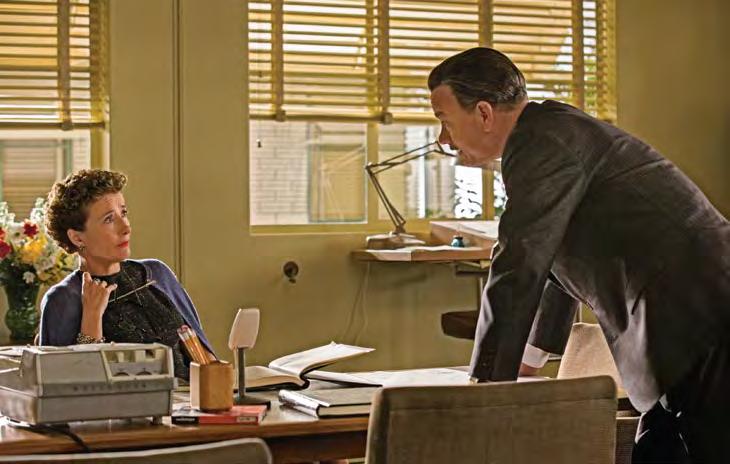
Saving Mr Banks (a name inspired by the financially prudent father in the stories) focuses on two weeks Travers spent in Los Angeles, as

There’s no suspense in how this will turn out: Mary Poppins is a classic family movie, garnering an Oscar for Julie Andrews and a lifetime devotion to Dick Van Dyke for me. But I can honestly say I’ve been looking forward to this all year: a behind-thescenes insight into the Poppins phenomenon, with a cast including Paul Giamatti and Colin Farrell.
a d ar your short, sharp guide to novem ber ►
Martin Sixsmith’s 2009 book
The Lost Child of Philomena Lee charted his remarkable quest with the titular Irish pensioner to find out what had happened to her son, 50 years after he was taken from her by nuns.

Searching for the truth: Judi Dench and Steve Coogan
Judi Dench’s performance (see our interview on p30) in this film account of the unlikely partnership is predictably excellent. She infuses Philomena with huge warmth and dignity, and captures both humour and humanity in equal measure. Her co-star is Steve Coogan (who also co-wrote the script) as Martin: an awkward man with none of Philomena’s natural charm, but a burning desire to uncover the truth. Stephen Frears directs with the same lovely clarity he brought to The Queen British cinema at its best.

reader radar
Stacey Murray, 44, lawyer and film producer

Pacific Rim
Giant robots
battle giant monsters while Idris Elba cancels the apocalypse. Silly fun from Guillermo del Toro.

Despicable Me 2
Gru (Steve Carell) has retired from a lifetime’s supervillainy to be a dad. But the Anti-Villain League needs his help (and his minions).
Watching: Peaky Blinders (BBC2)
The story of a notorious Brummie gang, just after the Great War. Cillian Murphy is mesmerising.
Reading: Gone Girl by Gillian Flynn I usually read non-fiction, but everyone kept going on about this. Genuinely compelling. I can’t wait for the film.
Online: travelzoo.com Travel is my hobby and I spend far too much time on this, planning holidays and looking for deals.
I think I fancy Iceland next.
Listening: AM by Arctic Monkeys
Takes on board R&B and hip-hop influences and shows they’ve got the depth to go the distance.


BBC 6
Music’s Stuart Maconie’s pick of the recent releases
Reflektor by Arcade Fire
Think a college-rock take on Station to Station-era Bowie
The Clash Hits
Back Think…the definitive punk act. That’s it really If the enormous and compendious Sound System remastering box set is beyond your patience or your pocket, this may satisfy any current Clash cravings. It’s a compilation built around a set list drawn up by Joe Strummer for a 1982 Brixton gig, and gives a good, fiery snapshot of a brief but brilliant career—thankfully avoiding the awful, deflating Cut the Crap.


Described variously by band members as “a mash-up of Studio 54 and Haitian voodoo” and “a disco band in a weird old nightclub from a country nobody’s ever heard of”, Arcade Fire’s fourth album (pictured below) is their oddest and their best, eschewing the sometimes sanctimonious air of pulpit rock that can surround them for the heady whiff of nightclubs and dissolution. Long-time champion David Bowie was apparently so taken with the title track that he threatened to steal it, and you can see why; it’s a nervy dance groove that recalls his glory days.
Tookah by Emilíana Torrini
A Björk album that won’t frighten the children Since her early, lovely, melancholy collections Fisherman’s Woman and Me and Armini, this Icelandic singer (of Italian parentage) has worked with Kylie Minogue and you can hear some of that sensual warmth in her latest album. Long-time fans needn’t worry though; there’s a chill of Nordic darkness even in her sunniest moments and a hint of past beauties, such as “Beggar’s Prayer”. But the palette is wider and stranger, which is all to the good.


Technology expert, BBC 5 Live presenter and Answer Me This! podcaster
Olly Mann reveals the latest must-haves
also on our radar…
November 1–30
Movember
November 3
London to Brighton
Veteran Car Run
November 3–4
Diwali—
Hindu Festival of Light
November 13
Robert Louis
Stevenson day, various venues, Edinburgh
November 27
World Cheese
Awards, NEC, Birmingham
Nokia Lumia 1020, £549.99 (free on contract) Windows Phone has hardly set the world alight, but a growing fanbase does admire the system’s simplicity, integration with Microsoft Office and those funky live tiles (little slots on the main screen for things like Facebook updates and photos). Nokia are refining their niche further still, targeting their latest smartphone squarely at photographers. Packing an impressive 41 megapixel camera, it comes preloaded with Instagramesque filters and takes snaps so rich, deep and colourful you can leave your pocket camera at home, if not your top-end one.


Bose QuietComfort 20 headphones, £259
In-ear headphones can snap easily, so £259 seems an absurd outlay. But these are the best noisecancelling headphones I’ve ever tested. The tiny on-board mics analyse background sounds (your partner watching TV, the rumble of a plane) and magically filter them out so music is crystal clear.
The only snag is that the control module is the size of a credit card and located on the cord, so you’ve got to tolerate it dangling about.
and check out…
BACtrack iPhone
Breathalyser, £149.99
Worried you may be over the limit? There’s an app for that. This gives a professionalgrade reading of your bloodalcohol content on your iPhone.

Griffin PowerDock 5, £69.99
Charging cables scattered about your home? Streamline with this hub, which can charge up to five USBpowered tablets and phones simultaneously.



ESPNcricinfo cricket blogger, broadcaster and stand-up comedian
Andy Zaltzman previews the best of the month’s action
Breeders’ Cup horse racing, Los Angeles, November 1–2
All is at stake for the world’s leading horsies in the big-bucks end-of-season showdown (where race wins are worth up to £3m). They know a good performance will probably lead to them being put out to stud, and a passport to a lifetime of free grass and casual sex.
Rugby League World Cup Final, Old Trafford, November 30
The World Cup has been a problematic tournament for rugby league, because only three countries play the sport to a potentially winning standard. Until England, Australia and New Zealand collectively conquer the rest of the planet, “World Cup” will remain a distant pipe dream rather than a statement of fact.

Nevertheless, the final stages should be thrilling. Rugby league can be a sport of raw power, spectacular skill
and almost unfathomable aerobic fitness, and the Australians— unbeaten since losing the 2010 Four Nations final to the Kiwis— have an irritating tendency to be mesmerically masterful.
The Ashes, 1st Test, Brisbane, Australia, November 21–25
The short-awaited rematch between Test cricket’s oldest adversaries begins with both teams mildly confused after England’s 3–0 win in the summer series (pictured left), which Alastair Cook’s men almost won 4–0, but could conceivably (at an admittedly muscle-twanging stretch) have lost 3–1.
The days when trying to beat Australia on their own turf was a task akin to trying to beat Michelangelo in a Painting
Nudey Men on a Chapel Ceiling Competition are long gone. Conditions should suit England’s batting line-up, particularly against a Baggy Green bowling attack that’s been picking up injuries like Silvio Berlusconi picks up court cases. n
¶ i did a course on teaching french in primary schools a few years ago. Some words just refused to stick in my brain, so I wrote them on Post-it notes dotted around the house.
Pamplemousse (grapefruit) was one such word, so I wrote it on my shopping list as an extra reminder. On my return from school the next day, my husband greeted me with a self-satisfied grin—he’d done the shopping for me and had got everything in spite of my bad handwriting.
I checked the bags; it was all there except the grapefruit. Instead, there was an aerosol of my hair-volumising mousse in its purple can.
“See,” said my husband proudly, “I even got your purple mousse!”
Ronella McGrath, Aberlour

“of course, mediation can help in neighbourhood disputes, but nothing succeeds like a drone strike”
¶ I asked my wife to help me put up a small cupboard in my daughter’s new house. Having drilled the first of six holes and fitted one screw, I needed to align the other five holes.
I balanced the cupboard and, with my pencil ready, asked my wife to put the spirit level on the cupboard and check the level. She did so and reported that it wasn’t quite straight.
“Give it a couple of taps and check again,” I replied.
She responded by giving the spirit level two taps, putting it back on the same spot and saying, “No, it hasn’t changed.”
Unable to move, I struggled to hold the cupboard up while silently crying with laughter. But we did eventually get it level.
Norman Winter, Wiltshire
¶ My son was watching our neighbour tend his vegetable patch and asked him what he put on his rhubarb.
“Usually horse manure,” our neighbour said.
“We have custard on ours,” my son replied, looking puzzled.
Anna Hammett, Cheshire
¶ When leaving a large stationery store one day, I held the door open for a tall, elegant lady and her small son.
“Go and find your dad,” she said to the boy, who immediately
rushed into the store, shouting, “Dad, dad, dad!” at the top of his voice.
Hardly smiling, she turned to me and said, “He’s so much cheaper than a mobile-phone call.”
Michael Collins, Watford
¶ Some friends were on holiday in Spain, visiting a cathedral with their young daughter. At one point they lost track of her, but then they heard a familiar voice in the distance singing, “Happy birthday to you!”
When they discovered her, they found that she’d lit all the votive candles and put them in the stand.
Edwin Self, Sheffield
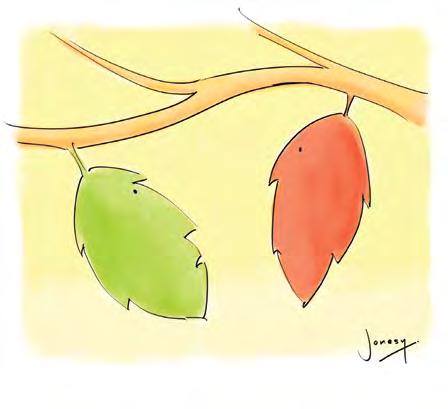
“are you oK? you’ve gone a funny colour…”
¶ With the exhaust on my car sounding louder than a jumbojet engine, I parked up on the garage forecourt.
As I got out, an almighty din started up from the young lad’s car parked next to mine. Looking amused, his father shouted through the open car window,
¶ my daughter, sisterin-law and their husbands went on a short break to Cornwall recently. While exploring the area’s coves and beaches, my son-inlaw suggested they visit
Win £50 for your true, funny stories. email excerpts@ readers digest.co.uk or go to facebook. com/readers digestuk
“He’s just paid a fortune to get his exhaust sounding like yours!”
Christine Miller, Bolton
¶ While on a visit to my aunt and uncle, my cousin asked me to take a look at his broken computer. I examined it and said I needed to wipe the hard drive clean to fix it.
My aunt promptly offered me an anti-static duster.
Karen Baker, Surrey
the place where Doc Martin was made.
After a few minutes and a lot of fidgeting, my sister-in-law was asked if there was anything the matter. After a few
seconds’ silence, she replied, “Yes—you’ve got all these beautiful places to see, so why on earth would you want to visit a boot factory!”
Gaynor Ackford, Pontypridd


If you spit blood when you brush your teeth, it could be an early sign of gum disease, a leading cause of tooth loss. So, if you spit blood in the sink when you brush your teeth, try Corsodyl Mint Mouthwash. Nothing is more effective at treating gum disease.* Find out more at www.corsodyl.co.uk
CLINICALLY PROVEN. FOR PEOPLE WHO SPIT BLOOD WHEN THEY BRUSH THEIR TEETH.

*Over the counter medicines only. Corsodyl Mint Mouthwash contains chlorhexidine digluconate. Bleeding gums can be a sign of gum disease and not treating may lead to tooth loss. Always read the label. CORSODYL is a registered trade mark of the GlaxoSmithKline group of companies.
Learn your mix-and-mingling vocabulary
Kindness Day UK aims to encourage people to practise kindness and to “pass it on” to others. In a world where the rules of social engagement are shifting from face-to-face to mouse-to-mouse, can you express your goodwill in the new language of social harmony? Answer A, B or C below to find out.

1 diffident adj
A argumentative B shy
C unmatched
2 comity n
A social harmony B funny misunderstanding C lack of respect
3 interlocutor n
A meddler B person one is conversing with C escort
4 gregarious adj
A a little tipsy B fond of company C markedly rude
5 audacity n
A long-windedness B good listening skills C boldness
6 accost v
A to aggressively approach
B offer to pay C decline to join
7 propriety n
A home of a host B good social form C tendency to gossip
8 fulsome adj
A broad-minded
B physically attractive
C excessively flattering
9 confabulate v
A to chat B get things
backward C greet with a hug
10 brusque adj
A discourteously blunt B clownish C full of questions
11 decorum n
A high praise B dignified behaviour or speech
C showy jewellery or make-up
12 unctuous adj (ungk-shous)
A avoiding eye contact
B on tenterhooks
C smug
13 urbane adj
A suave and polished
B known by everyone
C pertinent to the subject
14 malapert adj
A socially awkward B bold and saucy C disappointed
15 genteel adj
A polite B macho C timid
Developed from its feminine counterpart
bridezilla, groomzilla is used to denote grooms who are becoming increasingly involved in their wedding plans.
RD Rating: Useful? 6/10 Likeable? 4/10
9–11 getting there
12–13 impressive
14–15 word-power wizard!
1 diffident B shy. “I’d hardly call Sue diffident—she’s always the centre of attention.” Latin diffidere (fail to trust).
2 comity A social harmony. “As the food fight intensified, Millie realised all comity was lost.” Latin comis (courteous).
3 interlocutor B person one is conversing with. “The professor gave other interlocutors time to talk.” Latin inter (between) and loqui (speak).
4 gregarious B fond of company. “Dad is so gregarious, he hugs strangers.” Latin gregarius (belonging to a flock).
5 audacity C boldness. “Did you hear the gossip that Eli had the audacity to repeat?” Latin audax (bold).
6 accost A aggressively approach. “Emma can’t walk across the room without someone accosting her.” Latin ad (to) and costa (rib, side).
7 propriety B good social form. “With spaghetti, propriety dictates you use a fork.” Latin proprius (one’s own).
Why humour?




Ancient philosophers believed that four body fluids—blood, phlegm, choler (yellow bile) and melancholy (black bile)—held the secret to a person’s character. The mix of these fluids, or humours, had a particular temperamental effect, making a person sanguine, choleric, melancholic or phlegmatic. “Humour”, originally defined as the oddness of these traits, came to describe those who created laughter at life’s oddities.
8 fulsome—C excessively flattering. “John was fulsome in his praise.” Middle English fulsom (abundant).
9 confabulate A chat. “Luca wants to confabulate about the new office.” Latin confabulari (chat together).
10 brusque—A discourteously blunt. “Alice winced at the coach’s brusque advice.” Italian brusco (sour).
11 decorum B dignified behaviour. “In
Play WP online: go to readersdigest. co.uk/wordpower
a show of decorum, David called for a toast.” Latin decorus (seemly).
12 unctuous C smug. “Don’t trust a thing that unctuous sneak says.” Latin unguere (anoint).
13 urbane A suave and polished. “Cary’s urbane persona is obvious.” Latin urbanus (of the city).
14 malapert—B bold and saucy. “Jen gave Steve a wink in a malapert manner.” Old French mal (badly) and apert (bold).
15 genteel A polite. “Clare had to remind the twins to be genteel around their grandparents.” French gentil (well born). n




Intergalactic traveller Doctor Who is a Time Lord best known for his battles with the Daleks and flying round in an old police box. He’s had 11 different incarnations (soon to be 12) and on November 23 he celebrates his 50th anniversary with the one-off special The Day of the Doctor on BBC1.
I’d do things very differently from the Daleks. They tried to rule the world a long time ago (well, I say a long time ago, it was a long time ago for me, but it hasn’t happened yet for you. But don’t worry, I’ll have stopped them. I mean I’ve stopped them already but not yet, if you see what I mean).
They really are a bunch of rotters, the Daleks. When they were briefly in charge, they shoved everybody (everybody who was left after they’d done lots of exterminating) down mines to remove the Earth’s magnetic core. Now, if I ruled the world I’d definitely not do that. No shoving down mines, no exterminating, no removing magnetic cores. Yes, I’d ban all three, paperwork permitting.
I’d make Earth a much less attractive place to invade. Your trouble, you see, is that your planet sits there all blue and green and pretty and jam-packed with tasty minerals, and then you act all surprised and go all screamy when people land on you and try and take you over or blow you to bits because you’ve annoyed them in some way.
Think about it like this—you’ve never heard of anybody invading Mars, have you? So what I’d do is paint the world a different colour, a sort of magnolia beigey grey, and get everybody to pretend they’re not in whenever evil aliens are passing the general area.
I’d make the wearing of bow ties compulsory. Everybody knows they’re cool. People on Earth would be generally happier and much classier if forced to sport them, and they’d stop getting so cross with each other, because they’d be too impressed by each others’ bow ties. People would nod to each other with respect. You can’t go wrong with a bow tie.
I would add an item to the five-a-day rule. That item would be one biscuit. A little biscuit or a big biscuit, your choice, I’m staying out of that. Plus, it can be any

sort of biscuit because all types of biscuit are delicious in some way.
Biscuits are a magnificent treat and one of the best inventions your planet has ever come up with. In fact—and I don’t want to belittle the internal combustion engine, the internet or crisps—it is the best thing you’ve ever come up with.

“Biscuits are a magnificent treat and one of the best inventions your planet has ever come up with”
You don’t pay enough thought to your fabulous biscuits. So, yes, I’d introduce a special “biscuit moment” every day, to unite the world around humanity’s greatest achievement.
I’d give out free money. One thing I’ve noticed about humans over the years is that you get upset when you don’t think you have enough cash. I don’t really understand money as I’ve never had much use for it, but I think under my glorious rule I’d cheer you all up by giving you each a million pounds, which I think is a lot, isn’t it? If it’s not, two million pounds. I don’t think anything could possibly go wrong with that plan.
I’d abdicate as soon as possible. I’ve been offered the chance to rule the world on several occasions. My deadliest enemy, the Master, was always banging on about it and promising me a share. But, in truth,
it’s never especially appealed. For a start, there’s all the ruling. You’d have to go around ruling everybody and ruling things in and ruling things out. You’d have to lock up people who broke your rules and that would mean lots of filling in forms and hanging about waiting and boring stuff like that. It would all take up lots of time that would be better spent doing what you normally liked doing before you started ruling anything.
I’d prevent anyone who really wanted to rule the world from doing so. I’ve noticed that most of the luminaries who appear in this section of Reader’s Digest leap straight in with their improving schemes and genius plans. They’re so suspiciously keen—almost as if they’ve got it all worked out and have already been preparing to put their power-mad schemes into terrifying action! You see, I’ve had a lot of trouble over the past few centuries with people wanting to rule the world. Often they won’t stop at just one world—oh no, that’s not enough, because really they want to rule the universe. I’m looking at you, Kate Humble. ■
As told to Doctor Who scriptwriter Gareth Roberts
A quiz with a cruel element of chance is the perfect way to
Many years ago, I was driving round the deserted Peruvian town of Pisco. It was late at night on my birthday, and my mate and I refused to accept that nothing was going on. Our friends dropped us off and the two of us stood still and listened.
Something had to be happening. Then we heard it—a door opened and a blast of packed pub echoed round the town. Sure enough, right in front of our eyes was a bar behind darkened doors. It was rammed with people going mental to the Rolling Stones on the jukebox, passing round huge jugs of the local drink, Pisco Sour. We didn’t get home until dawn.
historic place on a hill that used to be an island, nestled between Hastings and Rye in East Sussex and looking down onto the English Channel. Amazingly, the streets are visitor-coach free, although you can see couples tramping round the graveyard looking for Spike Milligan’s headstone with the immortal lines “I told you I was ill” (in Gaelic).
At one point, every bottle of wine that

entered the UK legally came through Winchelsea. At another point, I’d have tried to drink most of that. Nowadays, its wine cellars are mostly toured by visitors, and I’m on the lime and soda.
It was a bit like that when my girlfriend and I discovered the quiz in the New Inn, Winchelsea, recently. If you don’t know it, Winchelsea is an almost perfectly
The village pub, however, has come up with an innovative evening to draw people in. I’ve hosted a few quizzes, so I know what I’m talking about here—I’ve given away masses of brilliant prizes,
liven up a week night, says
staged plastic sword fights for tiebreakers and been pelted by conkers from an irate team dressed as pirates (who thought they’d won a watch because the conkers were in a TAG Heuer bag).
The slightly older age of the audience demands a different pace at the New Inn, but the host realises that many of the crowd are hooked on TV game shows and has slipped in some real tension-builders,
as well as offering a modest free meal while the marking is going on. It’s a clever way to fill a pub that was empty on weekday nights not long ago. The questions are general knowledge, news and pictures, but also include a guesstimate round (the number of Paris Metro stations or how many episodes there were of Prisoner: Cell Block H) and an Our Survey Says round, based on Family Fortunes.
James Brown ►

There’s also a great round designed to disrupt the fortunes of any know-it-all favourites (all quizzes have them). You have to guess the answer and mark it jack, queen or king. The host draws a card next to each answer—if you have the correct answer and the right card, you get five points against just one for a correct answer. This knocks the scoring all over the place.
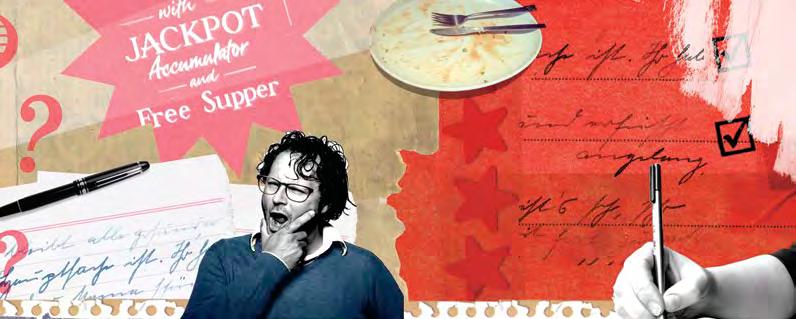
The quiz ends with a solo round, which I’m ready to answer. The host is holding five envelopes—I can go for a prize of £85 or take £20 to walk away. My son has worked out it’s £5 each for the four of us. “Take the £20!” he shouts.
“You don’t have much faith in your dad,” says the host.
“£5 is a lot of money for a kid,” my son tells me later.
decide to answer the question. The pub is silent
Two weeks ago, at this point, a man took £450 prize money for identifying Portugal as the country the Romans called Lusitania. That’s £450 for getting a question right in a pub quiz!
I decide to answer the question. The pub is silent. The host places the question down in front of me so only I can see it: “The English writer and raconteur Denis Charles Pratt, born in 1908, is better known by what name?”
There’s no murmur that usually occurs when people whisper the answer to each other. I don’t know the answer. The only raconteur I can think of is Peter Ustinov, I
who I think was probably half Russian. Ustinov is wrong. The host throws the question open to the pub. “It’s Quentin Crisp!” comes a voice behind me.
I sheepishly return to my seat, deflated but entertained, and finish the free meal of spaghetti Bolognese, adrenalin still running from Britain’s most tensionpacked country pub quiz. n
James, founder of Loaded magazine, now edits Sabotage Times—an online magazine with the motto: “We can’t concentrate, why should you?” Follow James on Twitter @jamesjamesbrown
This poignant tale was one of thousands submitted to last year’s 100-Word Story Competition. We’ll be featuring a commended story in the magazine every month. See p68 for details of this year’s contest.

Submitted by Alicia Povey, Buckinghamshire
I don’t remember him falling. I just remember not letting go. I held him tight, so tight. I wept; tears cascaded down my cheeks like an eternal stream. “Wake up,” I pleaded, again and again. “Please.” Laying my head on his chest I listened; every beat a small reprise, every pause a silent agony. I don’t remember the panic consuming those around me. I just held him, held him with all my strength, willing his heart to beat as strongly as mine. I twined my shaking fingers around his. I felt the beat grow fainter. “Please,” I whispered desperately. “Please.”
Alicia says: “My idea for this story comes from the fact that everybody worries about losing someone they love, but no one knows how this would really affect them until it happens. I tried to reflect the helplessness a person feels at such a moment. All you want to do is to help, but if there’s nothing you can do, all you can do is hope. Hope can be the thing you hold on to the longest. This story was one of the first I’ve written, and I’m ecstatic that it’s been recognised like this.”
Alicia will receive a cheque for £50

oneWIN of 10 £50 M&S vouchers!visitco.uk/bupareadersdigest.
If you’re on your own – or have concerns about a loved one living alone as the days get shorter, darker and colder – know that help is at hand if you need a little extra support
Bupa’s care homes, and Royal Voluntary Service – a national charity o ering practical help to older people – have put together valuable strategies to get you through winter with flying colours. Their “Get Ready for Winter” leaflet has top tips to help you stay well, and options to consider, if you need extra help – so you can continue to live at home.
• Health protection: Have your flu jab. Keep moving – exercise regularly.
• Be prepared: In case of poor weather, stock up on basics. Keep emergency numbers by the phone.
• Keep warm: Get your central heating system checked. Wear warm clothing: go for layers.
• Eat well: Enjoy a balanced diet. Bupa has developed simple recipe ideas to help safeguard winter health.
• Stay in touch: Meet up with friends; keep neighbours’ phone numbers to hand.
Royal Voluntary Service o ers a range of services to keep people well in their own homes: volunteers can provide transport, help with shopping, social networks or just pop in for a chat.
Or for those who need a little extra help, Bupa’s care homes o er flexible short-term care breaks of up to four weeks – ideal whether you just want company, or have a condition that worsens in winter and need care to get you back on your feet and home again.
Request the FREE “Get Ready for Winter” leaflet and/or free recipe booklet at www.bupa.co.uk/winterwellness or call
0800 0121508 (quote Digest).
For more details of how Royal Voluntary Service can help you stay well at home this winter, call 0845 600 5885.


Win one of 10 £50 M&S vouchers! Order Bupa’s “Get Ready for Winter” leaflet and you could be the lucky winner of one of 10 £50 M&S vouchers. Visit readersdigest.co.uk/bupa

She may be one of Britain’s greatest actresses—but, as Benji Wilson discovers, Judi Dench is a woman who loves comedy, on and off the set
sarah D unn/contour by getty images

I’m trying to rouse Dame Judi Dench to something approaching anger. It’s not easy. She’s a model of equanimity and phlegm.
Her new film Philomena, I say, made me angry— at the true story it tells of Philomena Lee, an Irishwoman who’d become pregnant as a teenager in 1952. She was sent, in shame, to work in the laundry of a convent and when her son was three, the nuns took him from her to sell to an American family for adoption. Philomena spent the next 50 years trying in vain to establish his whereabouts, until she eventually got some answers with the help of the journalist Martin Sixsmith—played in the film by Steve Coogan.
Philomena’s tale made me angry and it made Martin Sixsmith angry. Yet Judi, in her wisdom, takes another moral from the story. “It made me very angry,” she says in that throaty, fragile voice, “but what struck me much more was Philomena’s level of forgiveness and her belief and faith. Even now, that’s completely unshaken. I was just arrested by her incredible compassion.
“I met Philomena beforehand and then two or three times during filming. I have no doubt at all we’ll be in touch again. They showed us a tiny bit of the film at the wrap party. We were talking and she had her hand on my shoulder. I hardly looked at the film because I was so aware of her sitting behind me. Suddenly there was her little boy on the screen and the only remark I heard her say was, ‘Ah, God love him.’ I hope she feels we told her story properly.”
Many actors think that meeting the person you’re playing can muddy the waters. But, says Judi, “I just wanted the impression of her so that you have something in the front of your mind. If you met her, I suppose you’d think, Very nice, smart Irish lady, but then you suddenly realise what an absolutely remarkable person she is.”
person—a 50-year career on stage and screen, winning just about every award there is, tells you that. Yet there are other similarities with Philomena Lee
“She is older than me but not much, so I can identify with her past and I can identify with Ireland: my Ma and her family were from Dublin.”
‘‘Steve made me laugh every day ’’
Though she’d never hear of it, you might say something similar about Judi Dench. We know she’s a remarkable
“I lIke to be busy”
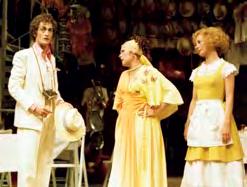
Judi was particularly impressed by Philomena’s sense of humour—and I’m impressed by Judi’s. There’s no reason I should have assumed she’d be humourless: some of her greatest triumphs have been in comedies, from Trevor Nunn’s 1976 production of The Comedy of Errors to the sitcoms A Fine Romance and As Time Goes By . Yet because she has those stern eyes, and because she’s manifestly an acting great, somehow her wry wit comes as a surprise. She describes the set of Philomena, a profoundly moving film, as a giggle a minute.
“Steve Coogan? He’s hysterical. He made me laugh every day and, of course,


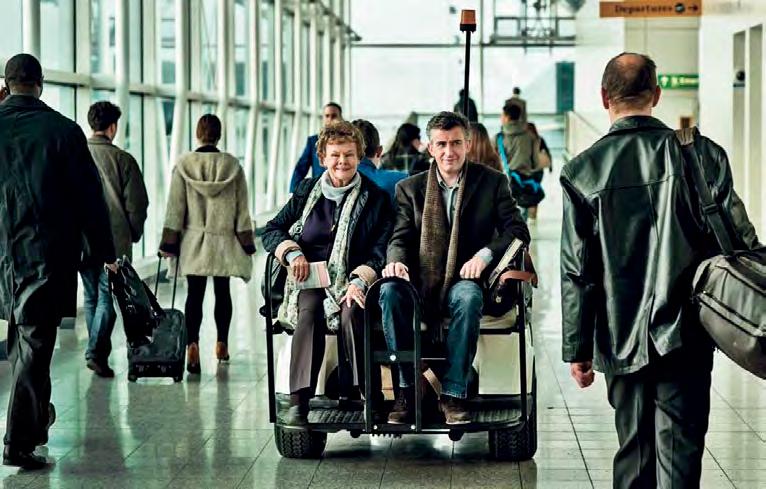
when you’re playing something that requires quite a lot of tension, it’s glorious to be able to just have a laugh suddenly. He’s a terribly clever man; I don’t need to tell you that. I asked him to take off Bruce Forsyth, he did; and he does Sean Connery young and old. He never stopped. He just made me howl. How wonderful that is.”
She also says there was a lot of mickey-
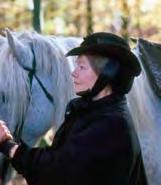
taking, and it sounds as if Judi gave as good as she got: “I never stopped telling him he had Botox in his top lip. I don’t think he denied it!”
Eventually, I admit that I’d never thought of her as a comedienne. She takes mild offence, suggesting in response that a little levity is one of her preconditions for a successful production.
“I defy anybody to do a really


smashing piece of work without people having a sense of humour. If they take themselves too seriously, you’re up the creek.”
She says her only other criterion in choosing work is to follow a zig with a zag. “You don’t want to do something remotely like something you did before, that’s all. I want something that’s fascinating to do and where you learn something new—and is as different from the last thing as possible.”
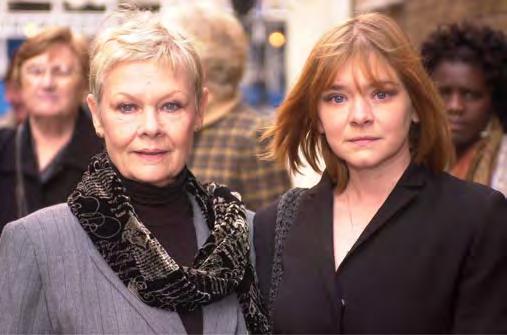
Her recent work includes the comedy The Best Exotic Marigold Hotel, the Bond epic Skyfall, and now the tender, intimate Philomena. She also starred with Ben Whishaw in a West End run of Peter and Alice—playing the elderly Alice Liddell, who as a girl had inspired Lewis Carroll. It reminds you that, at 78, not only does Judi Dench refuse to be pigeonholed, but she’s not slowing down either.
“I like to be busy; I love the work. I’m in the two per cent of the population doing the job they want to. I think that’s incredibly lucky. But I took eight weeks off when I finished the play, because that was 12 weeks in London and it was quite exhausting. It was the journey each day up there and back again [from her home in Surrey] every day, twice on Saturday, and after that I thought, You know, I really want a rest. And so I spent four weeks in Cornwall in the sun, swimming and lying on the beach, which was glorious.”
You hear very little about the offscreen life of Dame Judi Dench—for the most part, she says, because she doesn’t
have much of one: “I go from one thing straight to another very, very often.”
But, she adds, when she does get time off, her priority is her family: “My daughter [the actress Finty Williams] and grandson [Sam, 16]—I just love it when we’re together. We had supper in the garden last night. It was really lovely. Those are the good bits.”
She also paints watercolours, though typically she downplays her talents. “I paint a lot but they’re not for public consumption, just for myself. I don’t write a diary, so I paint. I trained as a theatre designer before being an actress, so that’s something I’ve always liked doing. My Pa was very, very good at it, an uncle was very good too and both my brothers paint—it’s just a great way of relaxing.”
So would it be possible to buy a genuine Dench? “No! I don’t think there would be a market for them,” she laughs— although I suspect there would. Anything with Judi’s name on it attracts an audience, both here and in America.
Another thing you may not know about
Judi Dench is that she’s an Everton fan. “It’s because of Bill Kenwright [Everton’s chairman and a theatre and film producer]. I’ve worked for him so many times, I have to support his team.” She’s patron of the Everton in the Community charity, but says she’s not that ardent —partly because her husband Michael Williams, who came from Liverpool and died in 2001, was a red, not a blue.
As for the day job, she says that even after 50 years in the business, and with 11 Baftas, an Oscar and a Tony, it’s not getting any easier: “I’m far more nervous now than I was. But that’s something you just have to deal with. It’s something you don’t broadcast too much because nerves create adrenalin. You can use all that—it’s petrol—but it’s not your business to let other people sense it. All that fear or fright is really your own business.”
In fact, the fear has grown with her celebrity. (It’s odd to think that Judi’s global fame came only in the mid-1990s with GoldenEye and Mrs Brown, 40 years into her career.) “The more you do, the more is expected of you. You also know more about the job. I don’t know if I’ve improved; sometimes you haven’t. But at least you’ve learned to simplify things. Less is more—I understand that now.”
“Less is more” works well on camera,
but from her first appearance at the Old Vic in 1957 to those film breakthroughs, Judi was always primarily a stage actress. And it’s still where her heart lies.
“The thing I like best is the theatre,” she says firmly. “We used to go to Stratford in rep and you could play Lady Macbeth in the afternoon, Beatrice in Much Ado at night and the next day you could play Adriana in The Comedy of Errors. Now, that for me is the most exciting way of working. You could play four parts in a week, four different parts, four different Shakespeare plays. That’s my idea of heaven.”
It is, of course, a world away from Bond. After 17 years as M, she won’t be returning to the role, but hopes that doing big films like that will inspire their audiences to become theatre-goers.
“The reaction to Bond comes from lovely young chaps of about 11 and they have no idea what else I’ve done, and nor should they be bothered. But they like to have met somebody who is in Bond and that’s wonderful because I think, Well, there’s an audience who would maybe go into a theatre. It’s to bait people for the theatre really. I never want people to not go to the theatre. I want it always to last.”
Philomena is in cinemas this month. (See our review on p13.)
How much can you say about a new logo? Here’s Yahoo CEO Marissa Mayer (and there’s plenty more of this):
“We didn’t want to have any straight lines, [which] don’t exist in the human form and are extremely rare in nature, so the human touch in the logo is that all the lines and forms all have at least a slight curve…we preferred letters that had thicker and thinner strokes, conveying the subjective and editorial nature of some of what we do…our last move was to tilt the exclamation point by nine degrees, just to add a bit of whimsy.”

Jazz in a concert hall, classical recitals in a park, or a blast of indie on a floating ship? The range of places to listen to music in the UK is astonishing. So whether you like your culture high or low, there’s a venue just waiting for you to drop in
BY LoLA BoRG►

A grubby orange awning and a plastic sign in Oxford Street are all that announce what one music journalist described as “the Tower of London of rock venues”. With a capacity of 350, the 100 Club is one of the few surviving smaller music venues in the city centre (others, such as the Marquee in Wardour Street, have long since disappeared).

grown men chills. The roll call of bands who have performed here over six decades includes The Who, Muddy Waters, The Rolling Stones and The White Stripes. It’s also, of course, where the Sex Pistols became the Sex Pistols.
Inside is what looks like a working men’s club with orange plastic chairs. But make no mistake—being in the same room as this stage is enough to give
Surviving a near-closure in 2010, when the Crossrail project meant astronomical rent hikes (it was saved by a deal with Converse, the trainer company), it lives to see another day. It’s, as they say, still “a venue for serious music heads”. Visit the100club.co.uk for details

One of the stars of late-Gothic architecture (it has the largest fan-vaulted ceiling in the world), King’s is an astonishing space in which to hear choral music. “The acoustic is breathtaking,” says Martin Cullingford, editor of Gramophone magazine. “It almost
feels as if the sound is all around you.”
The choir, regarded as one the world’s finest, is probably most famous for the Festival of Nine Lessons and Carols, which each year kick-starts Christmas for millions around the world. But King’s has a year-round programme of events that includes organ recitals and concerts, as well as the choir performing free services daily during term-time (check the website just in case).
The other remarkable religious-spacecum-music-venue is the parish church of Buckingham Palace, St Martin-in-theFields, which regularly holds candlelit concerts of Mozart and Vivaldi, and free lunchtime concerts three times a week. Visit kings.cam.ac.uk and stmartin-inthe-fields.org for details

Rising out of the ironing-board-flat fields of Suffolk, next to the River Alde and surrounded by reed beds, Snape is possibly the only concert venue to share a permanent base with the RSPB. It’s here because composer and local boy Benjamin Britten (pictured below) was wildly ahead of the festival curve and founded his own: the Aldeburgh Festival.

The tastefully converted Victorian malting house in the hamlet of Snape became the festival’s concert hall and first permanent home. Opened in 1967, it’s ballooned to become an entire campus and artist retreat. Picturesque verging on the twee (with no shortage of gift shops), it’s a beautiful place to mill about, even for those with cloth ears. There’s a year-round programme covering all genres—not just opera, but everything from Burt Bacharach to jazz and the visual arts (there are sculptures by Henry Moore and Barbara Hepworth in the grounds). Visit aldeburgh.co.uk for details

The capital of the north and the city with “everything except a beach”, according to Ian Brown of the Stone Roses. Yes, of course Manchester has had a thriving club and music scene for decades (current favourite is the supercool, mirrorballed Deaf Institute), and in the Eighties there was “Madchester”, of course. But it’s easy to overlook the fact it’s been a centre for classical music for aeons.
The Bridgewater, home to three resident orchestras, is the jewel of northern concert halls. Completed in 1996, the one thing people know about it is that it was built on giant springs to deaden the noise of local

Built in Germany in 1959, the former cargo ship Thekla was rescued from rusting in Sunderland’s docks by novelist Ki Longfellow-Stanshall (wife of Viv Stanshall of the Bonzo Dog Doo-Dah Band). In the 1980s, it was brought to Bristol’s Floating Harbour and turned into the Old Profanity Showboat to host theatrical productions. Later, it reverted to its original name and became mainly
traffic. That, and it’s home to the Hallé Orchestra, founded in 1858 by Sir Charles Hallé, such a giant in Manchester that his funeral brought the city to a standstill. Modern but not soulless, and intimate in spite of its size (it holds 2,400), the venue has excellent acoustics and ambience. It’s also beautiful when lit at night, lying as it does next to the Rochdale Canal.
The repertoire isn’t just classical— upcoming events include Irish folk singer Christy Moore, and last year’s hit was Elbow playing with the Hallé. But, says Martin Cullingford, “The Hallé and Sir Mark Elder are an orchestra and conductor on absolutely top form at the moment.”
Visit bridgewater-hall.co.uk for details
a floating music venue featuring the kinds of bands you might read about in the NME (if you read the NME, that is).
What makes this so special, says music journalist Nige Tassell, is the atmospheric main room down in the hull (where the walls slope inwards), the lovely top bar for more intimate performances (from which sunsets over the Bristol skyline never look better), and a Banksy stencil of a skeleton in a rowing boat that adorns the waterline on its exterior. Once described as a “floating toilet” by the NME it’s since had a makeover and was subsequently nominated for the NME’s Best Small Venue award.
Visit thekla bristol.co.uk for details ►

Posh punters: the Glyndebourne faithful don full evening dress to listen to “country house” opera
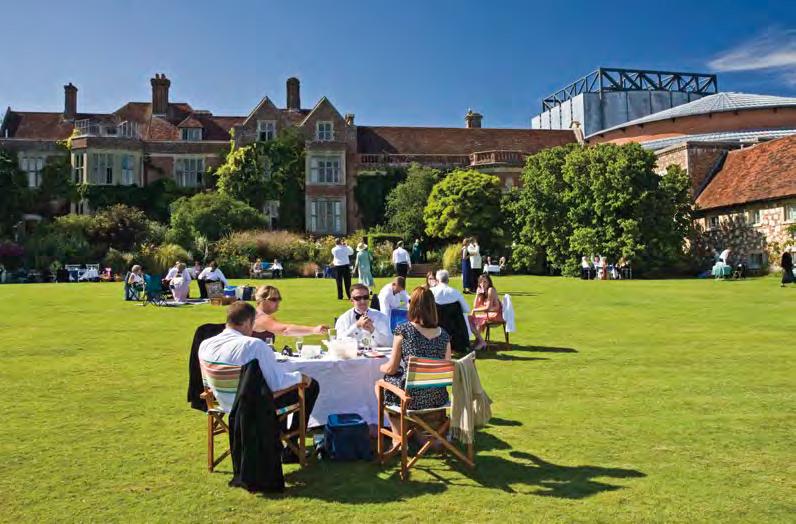
Possibly the most eccentric classical music venue, and certainly in one of the more attractive settings. Glyndebourne stands next to the old manor house on the Sussex Downs that once housed the festival. Held during the summer months when opera-goers eat picnics on the lawns, they now watch performances in a purpose-built modern auditorium (built in 1992) next door to the house, which is supposed to blend in to the countryside (but doesn’t quite).
Originally established as a vehicle for owner John Christie to delight his new wife, the soprano Audrey Mildmay, it grew out of their amateur opera productions. From the get-go in 1934, Glyndebourne has had a reputation for attracting and nurturing world-class talent and productions, and is today the leading exponent of “country house” opera. If the sun shines, you’re in for a memorable experience. the Glyndebourne Festival Opera takes place from May to August. Visit glyndebourne.com for details.
This city has always had notoriously tough audiences— as comedian Ken Dodd put it, “The trouble with Freud is that he never played the Glasgow Empire on a Saturday night.” The Barrowlands is no exception. In the east end of the city, in a rundown street of money shops and Irish pubs, it’s not the swankiest of venues. But the daytime seediness melts into the evening when the famous neon sign lights up. Inside the floor bounces, the ceiling (studded with faded stars) lifts, and it’s claimed you can see the whites of the
How many venues can boast that they had a rockumentary based on their existence?
Admittedly, Eric’s the Musical never quite made it to Broadway, but still. Eric’s star burned bright, but, in the way of these things, for an exceedingly short time. Opening in 1976, it shut just four years later after a drug raid (though in reality it was a financial mess). Once the epicentre of punk and post-punk, bands that invented or cemented their careers here include Echo and the Bunnymen, Dead or Alive and The Teardrop Explodes.
After closure the site lay vacant in Mathew Street, opposite the original Cavern Club, until it reopened as Eric’s Live, to much local debate. The Liverpool Echo was scathing on the venue; what was once, it said, “a hub for creativity….is now the home for piss-ups, punch-ups and hen parties”. Visit ericsliveliverpool.com for details
performers’ eyes even from the back. Just about everyone has played there, from David Bowie (who narrowly missed being hit by a porcelain star that fell from the ceiling) to Robbie Williams, Stiff Little Fingers, Paul Weller, Nick Cave and even the Michael Clark Ballet Company.


Opened in the 1930s by Margaret McIver, a Glaswegian entrepreneur who founded both the market next door and the music venue, it became
infamous in the late Sixties for its own serial killer, known as Bible John and never caught. Whispers are that many bands have been lured away to other venues of late. Let’s hope not.
Visit glasgow-barrowland. com for details n
Thanks to: Martin Cullingford, editor, Gramophone; Nige Tassell, author of Mr Gig: One Man’s Search for the Soul of Live Music; Tom Doyle, music journalist and author of Man on the Run: Paul McCartney in the 1970s; Mark Ellen, music journalist; and the Performing Right Society for Music.
If you know of a better music venue than the ones we’ve mentioned here, we’d love to hear about it. Send us an email—with a picture if possible—to theeditor @readersdigest.co.uk.
Ever
wondered what it’s like
to go through some of life’s most harrowing experiences? We asked three people who know to tell us their personal stories of...
In June 2009, Paul Johnson’s car was hit by a van. Although the 46-year-old salesman from Plymouth appeared to be uninjured, a few months later, he was plunged into darkness
“My car was a total Mess after the crash and My head took a real whack, but apart from slightly blurred vision—which didn’t worry me because I had iritis at the time and thought it was because of that—I was fine. Over time, though, I began to notice my eyesight deteriorating.
“The doctors just gave me eye drops for the iritis, but by New Year’s Day 2010, I couldn’t even see the outline of my hand in front of my face. We waited in casualty for three hours and only then was I told I had a detached retina in my left eye. And, unfortunately, it was too late to do anything about it.
“I was trying to stay upbeat and kept saying things like, ‘When I get my sight back…’, but inside I was beginning ►


“life became about getting through each day”
to panic. I made an appointment at Moorfields Eye hospital in London. They were absolutely brilliant, but had some more bad news. Not only was my left eye buggered, but I had a cataract in my right and a pressure build up on my optic nerve that might have caused permanent damage. Sod’s law, eh? I still think it had something to do with the accident.
“I had to face up to the possibility that, even if they removed the cataract, I might never see again.
“At that point, I was totally blind. Almost overnight, I’d lost my independence. I felt like a very old man. I couldn’t do anything for myself. And what

made it worse was that my family had to see me going through this torture. Obviously I couldn’t work, so my wife Philipa—a civil servant—had to support me and our daughters Danielle and hannah. Philipa made me a packed lunch every morning, went off to work and I’d listen to audio books and radio 4, practising how to walk to the bathroom without falling over.
“can you believe that i tried to cook for Myself…burning my fingers when I tried to make a Chinese meal in the wok!? I guess I didn’t want to admit I was blind. Looking back, I think that was a decision I made. I wasn’t going to sit there and think, Right, this is my life, because the sadness would have finished me off.
“I’ll admit there were times when it almost got the better of me. Our girls were going out one Friday night and,
Swedish guide Anders Bergwall, 50, is used to extreme weather. But in April 1997, he and his tour group were facing a night in the bitter cold without proper equipment or anyone knowing where they were
“it was quite rare, 16 years ago, to take an expedition to greenland. But after striking a deal with the tourist board, I took a party of extreme skiers to a mountain range on the west coast, about 120 miles from the nearest mainland settlement. I guess some people are scared of being so far from civilisation. Not me. I like being in that black hole.
“We were being looked after by a Danish helicopter pilot I’d worked with many times before. he’s brilliant, but crazy. he dropped us off on the coast at about 4pm and said he’d be waiting to pick us up around 7pm. We had a great day’s
►

as they came downstairs, my wife said, ‘You two look lovely.’ Instinctively, I looked up, but of course I couldn’t see them. I wanted nothing more than to look at my daughters. I cried and cried.
“Mornings were always difficult. When you’re asleep, the pain is suspended, but as soon as you wake up, it whacks you round the head. This isn’t a dream. The world is still dark and lonely.
“Even when I was surrounded by my friends and family, I couldn’t shake off that loneliness. I found I wasn’t included in conversations like I used to be. I don’t think people were being mean… you just get treated differently when you’re blind.
“This will sound like a cliché, but life became about getting through each day. As the cataract operation approached, I was getting nervous, but the surgeons had said there was a chance
I’d get some sight back and—with the support of my family—I held on to that little bit of hope.
“I went into Moorfields on June 17, a year after the accident. I came round as we got back to the ward and I could feel the nurse peeling off the bandages. I kept my eyes tight shut; I didn’t want to know what had happened. Then I heard Philipa’s voice and I opened them. My right eye worked. I could see!
“I looked around that room and suddenly saw my wife. She was crying tears of joy, but I couldn’t resist a little joke. ‘My god, you’ve aged! What have you been up to?’ She gave me a playful tap and, as I looked at her face, I realised it was the most wonderful thing I’d ever seen.”
Paul Johnson’s Flying Cats and Flip Flops: Surviving a Notorious African Prison, a book about his father, is out now (£7.99).

“If you gamble with the elements, you lose”: Anders leads another tour group
skiing, so everybody was very happy as we headed back to the rendezvous point. “hmm… no helicopter!
“Of course, I made a joke about the pilot falling asleep, but I quickly tried to contact him on the radio. There was no answer. I waited a short time and tried again. No answer. And again. Still no answer. After a few more tries, the battery was so low that the radio switched itself off. This was not a good sign. he was the only person who knew exactly where we were.
“the teMperature was about Minus 8°c, which is pretty cold if you’re standing around for too long. We were wearing cold-weather gear, but we didn’t have a tent or extra supplies. The other guys were looking a bit concerned and they started asking me what had happened to the helicopter, so I tried to look cheerful and said, ‘he’s probably landed in a different location. Let’s split up and look for him.’ As I set off across the mountains, my big worry was that he’d crashed.
“After a few hours, we’d searched the entire area, but we saw nothing. Time for a serious assessment of the situation. We had no radio, no food, no tent, no ride home and we were 120 miles from civilisation. If the weather stayed fine, the emergency services would start looking for us in the morning, but one big snowstorm could mean that we’d be cut off for days.
involved in many mountain rescue operations over the years. I know that if you gamble with the elements, you lose! Suddenly, I was very aware that all these lives were my responsibility.
“I suppose that was the big moment for me. It was time to do my job. The temperature was beginning to drop and the light was fading. I knew that our choices were narrowing by the minute and things were getting serious.
“I had a good look at the guys. how were they feeling? A few of them had been making jokes, but now everyone was pretty quiet. On the mountains, poor judgement is the biggest killer. If you’re tired and stressed you make bad decisions, so I focused all my efforts on staying calm and putting on my stony face. Yes, you understand there is a chance you can die, but you don’t let your mind go there, because that will cause you some serious mental problems and stop you doing your job properly.
“a few of the guys had been making jokes, but now they were quiet”
“I’ve been
“We counted up the energy bars— wishing we’d packed more—and started preparing to make a snow cave for the night. We needed to stay warm. Little bits of information started feeding into my head. ‘OK, we’re near the coast, so at low tide, we can pick mussels. We need to make sure we’re visible from the air.’
“I was processing all of this when, suddenly, out of the Arctic silence, I heard it. Noise pollution. The sound of the helicopter!
“All the guys were cheering and dancing in the snow. Yes, I was happy too, but, more than that, I wanted to know where the hell he’d been. Apparently, he’d gone to a nearby village where he knew one of the girls and… well, you can guess the rest.
As a student in Iran, Effat Mahbaz welcomed the 1979 revolution against the Shah. Within weeks, she realised that the new regime was not going to be any better
“at 15, i was questioned by the shah’s police for reading the wrong kind of book in school. That day changed my life. I became an activist, fighting for personal freedom.
“So when the Shah was deposed in 1979, I was very happy. But after 20 days, Ayatollah Khomeini passed laws making life very difficult for non-Muslims and women. My parents were devout, but I was not. I was forced out of university. My brother, also a reformist, was killed. ►
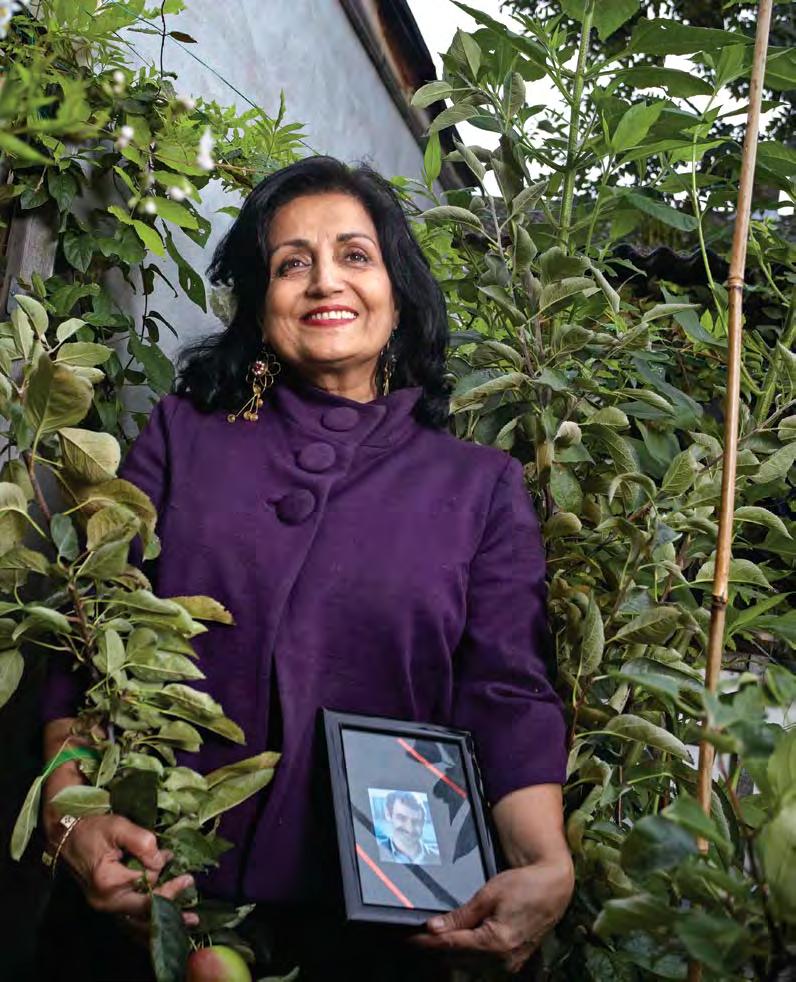
Effat Mahbaz with a photograph of her husband—and the apple tree that now represents him
photographed by debbie rowe◄
“In 1981, I married another reformist, so I knew there would be trouble. But when it came, it was still a shock. It was the Persian New Year’s Day [in March]
1983 and I was walking in the street with my husband. I was pregnant and holding flowers. I noticed a car travelling very slowly and two men got out.
“They said, ‘You two look suspicious.’ I said, ‘I’m pregnant and I’m holding flowers. how is that suspicious?’ But we were taken and put in separate rooms in a building across the city. The strange thing is that I wasn’t scared. I was sad—sad for my country, for my baby and for my husband.
“from my celi, i heard the gunshot that killed my husband”
“They asked me lots of questions, then blindfolded me and took me to a cell containing maybe 40 other women. Many were crazy, talking to themselves and laughing loudly. It was easy to go crazy. One day, you have a life and you’re expecting a child, the next you have nothing. My baby was born in captivity, but he didn’t live very long.
“the only way you can survive that life is Minute by Minute. I made friends with two other women in the cell and we’d take ourselves on journeys in our minds. We’d go shopping and walk in the mountains, describing everything we saw.
“Lots of the women did not survive. Many killed themselves in the cells or were taken away to be tortured and killed. In 1988, I too was tortured. They did bad things. Things that made me want to kill
myself. I began to cut my wrists. Then I realised, No, I want to live.
“I was a prisoner for seven years and was allowed to see my husband just a few times. The last time was in 1988. his legs and feet were all swollen and bloody. They were still torturing him, hoping he would give them information about other reformists. We both knew he was going to die. I saw tears in his eyes as he told me he was proud of me, but I would not cry. I wouldn’t let them see me cry.
“The authorities murdered more than 4,000 people that year. On July 27, I heard gunshots from my cell. They killed 80 people. My husband was one of them. I heard the gunshot that killed him.
“I spent another two years in captivity. I’m sure we were saved by a campaign run by the uN and Amnesty International. At first, I was so happy to be free, but when I went back among the people, I couldn’t stand it. I was like a mirror all broken into pieces. And, as I thought about my baby and my husband, I didn’t think I could ever be joined together again.
“Today I live in London and work for The Mourning Mothers of Iran, which campaigns for women’s freedom all over the world. I’m not interested in left or right politics and I don’t hate Muslims. My parents were Muslims and were two of the kindest people I ever knew. The people who tortured me weren’t interested in Islam, they just wanted power.
“They tried to make my world a black world with no colour, but I will not allow that. In my garden, I have many trees and flowers, and each of them represents a person I knew during those terrible years. My husband is the apple tree and I talk to him every day.
All interviews by Danny Scott n






This Tamron Megazoom lens delivers an unbeatable combination of exibility and performance.
Thanks to the 15x zoom you can choose the right focal length for every situation in no time. The VC image stabilization and the fast, almost silent PZD autofocus complete the package. The lens´ low-weight and compactness ensure that enough room is left in your travel bag for souvenirs. Available for your digital APS-C SLR from Canon, Nikon or Sony *.





























www.tamron.co.uk
www.facebook.com/TamronUK
* The Sony mount does not include the VC image stabilizer.






Available from and all ne camera retailers


“Killer”
bird flu was back in the news this summer, when a new strain was found in China. But what became of other apocalyptic health scares after they slipped from the headlines?
Amanda Riley investigates
•“there was a point in 2010 when almost a third of uK hospital beds were taken by people critically ill with swine flu,” remembers consultant epidemiologist professor Nick phin from the public Health england (pHe). “It was one of the most serious public health alerts I’ve been involved with.”
In March the previous year, edgar Hernandez, a five-year-old Mexican boy, had had a high fever, and throat swabs revealed a new strain of the H1N1 flu virus. By april, there were 642 confirmed cases in the uS and a school in paignton, devon, was closed when a 12-year-old girl who’d been to Mexico tested positive. By June, with 141 people dead worldwide, the World Health Organisation (WHO) declared a pandemic. “the question was, was it going to be another 1918, when Spanish flu killed 40 million?” says professor phin. “We had to assume the worst and do everything to minimise the impact.” pHe tried to stop the spread by giving antivirals to the contacts of confirmed cases. “there were big clusters in London and the West Midlands,” recalls professor phin, “and we worked long days, collecting swabs and blood samples from as many as 15 contacts per person to monitor the disease’s progress.”
While governments made disaster plans, researchers got to work examining the molecular structure of the virus in order to produce a vaccine.
By October, 521,000 people in england alone has caught swine flu—with dozens dying. But soon the first batches of vaccine were being sent out to Gps to start a massive immunisation campaign.
ann price, 59—a retired information scientist from London—received the injection because she has severe asthma. “a few of us who’d been going to each other’s houses for pre-Christmas drinks all went down with it,” she says. “I was coughing so badly I could hardly breathe. It took a good month to recover. But those of us who had the inoculation definitely got better quicker.”

Playing it safe: precautions against the swine flu epidemic in California, 2009
thankfully, the overwhelming majority of cases (including “boy zero” edgar) turned out to be relatively harmless. analysis showed that swine flu was missing the dNa that had made Spanish flu so deadly. It’s thought that half the British population caught swine flu from 2009–11 (many without realising it), but there were only around 1,000 deaths.
Scientists and politicians were later accused of having overreacted. But the WHO estimated swine flu killed 18,500 worldwide, particularly in africa and asia. a study last year in the Lancet Infectious Diseases journal claimed that the real toll might in fact have been 15 times higher.

“Swine flu will probably continue to circulate around the world for some years until another virus takes its place,” says professor phin. “But a significant proportion of the population will have immunity and the vaccine is now part of the uK’s seasonal flu jab.”
In december 1988, farmers were outraged and the public alarmed when junior health minister edwina Currie announced, “Most of the egg production in this country, sadly, is now affected with salmonella.”
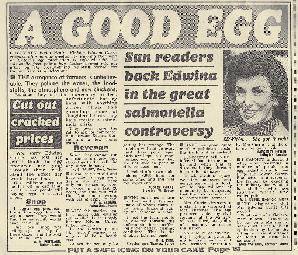
Of course, this was overstating things and she later resigned. But more than 27,000 Britons had already gone down with a strain of salmonella enteritidis that year in an outbreak partly caused by eggs. typically, people suffered diarrhoea, vomiting and fever for four to seven days and recovered without treatment. But the resulting dehydration could be life-threatening to the young, elderly and people with weakened immune systems. “egg sales halved and we were very worried for the future,” remembers andrew Joret, chairman of the British egg Industry Council. “you couldn’t give eggs away.” But, he says, a quick government response stopped things getting too bad—with compulsory salmonella testing brought in within six months and several million infected birds destroyed. In 1998, scientists devised a chicken vaccine for the strain, and the British Lion Quality Code of practice—which certifies 85 per cent of uK eggs—made it compulsory. this move has been credited with helping to reduce cases of salmonella from 18,000 in 1993 to 459 in 2010. Flocks not covered by the code still have their eggs tested for salmonella before being allowed into the food chain. When the Food Standards agency tested some 28,000 British eggs in 2004, only nine had salmonella on the shell and just one in the egg itself
“research has shown we have virtually eliminated salmonella in British eggs,” says andrew Joret.

Back in business: the British egg —and below, how to read the code

•distressed cows struggling to stay on their feet, huge piles of livestock burning in fields… the tV images of the BSe crisis caused widespread alarm in the late 1980s. But that was nothing compared with the outcry in 1996 when ten British cases of an odd brain condition suggested that “mad cow disease” had been passed on to humans.
Four million British cows were slaughtered to halt the spread of BSe, but not before some 500,000 infected cattle had entered our food chain. Now it was clear that infected spinal tissue—which had been used in everything from burgers to baby food and vaccines—could cause the fatal condition known as variant Creutzfeldt-Jakob disease (vCJd).

“When I was health secretary in 1998, the computer projections ranged from a few hundred fatalities to 3.5 million,” says Frank dobson Mp. experts advised him it might be possible for the disease to be transmitted through blood transfusion supplies, so he authorised the cleansing of all the uK’s stocks.
New cases peaked between 1996 and 2003 and there have been 200 reported deaths worldwide, 176 of them in Britain. But, although we now hear little about it, vCJd hasn’t gone away: WHO reports two cases diagnosed and two deaths per year.
One more recent victim was andrew Lord from Southsea, Hampshire. His mother Christine was concerned that the 23-yearold tV producer and researcher was working too hard when he started to withdraw and spend more time alone in his room. Headaches and weight loss followed. “By March 2007, he could no longer work. everything seemed too much for him,” she says.



tests revealed that andrew had vCJd
Within nine months he was blind, deaf, and unable to speak or move. “My beautiful, gentle boy was reduced to a shell,” says Christine. “He had a terrible death.”
Christine, a journalist, believes that vCJd is one health scare that may have been underplayed—deliberately. “Many victims are not appearing in government stats,” she says. She’s also published an ebook on the subject (Who Killed My Son?, £1.99).
experts claim that we may have only seen the tip of the disease’s iceberg, because it can lie dormant in the body for decades before symptoms appear. pHe scientists have been testing thousands of samples of tonsil and appendix tissue removed during operations. In November 2011, they announced that as many as 15,000 people who were eating meat before 1996 could be unknowingly infected.
the Medical research Council prion unit at university College London, set up by Frank dobson in 1998, has been developing the world’s first accurate blood test for vCJd. “Longer-term studies will also be needed to assess how many individuals who test positive go on to develop the disease later in life,” says unit director professor John Collinge.
But the unit has now managed to create antibodies that can block infection in mice and is said to be “very close” to a treatment for humans. “It looks as though it might be widely applicable to degenerative brain diseases such as dementia,” says dobson. “If it comes off, it’ll be a Nobel prize for Medicine.”
•For a brief time in May 1994, there was mass fear in Britain of a modern-day plague. tabloid headlines screamed “Killer Bug ate My Face”, doctors’ surgeries were swamped and one Gp recalls a patient ringing from abroad to ask whether it was safe to come home.
the cause of the panic was necrotising fasciitis (NF), a form of gangrene that attacks skin and muscle tissue and can ultimately cause multiple organ failure and death. though it could be combatted by antibiotics or in severe cases surgery or amputation, the worry was that the gangrene could advance at a rate of two inches an hour. and a cluster of six cases in Gloucestershire—three of them fatal—suggested that a new “superbug” version had appeared that could be contagious, rather than being caused by a wound, say, or blister becoming infected. then there was an alleged second cluster in Chichester…
But when experts at the Communicable diseases Surveillance Centre in London set to work studying the bacterium, dr robert George discovered that the victims had been infected with different strains. the cluster of cases was a tragic series of coincidences and diana Walford, then director of the public Health Laboratory Service, declared: “the public should be reassured that there is no ‘killer bug’ sweeping the country.”

the scare swiftly died down. “It was overblown by the media. rises and falls in the caseload are often noticed from year to year,” says Shiranee Sriskandan, professor of infectious diseases at Imperial College London.
Latest figures from pHe estimate that there are around 500 new cases of NF in the uK each year, with a mortality rate of around 25 per cent—although some think the figure is far higher. professor Sriskandan, whose team is working on new treatments, says, “there is a diagnostic problem, with no one knowing there is something wrong until a patient feels faint or feverish, by which time the toxins are in their bloodstream. It’s such a rare condition that the average doctor has never seen a case. they need to be taught about it.” n
TO THOSE WHO ARE VULNERABLE AND ALONE, I LEAVE COMPASSION, REASSURANCE AND HOPE.
When you write or update your will, please remember the work of the British Red Cross. By leaving just 1% of your estate, you can make sure we’re always ready to help people in crisis, whoever and wherever they are, in the UK or abroad.
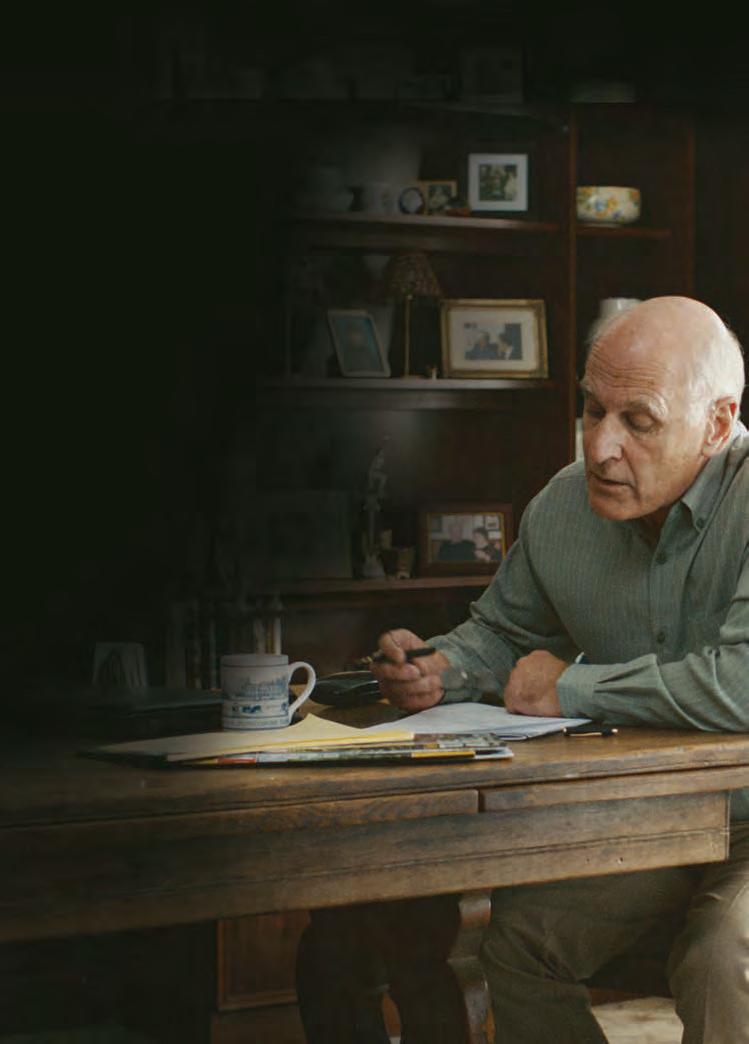

Find out more about remembering the British Red Cross in your will. Call 0800 138 4554 or visit redcross.org.uk/giftinwill today for your free information pack.


…MY CHILDHOOD WAS BRILLIANT. It was very carefree; we were out every day. I grew up in North Wales, in the middle of the countryside, and the village we lived in was tiny. I went to a primary school where my mother was a teacher (my dad was an engineer). So she was Mrs Jones at school, and Mum at home —although sometimes I got it wrong.
…THERE WAS MUSIC IN EVERY CLASS. Even in maths, the teacher would burst into song or a guitar would come out. Music was always in me, I suppose. When I was six or seven, I sang in a local church hall and a man said, “You’re all right,” and gave me 50p. I thought, Wow, someone likes my singing—that’s great!
My mum embarrassingly tells stories about me harmonising with the hairdryer, being a DJ with songs I’d recorded on cassette and having baths listening to the Top 40. During the week, I’d listen to that music, but Bruno bloody Brookes would talk over the intros and ruin it all.
…WALKING INTO BANGOR CATHEDRAL, AGED NINE. I’d been asked to go and sing a few scales. I’d never been in a
cathedral before or heard a large choir sing. I remember the smell and the majesty and the feel of history. And I remember the conversation in our little kitchen back on the estate.
My mum said, “You’ve been invited to join the choir.”
My dad said, “You don’t want to do that. You want to play football, don’t you?”
And I thought, My God! Half an hour ago, I didn’t even know what a cathedral choir was.
A lady in the cathedral’s congregation then wrote to a local recording company about me. I made an album with them; they probably released fewer than 1,000 copies. But for some reason, it was picked up by a BBC producer who was looking for a soloist to do three programmes for the BBC in Israel. He heard my album, and asked me to do it. And that was it!
They showed the first episode [below] on a Friday on BBC1 at 9pm and at the end they said, “If you liked the music, there’s an album in the shops tomorrow.”

Within a week, it had got to number two.
Aled at 14 with silver disc and new “funky” clothes: “That’s a pose I’d never normally do; there were ten photographers going, ‘Give us a leap, Al!’ I’m from North Wales; I do as I’m told.”



“I went to a school where my mother was a teacher. So she was Mrs Jones at school and Mum at home”


...KEEPING MY FEET FIRMLY ON THE GROUND. Mainly because I had to go back to comprehensive school every day! So you don’t boast, “Guess what I was doing on the weekend”, because you’d get punched. During the week, I was just normal Aled, who pushed into lunch queues and played football. Then on Friday, I’d be on the 5pm train to Euston with everybody in the compartment staring at me. So I’d just listen to Les Mis on my Walkman, every journey for a year. I still know every word of that musical.
◄ They then decided to release it as a single —and weird things like Top of the Pops started to happen.
…MY TOP OF THE POPS FASHION DILEMMA. I was from North Wales, where my only clothing outlet was a Burtons. My mum thought she’d got me a nice outfit, but there were all these London people saying, “You can’t wear that—it’s not funky enough! Let’s take him shopping!” So there I was in jeans, a new jumper and white trainers, and all I could think was, What are the kids going to say at home?

“Music was always in me”: Aled in his teenage bedroom
“WALKING IN THE AIR” AS A SINGLE IN 1985. People think it’s the first thing I did, but I’d already recorded about ten albums! [Aled was 14.] Howard Blake, the song’s composer, had been approached by Toys R Us, who were doing an advert based on The Snowman and wanted to use the original recording— but couldn’t get permission. So Blake said, “Well, there’s a boy soprano in the news at the moment, let’s ask him to do a cover.”
The advert was only supposed to be the first verse, but they’d already recorded the entire song with the London Symphony Orchestra, so I did the whole thing too.
That was a really mad time because it led to about two years in school with kids every lunchtime singing, “My name is Aled Joooooones” to the tune of “Walking in the Air”. You get pretty thick-skinned after hearing it for the thousandth time.
.…BEING PART OF THE ROYAL VARIETY PERFORMANCE— AND FORGETTING MY WORDS. The minute I came o stage, Rory Bremner said, “Ahh, you were singing Memory...and you haven’t got one!”
.…MY VOICE BREAKING, WITH UNEXPECTED CONSEQUENCES.
I was 16. But somehow they’d got to hear about me in Japan around that time, so, although I couldn’t sing, I was asked to narrate Hansel and Gretel in Japanese with the Vienna Boys Choir singing it. I learned it phonetically. It’s probably one of the maddest things anybody has ever asked a 16-year-old to do. I can still recite it now, right down to the phrase, “Who’s eating my chocolate house?”

“After ‘Walking in the Air’ was released, weird things started to happen”
I released 16 albums in Japan before I was 18, and all went to number one. Ridiculous, really. All the fans out there were my age, whereas over here they were mainly grannies. (Nothing wrong with that, but it’s true!) We got o the plane in Japan and there were 500 girls waiting in the airport. I was wondering, “Who are they waiting for?” My dad had his hair pulled—but I was thinking This is fantastic! I want to live here for ever!
15-year-old Aled (behind David Bowie) hangs out with the rock stars at Bob Geldof and Paula Yates’s wedding in Las Vegas. (Suit by Burton)
MOMENT. I was 18, and my friend Joe and I went to Highbury to see Arsenal. We were standing on the North Bank and, all of a sudden, this chanting started. I’ve never been so embarrassed in my life—9,000 people singing, “Aaaled Jones, Aaaaled Jones, you’re not singing any more!”
Then Joe said, “My God, you can die and go to heaven!”—and I thought Yeah, actually, this is pretty cool
I’ve always loved football and I take my kids now; I’ve got an Arsenal season ticket.
THREE YEARS. I played the lead in Joseph and the Amazing Technicolour Dreamcoat, aged 24. I was too young and I didn’t enjoy the singing one bit; my voice wasn’t ready. After that, I turned down lots of other musicals. I just sat on the couch watching This Morning. My wife Claire (we met in Blackpool while I was
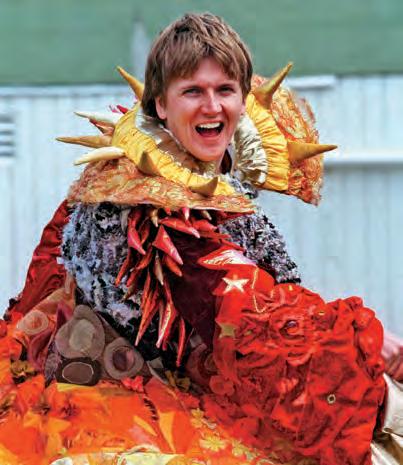
Aled as Joseph: “I didn’t enjoy the singing one bit”
doing Joseph) was a Virgin stewardess, so I went away with her 44 times in four years, usually for a weekend in Hong Kong or something.
.…SLOWLY BUT SURELY GETTING INTO TV. I started in Wales—then in 2000 Songs of Praise had an episode coming up in Bangor, and they asked me to present it. Then they asked me more and more. Over time, it got to 26 a year. It was a complete fluke!
.…THERE WERE A FEW SERIOUS ROWS BETWEEN COUPLES ON ESCAPE TO THE COUNTRY. With some of them, I even wondered if they’d stay together after the programme or if they’d realised they weren’t compatible! But it was a joy to present. It’s just an opportunity to be really nosy. The same thing with Cash in the Attic:
why anybody would let cameras into their homes, with drawers open and knickers everywhere, I’ll never know.
THAT CELEBRITIES ARE JUST PEOPLE. I’ve met a lot of celebs through presenting, which is obviously great. But when I was about to interview Desmond Tutu [on Songs of Praise in 2010], for example, everybody around was panicking so badly, saying they had to be polite and so on. But I just said to him, “Nice to see you, Desmond, how are you?” and he said, “What is happening with Arsenal? How could they sell Thierry Henry?” The producer was completely blown apart by this, but even Desmond Tutu’s just a normal guy.
…THE QUEEN TELLING ME “MY HUSBAND LOVES YOU ON THE RADIO”. I met her at a Commonwealth Day Service I sang at a couple of years ago. After she told me that, I said, “Oh, OK, right.”
Then Prince Phillip came along and I said, “Apparently you like my radio show.”
“Rubbish!” he told me. “I only listen to that cheeky chappy Jones!”
“Err, yes, that’s me!” I replied.
He said, “Oh! Yes, I love your show!”
but I was a bit concerned before I did my first Daybreak last year. Quite a few people were talking about it before we started! I wonder why… [laughs]. But I’ve known Lorraine Kelly since I was a tiny kid, so I’ve always trusted her. Whenever things go wrong around us, everyone panics, but not me and Lorraine. I actually like it when things go wrong.

For such a tiny island, Jersey has a mighty big heritage. Take Neolithic La Hougue Bie; one of Europe’s finest ‘passage graves’, dating back six millennia. And the magnificently preserved Mont Orgueil Castle, which for over 600 years protected Jersey from French invasion. Or “experience” the island’s extraordinary maritime past in the uniquely interactive Maritime Museum – where you can not only see and hear all about seafaring, navigation and the elements – you can touch and even smell them too! All surrounded by the ever-present remains of the German Occupation. Add Jersey’s mild climate, easy travel from the UK and great-value o ers, and you’ve discovered 45 square miles of history for the taking.




. He interviewed me on TV-am, and it was the first time I’d seen a man with his hand up a puppet’s bottom. I was probably 14, and the other guest was Sam Fox. So I didn’t know where to put my eyes—Sam’s chest or Roland’s bottom. For the whole interview he called me Alec. We hit it o though, because he realised I was into taking the mick out of myself, and I featured on his Christmas special.
Then this February, Roland came into the Daybreak studio for TV-am’s 30th birthday. What was the first thing he did? He called me Alec. I love the Rat.
CHRISTMAS MY SON LUCAS ORDERED £500
STUFF ON AMAZON
US KNOWING. The little b****r! He was seven, but he’d seen my wife put in her code. Boxes kept arriving. I kept saying to my wife, “Have you bought…?”
She kept saying, “No.”
I said, “Lucas…?” And he said innocently, “Yeah, it was me!”
Box after box after box of Doctor Who stu . My kids are great with technology.
“I love the Rat”: Aled with an earlier star of breakfast television

…LEARNING NOT TO TAKE THINGS TOO SERIOUSLY. Always laugh. And if you’re singing a song without the sheet music in front of you, always learn it. ■ As told to Ellie Rose
Aled presents Daybreak on ITV1.
If you’re looking for fine dining but can’t a ord The Ivy, you could do worse than teenagers Cameron Ford and Adam Welland, who brought “a bit of class” to a branch of McDonald’s in Kingston-upon-Thames.

In pictures that have since gone viral, the smart pair are seen tucking into fast food at a table immaculately laid with a white tablecloth and candles (fake, apparently). “Some of the sta found it funny, but others clearly didn’t,” said Adam, while Cameron added, “It was the cutlery—they didn’t like us using our own.”
In somewhat dry tones, a McDonald’s spokesperson later said: “We’re happy to provide plastic cutlery to those customers who request it.”
Our fantastic invisible hearing aid is small. Really small. And, because it fits slightly deeper in the ear canal than your average hearing aid, it’s virtually invisible when worn. That means you get all the benefits of hearing better without anyone understanding how you do it.
Whilst it can’t be seen the difference can be heard.
Just because this hearing aid is small doesn’t mean it’s less effective. We’ve made sure this tiny device has the high speed processors and clarity enhancing features of the very latest hearing aids. These are the things that make sure you get to enjoy all the great things life has to offer like conversations with friends and family, an evening out in your favourite restaurant or a cosy night in front of the TV. And you can enjoy all this with the confidence that whilst people might notice the difference in your hearing they definitely won’t notice your hearing aid.
If you like what you (don’t) see, call 0845 203 7662 and book a free appointment in store to find out more about this amazing little hearing aid.
“I hear normally, it’s as if I don’t have a loss and, because you can’t see them, no one else knows I do!”

Free hearing check
To book your hearing check simply call 0845 203 7662
Terms: Valid until 29 November 2013. Free hearing check for over 18s only. Only one free hearing check per year.


We launched our fourth annual 100-word story competition last month. If you’ve entered already, good luck! If not, here to inspire you are three 100-word stories from well-known authors, written exclusively for Reader’s Digest. You can find out how to enter opposite.
It’s hard to avoid puffins in Iceland. still torgren did, after being threatened by one as a child. there are days when an infant’s mind is doubly scarred by any terror; and a plump, ruthless puffin, bigger than torgren’s head, had picked such a day to come around his cot. that puffin consumed torgren’s life. After that he lived by night, and never went near the cliffs. Everyone knew of this lifestyle, so it seemed mysterious when the nightclub in town invited torgren to sample its menu. then they served him a burrito—of plump, ruthless puffin in blueberry sauce.

▪ Bookerprize winner
d B C
Win £1,000!
Pierre’s short-story collection
Petit Mal is out this month *see

Her gaze was intense and strangely affecting. I struggled to identify the emotion—it might have been pity, or more peculiarly, compassion. someone in the asylum was screaming.
“How are you finding the new medication?” I asked. she sighed and for a fleeting moment she looked annoyed.
“do you still believe that you are a psychiatrist,” I continued. “that you work here?”
she stood up abruptly, stepped to the other side of the cell and said, “I’ll see you again tomorrow morning.”
Before I could react she had vanished and the door was securely bolted. “Let me out,” I screamed.

▪ Please send your stories— which should be original, unpublished and exactly 100 words—to 100wordstory@ readersdigest.co.uk by January 31, 2014.
After a few too many, someone suggests it: night surfing.
“Come on, it’ll be fun.”
they take boards and wetsuits and slide into the waves, with only the moon to guide them.
Balanced on boards, amidst hollers and bravado, sobering thoughts crash through them like breakers: rips…rocks.
the water is black. Impenetrable. something firm bumps her foot.
A fish? A shark? Fear somersaults.
she feels the tug of a wave and turns, paddling furiously before jumping to her feet, riding a moonlit path back to shore.
they regroup and sprawl, breathless and laughing.
“Go again?”
“wait,” she says. “where’s Jonny?”
▪ There are three categories— one for adults, and two for schools: one for children aged 12–18, and one for children under 12.
▪ In the adult category, the entry voted best by our panel of judges will receive £1,000, and two runners-up will each receive £100 in book tokens.
▪ In each of the school categories, the prize for the

winner is £500 of high-street vouchers of their choice, and £500 for their school; two runners-up will each receive a cheque for £75. Mark each entry “Adults”, “Schools 12–18 category” or “Schools under-12 category”. Winning entries will be published in a future issue.

High over russia, a plane’s control systems switched off one by one. so how could it avoid disaster?
On a grey and chilly september mOrning, 72 passengers bOarded a tupOlev tu-154 airliner for the five-hour trip from Polyarny in north-west Russia to Moscow. Like many of their fellow passengers, Stanislav and Ekaterina Shestakov had flown the route often enough to know the cabin crew by name. But that didn’t make Stanislav, 30, any calmer. As always, he felt certain that the flight would end badly. This time, though, his anxiety was justified. This time, there was going to be trouble.
►

Frequent flyers: Stanislav and Ekaterina Shestakov

Ekaterina, also 30, tried her usual argument: “If we’re fated to crash, we’re fated to crash. If we’re not, we’re not.” Somehow her reasoning never soothed him.
Stanislav had no choice but to fly. The only practical way to make the trip to Moscow from the remote diamond-mining settlements around Udachny, the town where the couple lived, is by air. The flight leaves from nearby Polyarny airport, with its single runway and single carrier, Alrosa Mirny Air Enterprise, owned by the same state monopoly that runs the mines.
it was a particularly tense time for the Shestakovs. Six months earlier, Ekaterina had been appointed head of the juvenile delinquency department for the regional police force. The job was in Mirny, more than 300 miles south of Udachny—too far to commute from the home they shared with their five-year-old daughter Sofia. Stanislav, a heavy equipment operator at a mine, couldn’t relocate. So Ekaterina rented a flat near the office, and often went a couple of months without seeing her family.
The separation led to squabbles and the couple had sent Sofia to spend the summer with her grandmother on the Black Sea while they struggled to work things out. Now they were going to join their little girl and take a much-needed holiday together. Still, Stanislav found it impossible to unwind.
In the cockpit, the atmosphere was more relaxed. The four-man flight crew had been making the Polyarny–Moscow run for nearly a decade. The pilots, Evgeny Novoselov, 42, and Andrey Lamanov, 43, had nearly 20,000 hours
of flying experience between them. They knew the Tu-154 well and, as they finished their safety checks, taxied onto the runway and launched the big plane into the sky, they had no reason to suspect that today’s trip would be different from any other.
three h O urs after take- O ff, the plane shook violently and the autopilot disengaged. Novoselov and Lamanov immediately took the controls. Turning to flight engineer Rafik Karimov, Novoselov told him to find out why the autopilot had stopped working. Scanning the instrument panel, Karimov saw a red light flash.
“We’ve got a power failure,” he reported. The electricity had failed and the plane had switched automatically to a battery-powered reserve system. But that wasn’t working either. Karimov didn’t know what was causing the trouble, but he quickly grasped how serious it was.
Novoselov, who was that day’s flight commander, radioed the regional airtraffic control centre and informed them
of the problem. “There’s a chance we’ll need to make an emergency landing,” he said. “Please find the closest airport that can take us.”
“Please verify the reason...” began the
“Something’s happening,” Stanislav told his wife.
“We’re going to crash”
controller, but the radio went dead. Then the plane’s gauges, instruments, navigation devices and control systems began switching off, one by one.
t he tu -154 has f O ur reserve batteries, and those on flight 516 were at least 11 years old—with an official lifespan of 12. Investigators later concluded that one of the four had experienced “thermal
runaway”, overheating to the point that its electrolytic fluid boiled away. This affected the battery next to it, so that was out of action too. Then, unconnected to the battery failure, a voltage jump crippled the plane’s main electrical system. The two remaining batteries couldn’t power the aircraft’s complex electronics on their own—and in any case even those would be depleted within a few minutes. Everything possible had to be operated on manual mode.


The Shestakovs, sitting near the front of economy class, saw the “Fasten Seatbelt” light fade out, as if on a dimmer. The plane suddenly wobbled from side to side and for several seconds it seemed as if the pilots were struggling to maintain control. “Something’s happening,” Stanislav told his wife. “We’re going to crash.”
“Don’t worry,” she responded automatically. “Everything will be fine.”
Chief flight attendant
Elena Razumova went into the cockpit and asked if anything was wrong. “We’ve got a big problem,” engineer Karimov answered grimly. “We’ll tell you more later.”
►

Razumova, 50, had been flying for 30 years; she guessed that the glitch was electrical. She went back to the cabin and told the other attendants to stand by for further instructions. All five made sure that their ID cards were in their pockets: standard protocol in case someone had to identify their bodies.
The pilots brought the plane down from 35,000 feet to 10,000 and then to 4,000 to skim the top of the cloud layer. It was dangerous to go any lower without a working attitude indicator— the device that enables pilots to keep an aircraft’s wings level when clouds obscure the horizon. They flew for perhaps 100 miles, searching for a gap they could slip through safely and look for a place to land.
current to work the pumps—and the three engines could use only whatever was left in the small tank that fed them directly. The crew knew they had just 30 minutes of fuel left.
t here was n O time t O wast e. Focusing on his training rather than on the pounding of his heart, navigator Sergey Talalaiev, 52, tried to send an SOS signal on an emergency frequency, unaware that the transmitter had already stopped working.
“We’ve got to dip below the clouds,” Novoselov told flight attendant Nikolai Dmitriev, who’d come to see if he could help. “Better go back to the cabin.”
Dmitriev, 42, didn’t need to hear more. He relayed the news to his fellow attendants, one of whom was his wife Elena Dmitrieva. The two of them had flown together for the past seven years.
“We’re going to die,” Stanislav told Ekaterina.
“Everything will be fine,” she repeated, though she was beginning to believe him.

The flight crew knew they had just 30 minutes of fuel left
Suddenly a warning light—one of the few devices still functioning—indicated that fuel levels were critically low. Soon afterwards, an alarm blared. Fuel was no longer being drawn from the main tanks because there was no longer a constant
This was not Dmitriev’s first air emergency. In March 2001, he was working a flight from Istanbul to Moscow when three Chechen hijackers stabbed another attendant, threatened to blow up the plane and ordered Dmitriev to let them
into the cockpit. With a knife to his heart, he swore (falsely) that the door was locked and couldn’t be opened from the outside. The pilots agreed to land in Saudi Arabia, where the terrorists released some of their 174 hostages. Saudi commandos later stormed the plane; one hijacker, one passenger and a female flight attendant were killed. Dmitriev was given a medal for bravery.
Now he was frightened but, as before, people were depending on him to hide it and cope. As he asked the passengers to fasten their seatbelts, he avoided making eye contact with his wife. It was best, he thought, for both of them to think only of doing their jobs.

The pilots flew down for a closer look. Spotting a small settlement in the distance, they decided to circle around it. As they completed their pass, an incredible sight met their eyes: an airstrip.
as the plane began its descent and entered the disorientating whiteness, Novoselov and Lamanov concentrated on holding the controls steady. Luckily, the cloud layer was thin and within seconds they emerged below it.
The land beneath them was covered with taiga, the pine and birch forest that blankets most of northern Russia. A river meandered through the flat terrain, with a sandbar in the middle. It wasn’t an ideal place for a 73-ton aeroplane to attempt a water landing, but anything was better than the woods. “We’ll aim for the sand,” Novoselov told Dmitriev, who’d returned to the cockpit.
The attendant left to alert his colleagues. He then helped them fasten cupboards, secure loose items and move passengers to free up emergency exits.
The little settlement of Izhma—principal industry, reindeer herding—lies 930 miles north of Moscow. In Communist times, a tiny civil airport was built close by, but it closed in 1997. Later it reopened as a helicopter terminal. The runway was no longer needed, but the manager had kept it in decent repair.
In the sky above Izhma, the pilots kept circling, trying to line up the plane for the difficult landing. The Izhma strip is only 1,465 yards long—and the length needed to land a Tu-154 is 2,700. The pilots wanted to ensure that the plane touched down right at the beginning of the runway so they could use as much paved strip as possible.
The landing gear could be lowered manually, but the electrically operated flaps, slats and spoilers—all normally
used to slow the aircraft’s approach— were out of commission. Novoselov and Lamanov would have to use old-fashioned stick-and-rudder skills to land a modern
and his wife, assigned to opposite ends of the plane, hadn’t had a chance to say goodbye. Outside the window, the forest was rushing towards them.

aeronautical behemoth on a runway designed for little propeller planes.
They circled once, twice, three times, gradually reducing the plane’s speed and refining the angle of approach. With each pass, the flight attendants repeated the instructions for an emergency landing to the passengers.
Some passengers prayed; others vomited into airsickness bags. The attendants walked around offering smiles and reassurance. Stanislav asked his wife, “If we die, what will happen to our little Sofia?”
“My mother will take care of her,” she replied, squeezing his hand.
On the fourth pass, the pilots homed in on their target. The only working instruments were those showing altitude, vertical speed and air speed; the navigator monitored the gauges and called out the air speed as the pilots came in to land.
As the plane shot towards the runway, the attendants buckled themselves into their seats and shouted, “Attention! We’re landing!”
“My mouth is so dry I can’t swallow,” Dmitriev confessed to the attendant beside him. “Mine too,” she said. Dmitriev
l amanOv pushed f O rward the stick just enough to vault the last trees, and deftly nosed towards the airstrip. A moment before they touched down, Novoselov threw the engines into reverse and the plane touched the ground with its main wheels. After the nose wheel touched down, Lamanov hit the brakes. The plane quickly slowed from 240mph to 60, but the runway was far too short. The wings and cockpit sliced through saplings like scythe blades as the Tu-154 sped off the concrete and into the forest.
“God, help us,” Novoselov prayed. Then he thought, After all this, please don’t let us die because some stupid tree hits the cockpit.
In the cabin, people were screaming as branches smacked the windows. When the plane finally halted, 200 yards into the woods, vapour rose from the frictionheated wheels. Some passengers applauded. Others, thinking they saw smoke, began shouting, “Open the exits!”
One of them was Stanislav. He leapt into the aisle, but a flight attendant, determined to prevent a stampede,



blocked his way. “Stay where you are,” he said. “Please sit down.”
At that moment, his wife burst into tears and Stanislav realised she needed him. He sat and stroked her shoulder. “Don’t worry,” he murmured gently. “Everything is fine.”
It took a little longer to convince some of the other passengers. But after one attendant had opened an emergency exit, looked outside and announced there was no fire, calm settled. Soon all the passengers had left the plane by the emergency chute and within ten minutes, the local emergency services had arrived.
As a light drizzle fell, friends and strangers hugged, shared cigarettes and took sips of offered vodka and cognac. For the flight crew, however, the work was not
over—the plane had to be sealed, they had to be debriefed. A uniformed emergency worker approached Novoselov with a grave expression. “There’s one casualty,” the man said.
The pilot shuddered. “Who is it?”
“You killed a hare,” the worker said, and broke into a grin.
Novoselov had a good, long laugh, taking deep gulps of the sweet forest air.
That afternoon, most of the passengers flew on to Moscow from another airport, on another Tu-154. Only one couple, too traumatised to fly, opted to take a train.
It wasn’t the Shestakovs. n
» The pilots on flight 516 were made Heroes of the Russian Federation. The other crew members all received Orders of Courage
Ever got irritated at something that isn’t really worth the candle? First-WorldProblems.com gathers the complaints of the overprivileged (or us):
“I parked in the available space, which was next to a badly parked car, so when they left it looked like my car was the badly parked car.”

“My iPod wouldn’t turn on, so I had to search for my other one.”
“I had to get the pizza box back out of the recycle bin because I forgot to check what temperature to set the oven.”
“I can’t fit a cocktail table in my family room because it blocks the footrest on my reclining sofa.”
“The automatic flushing urinal flushed before I was finished.”
“When the waiter walked by at Olive Garden, my mouth was full of breadsticks, so I couldn’t ask him to bring more breadsticks.”
“The only power socket near my massage chair is ‘Plasma Display Only’.”
“I’ve slept late on my day off and now I have fewer hours to laze around.”
As we age, our bodies absorb nutrients less easily, which is why a multi-nutrient supplement can be useful. Ideally, our daily nutritional needs should be met through healthy eating—but the typical diet doesn’t always supply all the vitamins and minerals a body needs. And no matter how well we eat, our food has often travelled thousands of miles to reach its destination, reducing its nutritional value. Even healthy people can benefit from multi-vitamins and other supplements to help protect against or manage certain diseases.
● Elderly people living in their own homes can be deficient in vitamin D, vitamin A, vitamin E, calcium and zinc, and occasionally in vitamin B1 and vitamin B2.
● Anyone who has lost weight can be deficient in a range of vitamins and minerals.
● Vegetarians can be at risk of not eating enough protein, vitamin B12, iron, vitamin D, zinc, iodine, riboflavin, calcium and selenium.
● Those eating a macrobiotic diet can su er deficiencies of vitamin B12, iron, vitamin D and other nutrients can occur. (This diet should be supervised by a dietitian or doctor.)
Designed specifically for the needs of the over 50’s, ZipVit’s formula is a highstrength product—containing 25 essential micro-nutrients, including the antioxidants selenium and vitamins A, C and E—that provides all the daily goodness you need to maintain a healthy immune system and give your body complete support.



SPECIAL OFFER
Specially for readers of Reader’s Digest—buy one pack of ZipVit’s Over 50’s MultiVitamin Active Formula (£5.99 for 90 one-a-day tablets) and you’ll get an extra 90 tablets FREE of charge. Simply go to www.zipvit.co.uk/over50 to order. P&P is free.

Unguarded and barely marked, Europe’s internal borders take some finding these days—but that didn’t deter this photographer...
The borders between European countries have been fading from the landscape and from people’s imaginations ever since the first Schengen Agreement in 1985—named after the village in Luxembourg where it was signed— began the process of removing border controls.
Today, 26 countries belong to the Schengen Area and more than 10,000 miles of borders can be freely crossed. With the help of a GPS navigation device and detailed maps, Valerio Vincenzo has undertaken eight journeys with his camera since 2007, carefully documenting these erased borderlines.
“I calculate that I crossed borders more than a thousand times without having to show my papers,” says Vincenzo. “The only time I was challenged was on the AustrianCzech border. Even then, I didn’t have to show the patrolman my ID. Instead I showed him pictures of my project.”
photographs by valerio vincenzo

Although not part of the EU, Switzerland does belong to the Schengen Area. This border between Austria and the Swiss municipality of Samnaun was once a favourite crossing for smugglers. Today it’s popular with hikers and mountain bikers. ►

The town of Büsingen is a German enclave surrounded by Switzerland. When the owner of the Waldheim restaurant discovered that the border ran through his terrace, he made it visible by painting a dotted line. Customers can now choose which country they want to sit in.

A stone marker is all that divides Campo Maior in Portugal from Badajoz in Spain. The Spanish-Portuguese border is the oldest in Europe, almost completely unchanged since the 13th century. ►

The D6327 road on the Mediterranean coast runs between the French town of Menton and Grimaldi in Italy. The road surface differs from one country to the other—and inadvertently creates a line marking the border.

g Ermany
pol and
The border between Seebad Heringsdorf and Świnoujście on the Baltic coast—note the German yellow-and-black pole on the left of the walkway and a Polish white-and-red one on the right. Established after the Second World War, the border was officially ratified only in 1991. ►

This rock formation delineates the border in Poland’s Karkonosze National Park—with a marker planted incongruously on top. Border controls between Poland (foreground) and the Czech Republic were eliminated in 1997, when both implemented the Schengen Agreements. n

Cardioace® has been developed on the basis of extensive worldwide research to help support all round health including nutrients for heart health.
It includes thiamin which contributes to the normal function of the heart plus vitamins B6, B12 & folate which contribute to normal homocysteine metabolism.
Cardioace ® Plus contains 1.3g of Cardiol ™ plant sterols which contributes to the maintenance of normal blood cholesterol levels*.
Try Cardioace® today –from Vitabiotics, experts in nutritional support.




The main ways to help maintain a healthy heart and blood pressure include: Eat a balanced diet with 5 or more daily portions of fresh fruit and vegetables to keep your body and heart in top shape.
Exercise –try for 30 minutes of moderate exercise 5 times a week.
Don’t smoke. Smoking can greatly increase the risk of heart problems.
Maintain your body weight within the normal range for your height.
From , Superdrug, Holland & Barrett, GNC, pharmacies, supermarkets, health food stores & www.cardioace.com
Vitamin supplements may benefit those with nutritionally inadequate diets. † Professor Beckett is not cited in the capacity of a health professional, but as a product inventor and former Chairman of Vitabiotics.
*A beneficial effect is obtained with a daily intake of at least 0.8g of plant sterols.
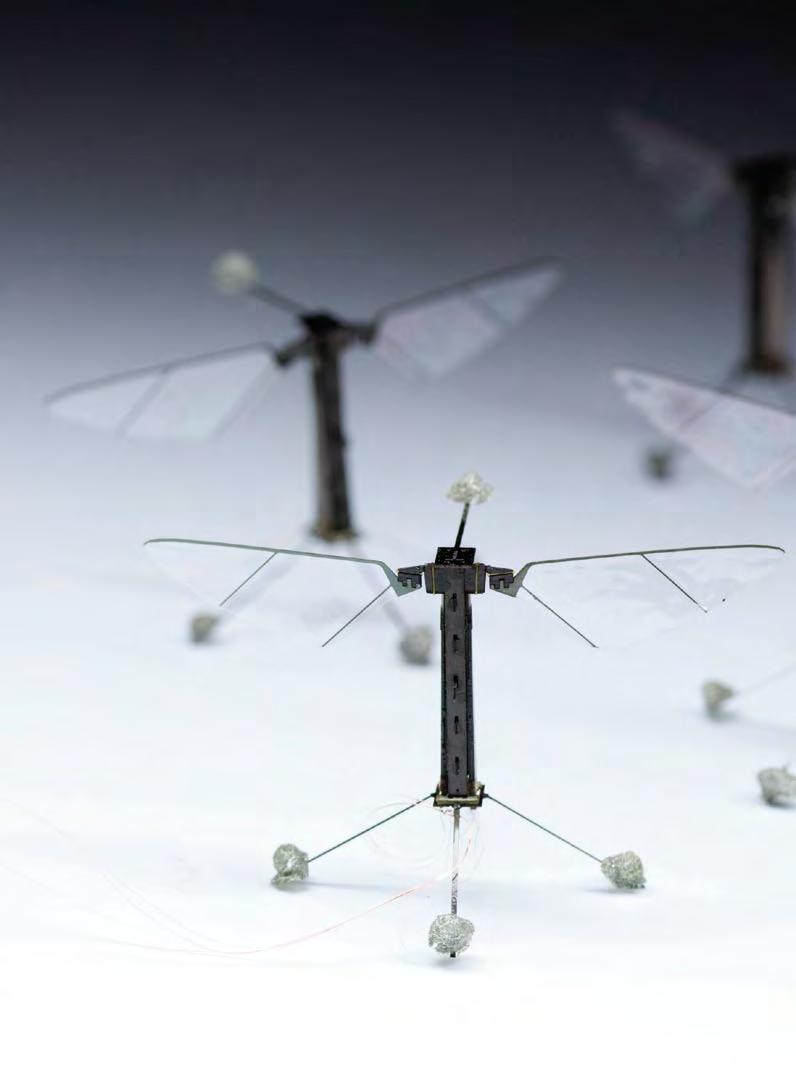
When it comes to brilliant new technology, we have a lot to learn from animals
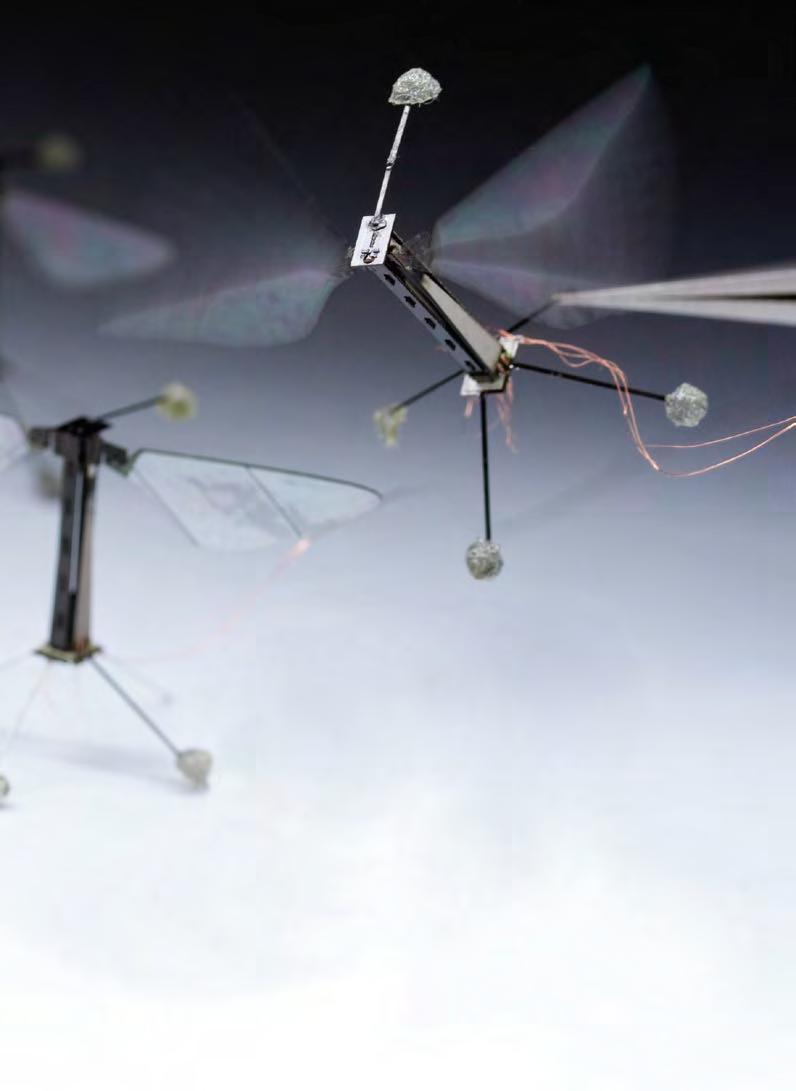

when a plant burr caught on his dog’s coat during a walk in 1948, swiss engineer Georges de Mestral (pictured) was inspired. seven years later, he patented Velcro and started a multimillion-pound industry. this was an early example of biomimetics, the application of nature’s solutions to human problems. with millions of years of evolution behind it, the natural world is a design masterclass that scientists are turning to more and more in their bid to develop innovative new technology.
A buzz of excitement took hold in a Harvard lab this spring. after 12 years of work, scientists watched the maiden flight of “roboBee” —a robotic insect half the size of a paper clip that could help with everything from emergency rescues to crop growing.
Mechanical engineer Kevin Ma of Harvard school of engineering and a pplied s cien ces explains: “ the roboB ee flaps its wings almost exactly like the real [thing]. each goes through a large ►
stroke angle, almost 120 degrees, and flaps 120 times a second. the challenge was doing all this in a very small, very lightweight system.”
the roboB ee came together when the scientists switched from making single parts to sandwiching laser-cut materials onto a flat plate that self-assembled.
the tea m then created flight muscles. these are ceramic strips that bend when an electrical voltage is applied to them. repeatedly applying and removing the voltage causes the strips oscillate quickly and drive the wings. the robot controls each wing independently to steer and stabilise in the air like a real insect.
Currently, the RoboBee is tethered to a hair-thin wire. the challenge now is to find a battery tiny enough to allow it to fly free. “we’re still waiting for the technology to be miniaturised and become more energy-dense,” says Ma.
Ma and his colleagues are also developing tiny, high-performance sensors that work like a fly’s antennae, and researching artificial intelligence to allow roboBees to fly in swarms and communicate like their counterparts in nature.
Completion is at least a decade away, but the tiny mechanical insect could be used to find survivors in dangerous environments. It could also be employed in agriculture to assist with the pollination of crops —ironic, given that real bees do this brilliantly, but necessary given the decline of the honeybee.
Our oceans are full of marine plants with potential medicinal properties, but they’re often in inaccessible places. so scientists have developed an eight-armed aquatic robot that can reach into crevices and grasp objects—just like an octopus.
“one of the challenges was replicating the action of octopus muscles,” says Professor George Jeronimidis, director of the Centre for Biomimetics at the university of reading, one of six research groups involved. rather than stretching and pulling against bones, they rely on contractions, with some muscles enabling the tentacles to twist, others to shorten or stretch.
the team’s answer was to use soft arms made of silicone, driven by cables to create elongation, bending, pulling and grasping. s ensors were added to enable the robot to detect when it touches something, and mathematicians devised algorithms to allow the robot to interpret what it’s touching and to know when to twist a tentacle or grasp.
Professor Jeronimidis envisages the robot being used for exploration, harvesting marine plants, constructing things underwater, and search and rescue.
Mammal skin is pretty special. the outer layer, the epidermis, is made up of tightly packed cells (keratinocytes) that provide a natural barrier to infections while helping us to regulate heat and prevent water loss.
when we generate excess sweat (more than can quickly evaporate), droplets merge into a large drop on our skin until it’s heavy enough to roll off. But when humans wear clothes, sweat gets trapped, causing unsightly patches.
The aquatic robot uses silicone arms that interpret what they’re touching

so researchers at the Micro-Nano Innovations (MiNI) Laboratory, university of California, thought a better fabric could be created using the same principles as skin. the result is a waterproof, sweat-removing material with applications not just for sporty types, but also for medicine.
It has “hydrophilic” or water-attracting threads (pictured), which are made up of water-conducting
“One of the challenges was replicating the action of octopus muscles”
fibres and stitched into water-repellent fabric in patterns that suck droplets of water from one side of a garment to the other and drain off.

Dr tingrui Pan, who leads MiNI, explains:
“[unlike] skin, we can control the areas where the merging process happens and merge more sweat droplets into one big droplet at the same time, which ►
will result in a faster removal rate.”
the project began in January last year and a commercial prototype should be in place in the next few months.
Pan envisages the fabric being worn by people who generate lots of sweat when they exercise. He also sees its potential as a breathable wound dressing or nappy, designed to allow biofluids (such as blood or urine) to drain away while keeping the underlying surface dry and infection-free. But researchers aren’t yet sure where the biomedical waste should drain to, as it can’t safely fall on the ground like sweat!
It may have been pickled in amber aeons ago, but a humble Baltic fly could help solve the world’s energy crisis.
Professor andrew Parker, from the Natural History Museum, London, was struck by an electron-microscope photo that showed the eye of a fly, which had been preserved in amber some 45 million years earlier. Its structure was very unusual. Parker created a model of it to investigate further and found that, unlike

“The atrium is capable of bouncing light at several different angles to the floors below” A computer model of the “biomimicry” office building
normal eyes, almost no light bounced off it.
“It cut down reflectivity by more than ten times,” he explains. “More light is going through the cornea to the retina—useful to the fly if it’s flying at dawn or dusk when light is low.”

The universe through the fly-eye—much more light travels through the lens
Parker saw the implications. “a pane of glass will reflect ten per cent of the light when viewed straight on. this can go up to 50 per cent if you increase the angle of incidence. that’s an issue for solar panels.”
The Eastgate Centre in Harare, Zimbabwe, is famous for its self-cooling design, based on the mounds used by termites. But British architects e xploration, founded by Michael Pawlyn, are 18 months into an even more ambitious scheme: a design for an office building that uses biomimicry not just for cooling but also for structure, lighting, ventilation and more.
e xploration turned to the spookfish, whose eyes are mirrored, enabling it to reflect light from the ocean’s bioluminescence. the team designed a similar reflector for the building’s atrium, capable of bouncing vertical light at several different angles to the floors below. Next, they focused their attention on the building’s frame. tall offices and hotels are usually made using columns of solid mass. But in nature, it’s common to find stronger, more efficient cylindrical structures made up of layered lattices.
“ the gla ss sponge (euplectella) is a very elegant example,” says Pawlyn. “It’s as light as a feather and made from silica, calcium and carbonate.
“In biology, hollow structures are often used for distributing services. For
He contacted the Fraunhofer Institute for olar energy systems in Germany, and they set about replicating the pattern of the fly’s eye on rolls of plastic that can be pasted onto solar panels. the next stage is to emboss the structure directly onto solar panels and cells.
“ this will allow them to capture about ten per cent more energy,” says Parker. “I’d expect it to be available within two years.”
instance, our spinal column is a conduit for the nerve cells connecting our brain to the rest of the body.”
exploration’s biomimetic office building will be made from a network of hollow, layered columns that double as a heating and cooling system. Ducts run ten feet deep into the ground to draw in the earth’s steady temperature of around 12–13 degrees, keeping the building cool in summer and warm in winter.
Meanwhile, the design of the building’s roof is borrowed from the mushroomlike mounds used by prairie dogs—a type of North american rodent—and promote good ventilation.
Inside, the fire sprinkler emits a fine mist to extinguish flames using cooling rather than just saturation. this wa s inspired by the bombardier beetle, which fires chemicals from its abdomen when under attack—although the exact design is too commercially sensitive to reveal. e xploration’s building has been validated using computer modelling and now needs a backer to be turned into reality. n
Rob Starr overcame illness to build his own business. Then, despite having “the spine of a 96-year-old”, he set out to swim the Channel...
A huge wave crashed over Rob Starr’s head, sending him spinning out of control. The 44-year-old’s plan had been to squeeze in an early morning training swim along Brighton beach to the Palace Pier, but the weather had turned and he’d been swept out by the tide.
He knew he had to get back to the shore as quickly as possible, but the waves were not only dragging him under, but also pulling him closer and closer to the pier’s sharp metal stanchions. He was at serious risk of being torn to shreds. ►

In deep water: Rob at the end of the West Pier, Brighton

“My heart was going a hundred to the dozen,” he remembers now. “I literally closed my eyes, and was picked up by a wave, shot under the pier and thrown on to the pebbles. My trunks were torn and I was covered in cuts. But I was OK.”
Rob learned a valuable lesson that July morning in 2010 (“never go in a raging sea with a gung-ho attitude!”), but it would not deter him from his remarkable aim of swimming the Channel. Remarkable because at 20 Rob was diagnosed with Crohn’s disease, a painful inflammatory condition that affects his colon, stomach, muscles, joints and weight. At one point he weighed less than six stone.
“It leaves you wanting to roll up into a ball and die at times,” he says.
Not only that, but he also has palindromic rheumatism, which gives him pain and swelling in the leg and foot, and osteoporosis in his hips and arms. Fifteen years ago, a specialist told him that he had “the spine of a 96-year-old man”.
Even so, at 21, Rob started his own business in his bedroom and his financial services firm, Seico, now has clients worldwide. And he had a special motivation for not letting his illnesses—or near-death experiences with seaside attractions —deter him from his Channel quest.
conditions—so without him, Rob began to lose his way. “It was a comfort having Dad behind me and suddenly that had gone. Everything was tinged with ‘he’s not here…we shouldn’t be happy…we can’t go on.’ ”
At the time Rob and his wife Sharon were also coping with the arrival of their first baby (they now have three children), so he took his eye off his business and for a while it ran into financial problems.
“I thought, I’ve got to turn things around. Dad made me feel everything was possible and I wanted to get that emotion back and share it.”
So in 2008, in Edward’s memory, Rob set up the Starr Trust to “help children smile” by funding arts, sports and education projects.

Determined to stay active, Rob began swimming in his hot tub
To raise awareness of his new charity, the following year Rob signed up for the London Marathon, but had to pull out when his rheumatism got so bad he was reduced to walking with a stick. Determined to stay active, Rob began swimming in his hot tub. He could barely keep afloat and had no technique, but, “I built up from one minute to 20 minutes,” he says. “I thought, That’s astonishing—if I can do that, instead of the marathon, I could swim the Channel!”
It’s a feat managed by fewer people than have climbed Everest, but he gave himself just 15 months to train—even though he’d never even swum in the sea before. He contacted Fiona Southwell, of Even so, at 21, Rob firm, Seico, now has clinesses—or near-death
In 2006, Rob’s father Edward died of bowel cancer, aged 61. A happy, inspirational figure, Edward had always been the one driving his son to overcome his
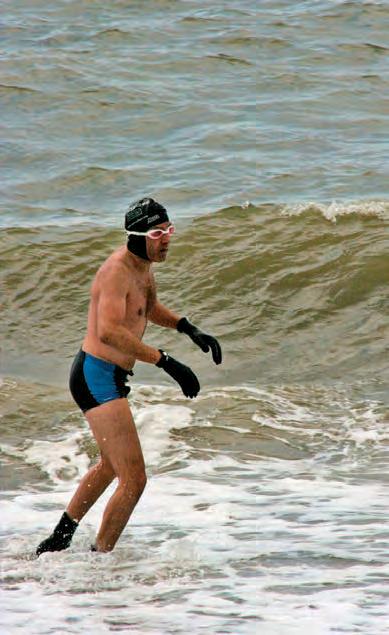
former Channel swimmer and a member of his local swimming club in Brighton, for her take on his plan. Her reply was simple: “Don’t be so ridiculous.”
Two weeks later, having convinced her he was serious, Rob was on Brighton beach with the club. He was lanky, lilywhite and terrified in a pair of Speedos.
“I was surrounded by people with proper physiques,” he says. “There were Channel swimmers, championship swimmers—I thought, What on earth am I doing? I had to walk in backwards, the waves were so high. It was absolutely freezing. I could hardly breathe. My goggles steamed up, my legs were flailing and I couldn’t do more than ten strokes.”

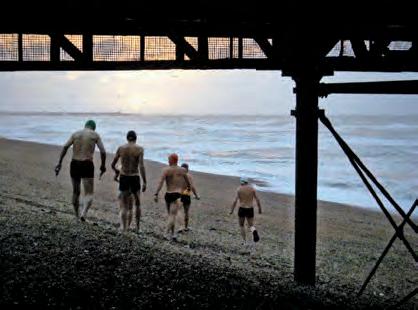
He lasted all of four minutes and retreated to his car. “I just sat there. It was petrifying at every level. I’d put a £1,000 deposit down on the pilot boat and told everyone I knew that I was going to swim the Channel.”
The second day’s training was worse, with waves so high Rob didn’t think he’d get back to shore. But by day four, the sea was calm and with the help of Fiona (who became his coach), he managed to swim around the pier. “I pretty much doggy-paddled the whole way,” he says. “But the sun was coming up and it was absolutely amazing. I thought, I can’t imagine not doing this again.” ►


Soon, Rob embarked on a weekly training regime that would test the toughest athlete, including five sea swims, four pool swims lasting up to eight hours, two gym sessions and two runs. He had to ignore the pain of an old broken wrist that, thanks to his osteoporosis, had never quite healed. And while his rheumatism didn’t cause problems when he was in the water, the next day he’d be limping and having to use his stick.
As winter approached, he found himself on the beach ankle-deep in snow, and he’d come out of the sea barely able to speak—an early sign of hypothermia.
“The tips of my fingers would go completely white and I’d have to sit in the car for 15 minutes before I could turn the engine on,” he recalls.
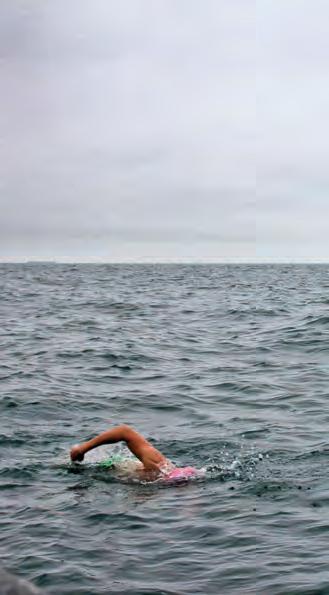
On one occasion, he got back to the shore and a dead body had been washed up next to him. Another time, the pains from his Crohn’s were so bad he was sitting under the pier scrunched in a ball when a tramp came up and offered him an open can of beer.
But, along with torn muscles and groin strain, one of Rob’s biggest problems was his diet. Although the chill of the sea water relieved the discomfort of his Crohn’s and he did all he could to try to replenish the calories lost in training, his weight dropped to eight stone, sending his energy levels crashing.
In June 2011, just a month before his big Channel adventure, things came to a head. A doctor told Rob that if he didn’t gain a stone in a month, he’d have to
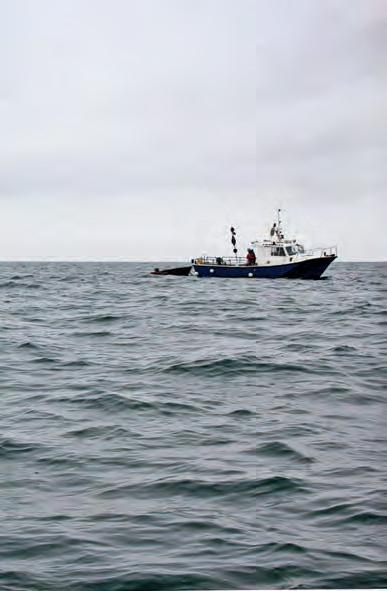
finish, each team member had to swim for an hour and stick to the same order throughout. Finally, it was Rob’s turn.
While he’d geared up for the cold, sporting just trunks (wet suits were not allowed), and with a flashing light, pink swimming cap and Vaseline in the appropriate places, one thing he wasn’t prepared for was the amount of diesel he’d encounter mid-Channel from all the tankers.
“I hit the water and my throat started to swell, my nose started to burn and I realised I had a nose bleed,” he says. “I could taste the diesel. It was acrid and the skin on my tongue was peeling off. It was agony.”

abandon the swim. Over the next few weeks, he tried everything, but ended up losing another half a stone. He was forced to pull out. “I was devastated. It was the first time I’d cried since losing my dad.”

But there was an alternative. Perhaps he could complete at least some of the challenge if he got a team together and crossed the Channel in a relay.
So on August 8, 2012, Team Starrfish, featuring five of Rob’s super-fit friends from Brighton Swimming Club, set off from Dover at 2.30am.
With gale-force winds, rain and the sea sloshing over the decks from start to
“The skin on my tongue peeled o . It was agony” ►
Beginning to feel woozy, Rob wasn’t sure he’d be able to carry on, but with the team boat too far away, no one was aware he was in difficulty.
“Fiona would have pulled me out straight away if I’d signalled, and we’d have all gone home,” he says. “But I’d organised this, I’d got the team here, I couldn’t be the one who couldn’t make it.”
Rob also had jellyfish and the huge
Rob also had jellyfish and the huge waves from tankers and ferries to contend with—“like swimming next to 12-storey hotels...it gets the heart going”—but he somehow found the strength to plough on.
Eventually, he heard the whistle and was able to get back into the boat and dry off. With five hours to kill before his next stint, he snacked on tea and Jaffa Cakes, his tongue stinging too much to manage even a sandwich.
As Rob’s second stint grew closer, he was dreading it. Despite almost two years’ training, he still doubted his ability. With Calais in sight, he knew his swim could take them close. Then suddenly the tide turned and he had to spend almost an hour swimming against it. His throat and tongue were still burning, but his biggest problem now was exhaustion.
“It was really choppy, I couldn’t see a thing,” he says. “At times the boat would be going west, I’d be going east and everyone would start shouting at me to come closer. I’d look up and the boat would be so far away, I’d think, One more wave and they’re going to lose me. You feel really exposed out there.”
Eventually, with the tide behind him, Rob got within half a mile of Calais and with teammate Lindy Dunlop swimming “like a mermaid possessed”, the team finally reached France in 12 hours and 55 minutes.
They were all too shattered for a celebration and darted straight back to Dover. “I woke up the next day and thought, Two years of my life and it’s done,” Rob says. “It felt more like a sense of loss than celebration. It’s only now, when I look back, I think, Wow, I did it.”
Rob raised more than £80,000 for the Starr Trust. Although his battle with Crohn’s made the swim harder, he believes it also made him stronger. “I think I only really took on the challenge because of the disease—to prove to it that I’m in control.”
In the past two years, Rob has also cycled Mont Ventoux, the most feared climb on the Tour de France route, and in 2015 he’s hoping to do the Arch to Arc
ironman challenge: a relay run from Marble Arch to Dover, a relay swim across the Channel and a 185-mile relay cycle to the Arc de Triomphe in Paris. “I can do these things, not despite my illnesses, but because of them,” he says.
“It still pains me to think I failed in my solo Channel attempt, but the swim taught me that if you’re heading in one direction and life decides to change your course, be big enough to see where it takes you. It also taught me that getting up at 6am and putting your face into a freezing sea is nuts!”
From Starr to Starrfish: A Non-Swimmer’s Quest to Swim the English Channel by Rob Starr, published on October 31 (£17.99). For more on the Starr Trust, visit starrtrust.com.
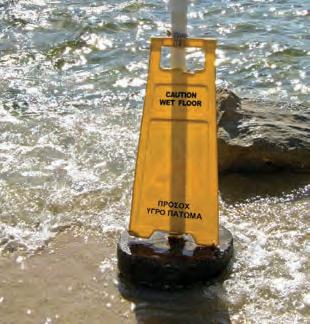
I snapped this while on holiday in Cephalonia in Greece
Many thanks to Katharine Tate from Hertfordshire for sending this in

At Bimuno® we understand that when you want to get on with your life, good digestive health is important.
Live life on your terms with Bimuno IBAID, a unique patented formulation, specially developed by international experts in digestive health.
Published scientific studies* have shown that some prebiotic Galacto-oligosaccharides, such as those provided by Bimuno, can help encourage and sustain a healthy level of your beneficial ‘good’ gut bacteria, helping you to maintain your intestinal comfort.
Try Bimuno IBAID soft chewy pastilles and feel the difference for yourself. Visit bimuno.com for more information.
Find us on or follow us on
Available from
*Studies on file. Bimuno IBAID is the result of nine years of intensive scientific research with the University of Reading. Bimuno is a food supplement. Food supplements are intended to supplement your diet and should not be regarded as a substitute for a varied diet and a healthy lifestyle. Bimuno® is a registered trademark which is the property of Clasado Inc for a Prebiotic Transgalactooligosaccharide.


Broadcaster Vic Marks says that commentators are as much to blame as managers and players for the lack of respect for officials in modern sport
It’s now so routIne that we barely notIce. the match Is over. The camera is running. A reporter thrusts a microphone in front of Arsène Wenger, Ian Holloway or Sam Allardyce and, looking for a bit of controversy, asks, “So what did you think of the decision to allow/not to allow that goal in the third minute?”
And off we go. The managers, caught up in the heat of the post-match moment, generally slag the referee off for some marginal or entirely justified decision. Then the studio pundits—following the lead of the match commentators— pore over their TV screens and, more often than not, the referee is slated for some other forgivable error. (“This replay clearly shows he’s offside by two inches.”)
Soon the phone-ins are underway. Fuelled by what they’ve already heard, the punters on the end of the line often compete with one another to see who can vilify the referee most outrageously, egged on by the radio host. Respect for the officials is the casualty, THinking diffErEnTly! ►

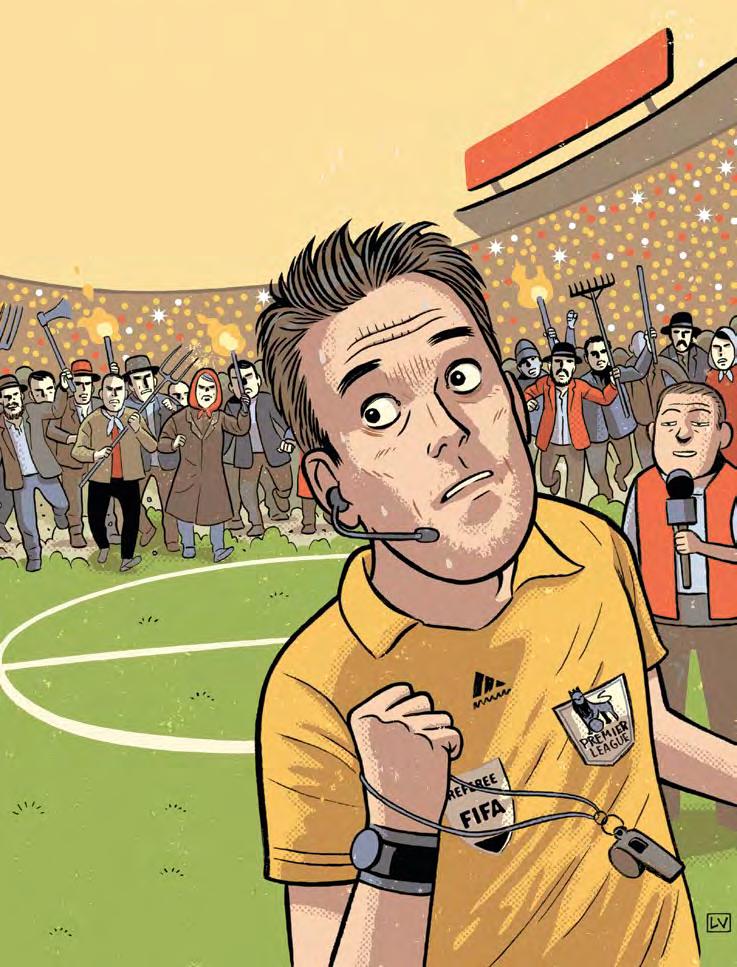
with players’ on-field behaviour inevitably influenced by what they’ve seen and heard in the media. And if referees can be abused in the Premiership, they can certainly be abused in the local park on a Sunday morning.
◄ to maintain respect for the officials and still make compelling programmes. Rugby union’s administrators have actually used the media to help the referee by giving him a TV microphone. This would prompt chaos and the mass pulling of plugs in football. Yet for 80 minutes we hear the rugby referee in constant communication with the players. He warns them as he senses an imminent transgression; he ticks them off if those transgressions come to pass and—knowing they can be heard by a wide audience—the players by and large nod respectfully and withdraw. Any backchat and they have to withdraw another ten yards. They do try to hoodwink the referee, but oh-so-politely.
But, although it’s the worst culprit, the football media is not alone in vilifying officials. During this year’s Ashes, the umpires were widely criticised for their implementation of the Decision Review System. Yes, they made mistakes. But some TV pundits went too far, calling them incompetent and, as the test series wore on, one could sense a little of this undermining of authority starting to rub off on the players and the way they spoke about officials—and certainly on the increasingly irate members of the public commenting on message boards and radio shows.
THE ExTrEME, provocaTivE rEacTion, ripE for rETwEETing, is sEEn as far MorE divErTing
Sometimes commentators and pundits are harsh on officials because they’re acting as cheerleaders for a national team, say, and it becomes “our brave boys/girls” against the rest of the grubby world. But another part of the problem is that punditry is a very competitive business, and too much measured reason doesn’t always make for the best broadcast in the minds of the hirers and firers. The extreme, provocative reaction, ripe for retweeting, is seen as far more diverting—even if it strays a little from the truth.
But it’s entirely possible for the media
medIa technology can help the behavIour of players, managers and spectators towards officials in other ways. Remember the impassioned rants of tennis stars Ilie Nastase and John McEnroe in the 1970s? We might look back at them fondly as sepia-tinted memories, yet they were more tiresome at the time. But the Hawkeye system ends most of the arguments now. TV replays often show that a football referee has got a tight call correct too, yet how often do the post-match interviewers pluck up the courage to contradict managers who claim he’s made a howler and say, “Actually, Arsène/Ian/ Sam, the replays show that it was a foul”?
Of course, replays sometimes show
the referee made a bad decision and commentators must relay the facts. But there are ways of going about this.
One positive example is David Lloyd—“Bumble”—of Sky Sports. He’s done everything in cricket; he’s played, coached and, most significantly, he’s umpired. He knows how difficult a job it is. He doesn’t ignore officials’ mistakes, but he offers the sympathetic view.
Similarly, BBC rugby commentator Bill McLaren would invariably interpret foul play (it might be a little innocent gouging or punching) as “a bit of argie
Vic Marks is a radio commentator on the BBC’s Test Match Special, a former England cricket international and a writer for The Guardian. Do some commentators encourage bad behaviour? Join the debate at facebook.com/ readersdigestuk or email readersletters@ readersdigest. co.uk
bargie”, but the referee’s decision was gospel. On Test Match Special , most of us operate by a similar code— with officials supported wherever possible.
It’ll take more than an influx of similarly fairminded and restrained broadcasters to reverse the trend towards officials losing respect in modern sport. But it might help. n
When it comes to describing certain people, experiences or things, the English language sometimes falls short. Step forward betterthanenglish.com, which posts words and phrases that don’t have direct translations:
YaourTer (French): Literally, “to yogurt”— trying to speak or sing in a foreign language that one doesn’t know very well.
Nakkele (Tulu, spoken in India): A man who licks an item that food has been served on.
BarSa (Chilean Spanish): A person who acts in a shamelessly cocky and annoying manner towards strangers—the type who walks into your home uninvited, immediately opens the fridge and starts eating.

ViiTSiMa (Estonian):
A feeling of laziness and disinclination towards being “bothered” by anything, when you don’t want to work, go anywhere or do anything specific.
DoNalDkacSázáS (Hungarian): Translates as “Donald Duck-ing”—wearing a shirt but no trousers nor underpants at home.
TSuNDoku (Japanese):
The act of leaving a book unread after buying it, typically piling it up together with other unread books.

so what’s life really like in...

yes, there are wars, extremist groups and human-rights abuses. but to understand these 22 countries properly, you need to go behind the stereotypes. here’s how...

Despite all the conflict in the region, the 22 Arab countries across the Middle East and North Africa have a close collective identity, thanks largely to the unifying power of language. Spoken dialects may be very different from state to state, but written Arabic is exactly the same no matter where you are because of the influence of that most important Muslim text, the Koran.
Ironically, given some of the nations’ uneasy relationship with Israel, Arabic is a Semitic language like Hebrew, and the alphabets are very similar— although Arabic is written in joined-up writing.
There are 26 letters, but they can change their shape up to four times according to their position in the word. Short vowels are not written, so you have to guess at many words according to context. This is something that comes easily to Arabs, but makes learning the language tricky for foreigners. For instance, Amman, the Jordanian capital, and Oman, the country, sound very different but are spelt in exactly the same way.
The average British tabloid reader is said to have a working vocabulary of 3,000 words, while their 1 ►
Arab equivalents have 10,000, a testimony to the expressiveness of their language. Arabic lends itself comfortably to poetry and persuasive rhetoric: a public speaker, such as a politician or prayer leader, can sway crowds—many of whom will be illiterate—in a very powerful way. Saddam Hussein and Colonel Gaddafi were particularly adept at this.
Arabs instinctively use colourful proverbs, complete with rhymes and subtle plays on words, as part of everyday speech. More than 4,000 have been recorded in one small Levantine village alone. The translations don’t do them justice, but here’s a brief selection of Middle Eastern favourites:
“Destiny caresses the few and molests the many.”

“He who takes a donkey up a minaret must bring it down again.”
“If you are patient in a moment of anger, you will escape a hundred days of sorrow.”
“For the birds that cannot soar, God has provided low branches.”
The call of the crowds during the Arab Spring was for karamah, “dignity”, and pride and honour are very important to Arabs. But their effects are both positive and negative.

Rates of theft, rape and assault are traditionally lower in Arab societies than in the West, partly because of severe punishments, but also because no one wants to shame their family. However, this intense concept of honour can also lead to feuds between clans and nations that last for generations. The civil war in Syria and disorder in Iraq, for example, risk shredding communities with revenge killings for years to come.

“who has seen toMorrow?”
As this popular Arab saying suggests, time is most definitely not money in the Middle East. While that can be very frustrating if you need to get lots done during a short visit, it can also help you relax and unwind.
Patience, “the key to happiness”, is a virtue prized above all others, and you will need to cultivate it in yourself if you’re to do business successfully. Conveying impatience will bring an instant loss of respect in a region where personal relationships are felt to be far more important than how long it takes to complete a deal.
The Arabic use of tenses reflects this approach to time, as there is no strict future tense, just the past and the present. Only two distinctions are thought worth making: either something has happened or it hasn’t. Our complicated ideas of “would”, “should”, “could” and “might” are deemed unnecessary.

4

“a guest is a guest, even if he stays all winter anD suMMer”
Arab hospitality is rightly legendary—and both of us have experienced it. In 1974, John walked the mountains of Syria as a penniless student planning to camp. Instead, every night local villagers insisted he stay with them. One mother even burst into tears at the thought of what his mother must be suffering in his absence.
So strong is the tradition of honouring guests that your host may feel obliged to give you anything of theirs that you’ve praised. Staying with a Bedouin tribe as a student, Diana said she liked their white baby camel. When a feast was served later, the camel was nowhere to be seen.
Admittedly, this tradition is now under severe strain from war refugees in countries whose resources are already stretched.

5
soMeone’s watching Me Superstitions are very much part of the culture. The commonest is the “evil eye”, a concept going back to Roman times, where a particular malevolent look is thought to bring misfortune to the person at whom it’s directed. People hang ceramic eye talismans in their homes, cars and offices to dispel evil.
It’s thought that gazing at something in admiration may accidentally cause harm too. This is why the Evil Eye is often portrayed as blue, because foreigners are more likely to have blue eyes and to have a habit of staring. Another good luck charm (see left) is the so-called Hand of Fatima—the prophet Muhammad’s daughter—often used as a door knocker to protect the house and its occupants. Belief in jinn (“genies”) is also common—they are mentioned in the Koran. These invisible spirits can be good or evil. ►





7
chilDren welcoMe here Arabs adore kids and one of the first things you’ll be asked is how many you have. The more the better, so if you don’t have any, you might consider inventing some to avoid pitying looks and questions as to why.
Parents often go out late to restaurants with quite small children, who’ll be expected to amuse themselves and eat the same as everyone else. Adults, especially mothers, are very physically affectionate to youngsters and the idea of leaving them behind with a babysitter is thought alien and almost barbaric.
sheep’s eyes anD belching
There have been some amusing Western misunderstandings of Arab etiquette. For a start, it’s not true that it’s polite to show you’ve enjoyed a meal by burping. The reason for this myth is probably that the Arabic word shaba’t can sound a bit like a belch. In fact, it means “I have had enough”, a courteous way of declining a further helping. And sheep’s eye is not an Arab delicacy.
The origin of this belief is said to be a British diplomat invited to dinner by a tribal sheik. The sheik showed him the eye of the sheep he was about to serve so that his guest would know the meat was fresh. Thinking he was being offered a prized treat, the diplomat ate it out of politeness. The courteous sheik didn’t want to correct and embarrass the Brit, so he ate the other eye himself.


8
The Arab Spring was triggered not just by the oppression of despotic regimes, but also by a demographic time bomb.
Around 60 per cent of the 350 million people in the 22 Arab League countries are under 25, and of these at least a quarter are unemployed. Under-occupied young people are always good candidates for starting revolutions, and many young Arabs have had access to

9


education. They’re highly technologically literate and use YouTube, Twitter and Facebook as means of communication that are (for now) beyond government censorship.
Arab culture and Islam encourage the segregation of the sexes to an extent probably greater than has ever been the case in the West, but that does not mean women are without influence. More women than men now graduate from Arab universities and they can drive everywhere except Saudi Arabia. On marriage, women don’t take their husband’s surname but keep their own—and they often control the finances in the home.
John Mchugo is an author, lawyer and Arabic linguist who’s lived in the Middle East for more than 20 years. His book A Concise History of the Arabs (£20) is out now. His wife Diana Darke has written guide books on Syria, Jordan, Tunisia, the UAE and Oman.
The challenge for governments who want to maintain the current political order is to give youngsters meaningful roles in innovative, job-creating new areas.
As the population and urbanisation both grow, the Arab world is experiencing an accelerating water shortage that could cause future wars. Rivers such as the Nile, Tigris and Euphrates are not inexhaustible and droughts have always afflicted many areas where agriculture is reliant on rainfall. Technology such as desalination, the discovery of subterranean rivers and the unlocking of fossil water resources may come to the rescue, but it is likely to be a close call. n

10

Welcome to the pages that help make life simpler, easier and—we hope—more fun! EvEryonE should know
In most cases, counting to ten really does work. A brief pause gives us just enough time to regain a sense of proportion, remember not to take things personally or even (gulp!) acknowledge that we’re not always right. But for some people, it’s not enough.
“Most of the clients I have are successful business people who use anger to intimidate others,” says Mike Fisher of the British Association of Anger Management. “Eventually it gets out of hand, and colleagues and family tell them they have to change.

“Around 20 per cent of my clients, by contrast, are angry because they’re not successful—but feel they should be. They often internalise their anger and become depressed.”
So it’s not just the victims of our rage who suffer: feeling constantly angry is bad for all of us. One in five relationships breaks down because of problems with anger; angry men are three times likelier to have heart disease than those who are rarely riled.

To reduce anger levels, Fisher suggests monitoring stress and prioritising our own needs when we feel under pressure. “It’s not selfish, it’s self-preservation,” he says. Avoid using aggressive language— swearing for sure—but also blaming others, interrupting and shouting.
“Instead of ‘why don’t you/you never/you should’, say ‘I feel hurt or angry’,” says Fisher.
“It’s important to admit how you feel, so don’t pretend everything’s fine when it’s not. And if that’s not enough, walk away before you do something you’ll regret.”
It’s tricky all right, and not just because picking the wrong paint, hair dye or winter coat can be an expensive mistake. Colour works at a subconscious level, altering mood and appetite, luring us into shops and even raising our blood pressure. No wonder it has a role in:

● Tense situations Pick bubble-gum pink for an important meeting because it makes people calmer. “Pink has been used for cell walls because it makes prisoners easier to manage,” says Stephen Westland, professor of colour science and technology at Leeds University and the author of the blog Colour Chat. “The University of Iowa has even painted an away changing room pink, to make the visiting team less eager to win.”
● Car safety Yellow gives high visibility—one reason it was chosen for American school buses says Westland. But safety comes way down on our list of priorities, because the current favourite car colour is hard-to-see silver.

ate nights Ladies in red are seen as sexier, one US study has found—prompting men to splash the cash.
dieting Buy red china. Recent research shows we eat less when food is served on red plates rather than blue.
● Gift wrap Blue packaging makes items look pricier, French research has discovered. Purple is also associated with luxury—possibly through folk memory.
“The original purple dye was more expensive than silver,” says Westland.
For details of courses and free online workshops, go to angermanage.co.uk.
● Competitive sport Forget Wayne Rooney—Manchester United’s success may stem from the colour of their strip. From football to taekwondo, contestants are more likely to win if they wear red, which increases heart rate and testosterone levels, according to research at the University of Sunderland. ►

Sit back and ignore them and they’re likely to shrink. This is why the government-backed Money Advice Service (moneyadviceservice.org.uk). recommends you regularly review your savings to make sure you’re getting the best return. First, check how yours are performing; then consult Savings Booster on which.co.uk to see if you could do better. Once you’ve got a six-months’ crisis fund, plus enough for shortterm goals, invest the rest. If you’re saving for five years or more, you need to make your money grow.
how to stretch your savings how to create a wifi hotspot

A graph from the Money Advice Service shows that over the past 15 years, UK shares have outperformed building societies by almost 600 per cent. If you’re ready to play the stock market, a good place to start may be a low-cost tracker fund, which uses computers to follow shares’ performance. Too scary? Think about bonds (fixed-term loans to countries or companies) that pay interest and refund your capital. Gilts (UK government bonds) are the least risky but if interest rates stay low, the returns may not keep pace with inflation.

The secret is to diversify, says the Money Advice Service, so mix shares with bonds and cash, making sure that all your investments and advisers are regulated by the Financial Conduct Authority. Some could also go into property and other assets—which is where you can have fun. A windfall could fund a wine cellar or mini art collection, but even toys can have value. “Buying action figures, Elvis memorabilia or Ladybird books for the long-term means you can enjoy them while they increase in worth,” says RD financial guru Jasmine Birtles. As long as you remember that the price of Xena, Warrior Princesses can go down as well as up.
Want access to Wi-Fi on your computer away from home without spending a fortune in Starbucks? If you have a smartphone and a decent signal, the answer’s in your pocket. By “tethering” your phone to your laptop or tablet, you can use the mobile network to get online and use a proper computer keyboard and screen instead of the miniature version.
Start by clicking “tethering” or “personal hotspot” in your phone’s settings. (If it’s not there, bad luck—your tariff may not allow it.) Then go to your other device and select the Wi-Fi code that pops up on the connections menu. Enter the password given by your mobile, and you’re away. Just keep an eye on the clock, because you’ll be using your monthly data allowance. Though the average of 500MB is enough to surf 5,000 nofrills web pages, watching You Tube, checking Facebook and any automatic updates will gobble it up, leaving you with a bill far bigger than you’d have in any coffee shop.
Six million people in the EU limp to hospitals with sports injuries every year—and they’re not all rugby players. Most, in fact, have been working out on their own.
“There seems to be an epidemic of people on a mission to destroy their bodies,” sighs personal trainer Greg Brookes of gbpersonaltraining.com, who’s come up with this list of exercises to avoid.
>1st running A force three times your weight pounds through your legs with every stride and unless your muscles are strong, your joints feel every jolt, says Brookes. It’s much safer to walk uphill as fast as you can, taking a breather when you need one.
>2nd sit-ups
Not only can they strain the lower back but they reinforce the tendency for your spine to bend forward, which accelerates with age. Swap them for
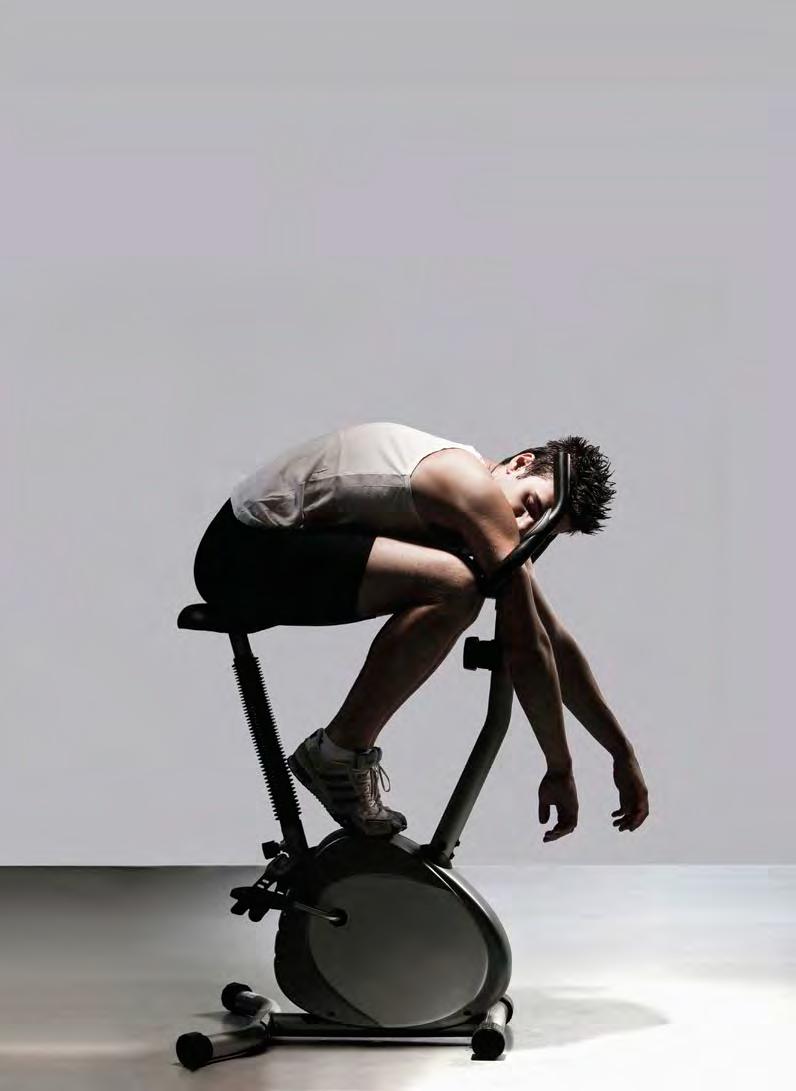
“the plank”: supporting your weight on your forearms, pulling in the abdominals and keeping legs and spine in a straight line to strengthen your core.
>3rd Tricep dips Supporting your weight with elbows bent puts the shoulders under tremendous strain, says Brookes. He recommends press-ups to tone the chest and arms—on your knees or against a wall if you find them hard.
>4th dumb-bells Struggling to lift weights often means cutting moves short, which contracts the muscle instead of lengthening it. Use your bodyweight instead—with lunges, press-ups and squats. Or you could try Pilates with resistance bands to improve both muscle and bone.

Apart from a brave late rose, the borders are a tangled mass—and the temptation is to lop the lot. Resist it, says Helen Yemm, author of Gardening in Pyjamas. “This isn’t a time to prune; unless you know what you’re doing, you risk losing next year’s flowers.”
The one task never to skip is raking up leaves. “Rotting foliage is a duvet for slugs and snails,” says Yemm. Store the leaves in a bin bag with holes in the side and by 2015 you’ll have a supply of soil-enriching leaf mould.
If you’re leaving tender plants such as dahlias, protect them with dry mulch—Yemm suggests bracken or straw under garden fleece. Tropical beauties such as agapanthus (African lily) need extra coddling: wrap the crowns in fleece or bring them inside.
Finally, think how you’d like the garden to look next spring. Move plants now while they’re dormant and settle in new roses, trees and shrubs. Then spend an hour or two planting tulips, and look forward to a dazzling display when the garden wakes up again.
what your local councillor won’t tell you
● don’t moan to me about footpaths unless I’m a town or parish councillor (we deal with the paths and parks). If you have a problem with council tax or housing, get on to the borough or district council—and if it’s to do with planning, education or social care, you need the county or city council. Of course, none of this applies if you come under a unitary authority that supplies all services, big and small.
● I don’t get paid for this you know. But I do get an allowance, ranging from £1,500 to almost £17,000pa, plus extra for any special responsibilities.
● shame you didn’t spot the new bus lane. We put up notices two weeks ago and advertised it in the local press as we’re obliged to do. If it’s any consolation, your £100 fine will be spent improving the roads.
● I’m a member of the cabinet. Like parliament, large councils have a cabinet made up from members of the largest political party. Committees can advise us and backbenchers ask questions, but we’re the ones with clout.
● here’s a shovel. People expect us to clear snow, litter and dog mess, but don’t rely on it. The budget’s so squeezed it might be quicker to do it yourself.
● I can help if you’re short of cash. Councils are responsible for paying housing benefit—if you think you might be eligible, do get in touch. The amount I can pay is set by central government, so please don’t blame me for the spare-room tax.
● It’s all about the hat and chain. Being lord (or lady) mayor is usually ceremonial. The only mayors who have real power are the 16 elected by the public —like Boris.
● don’t mess with the tree wardens. They enforce the tree preservation orders that make it an offence even to trim a protected tree without consent. And if you cut it down, you’ll face an unlimited fine.
● Junk mail makes us money. Selling details from the electoral register brings in some useful cash. In the past five years, 300 councils have made money this way. If you don’t like it, remember to tick the opt-out box when you fill in the form.

● Psst...want a cheap MoT?
The centres that service our vehicles are open to the public. Unlike garages, they rarely do repairs so they don’t have a vested interest in seeing you fail.
● Providing a library service is something we’re obliged to do, but there’s little to stop us cutting opening hours, handing libraries to volunteers, or running them from a van.
● If I hurt your feelings, I’m in trouble. It’s one of the grounds for complaint accepted by the Local Government Ombudsman (lgo.org. uk). But don’t ask for help just because you disagree with a council decision. Ombudsmen intervene only if the process is flawed.
● Think you could do better? Then try taking responsibility for planning, schools, social care, rubbish collection, fire safety and trading standards, all in your spare time. You’ll also need to get involved in politics because only five per cent of councillors are independents. Still keen? Then go to beacouncillor.org.uk— and good luck. n
max pemberton
Being a doctor is a real eyeopener. While I’ve met some fascinating characters, heard some amazing stories and come into contact with patients from all walks of life, one of the things that’s surprised me most is how rude some people are.
In the “good old days”, I’m told by my consultant Dr Pugh, everyone was polite. I don’t know when the good old days were exactly, but I find this hard to believe. I suspect that what he actually means is people were polite to doctors.
We live in a more tolerant and open society than we once did —which I’m pleased about—but I can understand why Dr Pugh looks back on the time he started working with nostalgia. “People respected doctors. We were looked up to. Ah, the good old days,” he reminisces.
When he trained, the NHS must have been in its infancy. For the first time ever, people were

People seem to feel the need to be aggressive

being given free access to health care, regardless of income or social class. That must have been an astonishing thing. The public were grateful because within living memory going to a doctor had been seen by many as a luxury. Now, suddenly, it cost nothing—and doctors were seen as the custodians of this brave new world. It must be hard for the generation trained in this environment of unquestioning respect and gratitude. Particularly when faced with the likes of Mrs Wyatt and her family.
“Mrs Wyatt’s family are in a really foul mood. They want their mother to have a side room,” says the nurse who has come into the doctors’ room.
“What can I do? I’m not the bed manager,” I reply wearily.
“They want to speak to a doctor, Max. They’re threatening to make a complaint.”
I sigh. It’s unfair, but sometimes the
people who shout the loudest get the most attention, whether they need it or not.
“Are you the doctor?” asks Mrs Wyatt’s son before I’ve had time to introduce myself.
“Yes,” I smile.
“Dr what?” he snarls.
“Pemberton,” I reply and continue to smile as best I can.
They launch into a list of gripes about their mother’s care. What this amounts to is that she doesn’t like the food or the people she shares a ward with. I believe that a doctor’s actions should be open to scrutiny, that people have the right to question us. That isn’t the problem. It’s the way they do it that gets me. Even people with perfectly reasonable questions seem to feel the need to be aggressive. Perhaps it’s because people have stopped being patients and started being consumers.
I spend half an hour with the Wyatt entourage, apologising and explaining that there isn’t a side room available—and that even if there were, Mrs Wyatt wasn’t sick enough to warrant being given one. They narrow their eyes and prod their fingers at me and threaten to make a complaint and I’ve wasted 30 minutes with not so much as a thank you.
Bring back the good old days.
Max Pemberton is a hospital doctor and author. He’s also the resident doctor on ITV’s This Morning.
the myth? You SHoulD DRINk AT lEAST EIgHT glASSES oF WATER A DAY medical myths— busted!
This myth is so pervasive and ingrained that doctors even pass it on to their patients. Yet it’s not true: there’s not a single shred of evidence that suggests you need to drink that much water. In reality, we get most of the fluid we need from the food we eat.
Where did the myth come from?

It’s thought that the first reference to the supposed need was made by the Food and Nutrition Board of America’s National Research Council in 1945. Back then, they said that adults should consume four pints of water a day (about eight glasses). They also said, however, that most of this would come from food. The first part stuck; the second part didn’t.
so there’s nothing to Worry about?
It’s still important to ensure that you’re adequately hydrated, but slavishly sticking to eight glasses a day isn’t a very helpful way to do it. There are times when your body needs more fluid—when you’re exercising heavily for example—and times when it needs less. The best way to keep track of whether you’re hydrated enough is to check the colour of your urine. If it’s dark, drink more; if it’s very dilute, you can drink less. The ideal colour is light straw coloured. ■










If your days out are being ruined by too many visits to the toilet you may be su ering from an overactive bladder.
Over 7 million people in the UK su er too, so you’re not alone.
Luckily there are treatment options available including e ective medications from your doctor.
To find out more about overactive bladder and the help available visit
www.bladderproblem.co.uk
Or call our free helpline on 0800 011
4766














Once you hit your twenties, the speed of your metabolism —which affects the rate at which you burn calories —drops by two per cent every decade. But it’s possible to give it a boost. Try these simple strategies:
Drink to your health: speeding up the rate at which you burn calories needn’t be hard work
Can eating less slow down the ageing process? A Yes. Studies have shown that people on calorie-restricted diets have substantially lower levels of inflammatory proteins in the blood. The more of these substances that are circulating in your bloodstream, the more quickly your body will deteriorate.
1. Sip coffee or green tea. Your morning caffeine fix gives your calorie burn rate a fillip for up to two hours. Drinking green tea frequently is also thought to accelerate weight loss.
2. Check your thyroid. If you’re struggling more with your weight than you used to, ask your doctor to test this critical metabolic gland.
3. Get enough shut-eye. Less than seven hours’ sleep messes with your metabolism-regulating hormones. And if you’re sleepdeprived, you process carbs less efficiently, upping the risk of obesity and diabetes.
4. Drink iced water. Drinking ice-cold water increases metabolism because your body uses energy to warm it up.
5. Pump up your muscles. The more lean muscle you have, the more calories you’ll burn all day. Strengthen large muscle groups,
such as in your thighs, by doing lunge exercises, using the stairs at work and walking uphill.
6. Pack more protein. A 2012 study in the Journal of the American Medical Association found that people who ate more protein had a higher resting metabolic rate. So try to have lean protein such as fish, chicken or eggs with every meal—or enjoy such protein-rich snacks as a handful of almonds.
7. Spice up your life. The capsaicin in chilli peppers stimulates the nervous system and improves metabolism after meals. Chilli does this best if eaten regularly, so turn up the burn!


The classic diabetes symptoms for everybody are drinking a lot, peeing a lot, tiredness and the slow healing of cuts. But there are some symptoms that affect only men. They include:
l Reduced strength because of loss of muscle mass.
l Recurrent thrush around the genitals.
l An itchy penis.
l Difficulty getting an erection.
Find out more at diabetes.co.uk/diabetessymptoms-in-men.html
Do you have aches, tingling or numbness in the wrists and hands? If so, you could have carpal tunnel syndrome (CTS). This occurs as a result of pressure on the median nerve—located in the carpal tunnel, a narrow passageway in the wrist. Such pressure restricts the nerve’s supply of blood and may cause loss of muscle power or even atrophy.
Sudden causes include wrist injury, pregnancy and perimenopause. More gradual symptoms are usually due to a predisposing
condition, such as diabetes or rheumatoid arthritis. There’s also a suspicion that CTS is brought on by repetitive movements such as typing.
What can you do? You can help prevent CTS by gently stretching your forearms and wrists several times a day; checking the ergonomics of your workspace; ensuring that any inflammatory conditions, such as diabetes or arthritis, are under control; and quitting smoking.
If it does develop, you might need to see a specialist. Sleeping in wrist-supporting splints can work, as can steroid injections —but if there’s no improvement, you might need surgery.
►


Flora pro.activ Buttery. Proven cholesterol lowering never tasted so good.
Clinically proven to actively lower cholesterol by 7-10%*, with a rich buttery taste and creamy texture. Now, lowering your cholesterol doesn’t mean giving up the tastes you love.

www.floraproactiv.co.uk
l Do nothing Take ten minutes a day to do absolutely zilch. It’s harder than it sounds. Try it right now. Just sit (resist the urge to plan dinner). Set an alarm so you don’t have to look at your watch. Be content doing nothing. The reward is peace of mind that will spread to other parts of your day.
l Listen to some soothing sounds Need inspiration? Put on a favourite CD. Research shows that music can help slow down the heart rate and lower blood pressure.
l Stop clock watching
We’re constantly reminded of how little time we have to achieve things. This fuels frustration and we put ourselves under pressure to meet deadlines. Try to limit the number of clocks in your home and work area.
l Be old-fashioned Do things that are reminiscent of your grandmother’s era—grow potted herbs,
watch your mouth
do some sewing, write a letter, set aside an evening to prepare a traditional dinner for the family. Any of these ideas will slow your hectic life right down.
l Speak S-L-O-W-L-Y I’m not suggesting you annoy everyone by completely altering the rate at which you speak. But if you learn to pace yourself and think about what you say, you’ll eventually trick your brain into a calmer mood.

l Pooh-pooh perfection
Striving for it makes for massive stress. That’s why it’s important just to do your best and be satisfied with that. Whether you’re organising a dinner party or preparing a presentation for work, don’t fret about being flawless.
l Get organised Forward planning—you can’t beat it. Get into the habit of making to-do lists, shopping lists and even wish lists. Avoid procrastination by breaking big projects into small goals—and never be afraid to ask for help if you need it.
Did you know that mouth cancer kills more people than cervical and testicular cancer combined? But early diagnosis can give you a 90 per cent chance of survival. Check yourself for these symptoms and you could save your life:
1. Mouth ulcers that don’t heal within three weeks.
2. Red and white patches in the mouth.
3. Unusual lumps or swellings. n

If chronic constipation makes you feel like this



Then relief with Peristeen can make you feel like this

Have you suffered from severe symptoms of constipation, such as incomplete emptying of your bowel, discomfort and feeling generally unwell? If these symptoms have lasted for over six months, you’re not alone. There are an estimated two million people in the UK suffering from chronic constipation. Like many of them, you may have tried to improve the situation by making changes to your lifestyle, diet and even taking medication but found limited success. However, there is a different approach. Peristeen is an effective, predictable and dignified system, which can be used, routinely, in the privacy of your home. It’s available on prescription from your doctor. For an information pack call 0800 307 7984, or visit the website: www.my-bowel.co.uk

Putting you in control with Peristeen


Fighter pilots have to withstand huge G-forces in combat or they risk blacking out. This presented a major dilemma for flight researchers… and they spent a lot of money trying to solve the problem. Their research worked and the pilots were able to fly aggressively.
But they also found an amazing discovery. They discovered that some of the pilots now had lower blood pressure!
Curious researchers sought to find out why this was true. This research led to the development of the Zona Plus® therapy device, where the researchers discovered a unique ‘triggering point’ that multiplies the normal response of isometric handgrip exercise into substantial blood pressure drops.
Early research showed such a large blood pressure drop that doctors didn’t believe the small studies. However, as more and more studies were published they all showed similar results. Finally, after several years of results, the Zona Plus® is becoming accepted around the world. The clinical evidence just keeps getting better, with 15 independently published journal articles showing significant blood pressure drops in 95% of patients.*


“As long as I can remember I’ve always had elevated blood pressure. My blood pressure peaked at very high levels particularly in stressful situations. Being quite an energetic character I took it as God given. I did take my medication, but only reluctantly and not very consistently. Shortly after starting with my Zona Plus Therapy, my blood pressure dropped so quickly that I felt dizzy and had ringing in my ears. It turned out that my body just needed time to adjust to a lower blood pressure. Now my blood pressure is normal, I feel great and take better care of myself. Zona Plus helped me to finally achieve healthy blood pressure levels but also increased my resolve to do something about this disease.” Mr J Blattner
We all know aerobic exercise is good for the heart and typically drops blood pressure a little, but the Zona Plus® isometric therapy done just 12 minutes a day decreases blood pressure by two to three times that much. You can see a video at www.zonahealth.co.uk
The therapy produces physiological changes in the body, including improved endothelial function, nitric oxide production and improved vagal tone. The combined effect causes lower blood pressure.
The therapy takes just 12 minutes a day, five times a week, and your results are guaranteed.**
The Zona Plus® gives you the Power To Change® your life, try it enjoy the benefits.

QI took out the full damage-insurance waiver when I hired a car in France from a major firm. Yet I was still charged the total amount for repairs when I put diesel into its petrol engine, and it cost me a fortune. Is there anything I can do?
AEvery year, more than 150,000 people in the UK put the wrong fuel in their cars. I’ve done it myself, including just two months ago—and the standard rental agreement I’d taken out placed the full onus on me for my mistake.
Fortunately, I didn’t drive the car with the wrong fuel, but I had to pay nearly £250 to have it drained. So do note that while some damageinsurance policies contain a “wrong fuel” waiver, most do not.
Remember, too, that you can get better and cheaper insurance cover on a rented car by taking out the policy with other firms including some of the large national car-rescue companies.

Q
A year after I got my bathroom redone, the plumbing began to leak. When I called in another plumber, he told me the work was shoddy. I complained to the original trader, but he said I’d accepted the work and therefore there was no comeback. Is he right?
AIt’s true that you’re deemed to have accepted the work if you
People, it seems, are more attached to smartphones than to their family. In a playful survey of 30 people, every one of them paused before saying whether they’d prefer to be without a family member or their phone.
don’t complain soon enough—but that can only be from the time you find out about the faulty work. In the circumstances, you’re entitled to take the original plumber to court, but do get an independent expert to review his work first. If you paid by credit card, you may also be able to claim a refund that way if the trader flees.
More generally, always pay for work like this in instalments and get someone independent to inspect it before handing out huge amounts of money. Try to investigate all traders before they start working for you on the various trade-checking websites, and make sure that everything is written down and agreed in advance. Any changes to the work should also be agreed in writing to ensure that you don’t get conned in the end. ■
Donal MacIntyre is an investigative journalist and a former presenter of ITV’s London Tonight. Please email consumer queries to Donal: excerpts@readersdigest.co.uk


“I’ve decided to invest my money in property”
Pensions are so complicated, and yet so important, that we’re now devoting part of each Money column to a clear, no-nonsense explanation of the whole tricky business
Pensions are great because you get a tax break on any money invested—and because your money is locked away until retirement, stopping you dipping in to your savings. However, they can also be overly complicated and restrictive, so it’s worth considering the alternatives, either as an addition to a pension or even instead of one.
Individual savings accounts (ISAs). Tax-wise, these work in the opposite way to pensions: you don’t get tax relief on the money you put in, but there’s no tax to pay on whatever you take
out at the end. ISAs are also more flexible, because you can access your money as and when you like (subject to restrictions on fixed-rate or notice accounts).
The annual amount you’re allowed to put in rises with inflation every tax year. The current limit is £11,520, of which no more than £5,760 can be cash, although the whole lot can be put into a stocks and shares ISA.
Property. Investing in property is risky, but if you pay off your mortgage before you retire you can sell up and downsize, using the difference as your retirement income. Alternatively, you could take out an equity release product and use that money as an income. This can be useful if most of your money is tied up in bricks and mortar, but remember you are only borrowing the equity—the interest on it is rolled up over time and set against the value of the property. It’s then repaid, along with the loan, when the property is sold.
You could also buy another property purely to let, as long as the rent covers the new mortgage. There’ll be capital gains tax to pay when it’s sold and you need to bear in mind that house prices go up and down, so there’s a danger that you could reach retirement with negative equity. But if you get a property that rents well, it could bring you a decent regular income in retirement.
Stock market funds. The financial crash has made us all wary of the stock market, but if you’re prepared to take a punt, long-term returns on stocks have historically always beaten cash. When you buy shares, you buy a part of a company, so you only make money if they do. You have to pay 18% capital gains tax if you sell the shares, but there is an annual exemption of £10,100.
If you’d like to dip your toe in the water, start with cheap and easy index-tracking funds, offered by the likes of Legal & General, M&G, Virgin and Fidelity. These are run by computer and tend to have low management fees.
Save As You Earn (SAYE) schemes. If your employer offers a SAYE or “Sharesave” scheme—inviting employees to buy shares in the company—grab it with both hands. If the share price rises you can make money buying shares at a discount (of up to 20%) and cashing in immediately. If it falls, you get your money back, plus a tax-free bonus. Firms set their own guidelines but, typically, you can save from £5 to £250 per month, for three or five years.
This monTh’s bargain

All new customers can get 10% off and free p&p on shoes at Hotter.co.uk using our exclusive code HOTTER10. Hotter are famous for their stylish but comfortable shoes for men and women in a range of colours. Offer lasts until December 20, 2013.
November is Will Aid month, when a number of law firms draw up wills for people and give the money to charity. So it’s a great time to get your will sorted. Go to willaid.org.uk for details.
This is especially useful as more than 33 million British people don’t have a will in place and it’s estimated that one out of three people dies without one. Yet if you’re married, have a partner, have children, run a business or own property, a will is a must—for at least five good reasons:
1. It will help your family. No one wants their family and loved ones left with nothing in the event of an untimely death. A will gives them one less thing to worry about at a time of intense grief. (More on this overleaf.)
2. It will save money. Writing a will can save a ton of money on inheritance tax, which stipulates that if your estate is worth more than £325,000 any excess will be taxed at 40%. By sorting out its worth before you die, you can minimise the charge. Talk to your solicitor, as they will know exactly how to help you. ►
3. It will protect your family name. If you own a family business and want to avoid losing it to the wrong person, a will can ensure that the ownership will be passed down to whoever you want. Since we all know this can cause a lot of drama within a family, it’s worth specifying—and, if necessary, splitting—the ownership to avoid any confusion.
4. It’s not as expensive as you think. One reason people put off writing a will is the thought of the expense. In fact, a will is so important that you really shouldn’t let the cost deter you. Even so, if you prepare it enough on your own before meeting the solicitor, you can really cut down on fees—especially if they charge by the hour. You can even do one yourself for about £5 (pick up a DIY pack at W H Smith or from Amazon). Obviously, you’ll be doing it without legal advice, so be careful—but it’s a lot better than nothing.
the one thing you must do this month...

...is make the most of the winter. Yes, really! The nights are getting long so we might as well make the most of the dark. Instead of going out to the cinema, why not host movie nights for friends? For just £5.99 a month you can join Lovefilm.com or Netflix and watch movies or TV series whenever you want. Add in baked potatoes, traditional stews and even toasted marshmallows and hot chocolate to make it a cosy, and inexpensive, night in for all.
Nearly half of people aged between 55 and 64 haven’t made a will, with over a fifth having never thought about it.
5. You can plan your own funeral costs. Families are often saddled with the responsibility of funeral expenses. This can be very stressful for grieving loved ones, when a large bill is the last thing they want to have to think about. In your will, you can specify where you’d like your funeral to be held, whether you’d like to be buried or cremated and whether you want part of your estate to cover the expenses. Not only will this save your family money, but it will also save them time. They’ll also be put at ease knowing that they’re following your exact wishes.
This means you’ll leave your pension invested when you retire, and take a portion of the pot each year as an income instead of buying an annuity with it. It has the advantage of possibly leaving your family a legacy when you die as your pension pot (after a tax of 55%) passes on to them according to your wishes. You only have an income so long as you have a pension pot, though, so if you last a good long time you could empty it too early! All in all, it’s a risky way to spend your retirement. ■
Jasmine Birtles is a personal finance writer and the founder of moneymagpie.com

This dish makes good use of leftover apples, but make sure you use dessert apples, not cookers, which will lose their shape. You can also make the sauce with a dry white wine or a rich stock
1. put the oil and butter into a frying pan or flameproof casserole and heat over a low heat.
1tbs olive oil
15g butter
2 shallots
2 crisp, red-skinned dessert apples, 175g each ½tbs light muscovado sugar
2 boneless, skinless chicken breasts, 175g each 150ml dry cider
1–2tsps worcestershire sauce
2tbs crème fraîche
salt and black pepper
the heat to fairly high and fry until the mixture starts to turn a golden colour.
2. peel and chop the shallots. add them to the oil and butter in the pan or casserole, increase the heat to moderate and fry, stirring occasionally, for 3–4 mins.
3. while the shallots are cooking, rinse, dry, quarter, core and slice the apples, then add them to the shallots and sprinkle with the sugar. raise
4. lift the shallots and apple slices from the pan or casserole with a slotted spoon and set aside.
5. add a little more oil to the pan, if necessary. add the chicken breasts and fry over a fairly high heat for about 6 mins, turning once, until golden.
6. pour the cider over the chicken. bring to the boil and simmer
uncovered for about 8–10 mins, stirring occasionally and turning the chicken again, until cooked. the chicken is ready if the juices run clear when pierced.
7. when the chicken is ready, stir in the worcestershire sauce and crème fraîche, and season to taste. return the shallots and apple slices to the pan and warm through for another 1–2 mins, but don’t allow the sauce to boil. ■




Q There’s a space at the end of my garden that I intend to fill with a new tree. How can I make sure it takes root?
A
First, dig a hole large enough to take the roots comfortably when spread out, and check the depth so the soil mark on the stem is at ground level. Then drive in a vertical stake 3–4ins off-centre and on
the lee side, away from the prevailing wind.
Hold the tree upright in position, spread a few trowels of planting mix over the roots and gently shake the tree up and down to settle the mix in place. Repeat this procedure and “firm” the tree lightly. Half fill the hole and tread firm. Check the tree is at the correct depth and adjust if necessary by adding or removing soil.
Back-fill the hole, firm again and level the surface. Attach the tree to its support with an adjustable tie fixed near the top of the stake.
Q
My hedge is starting to look neglected. When and how should I go about pruning?
A Overgrown deciduous hedges, such as beech, hornbeam and hawthorn, should be cut back between autumn and the end of winter during frostfree weather. This restores their shape and fills in bare patches. Using shears, prune the hedge evenly all over to 4–6ins less than the ultimate finished size—this allows room for dense regrowth. To reduce the size more severely,
cut back one side now and wait for a year before you cut the other side. Feed in early spring to support new growth.
QMy neighbour tells me I should be insulating my greenhouse at this time of year. Any tips?
ADouble glazing is the most efficient way to conserve heat, but it’s expensive. A far cheaper method is to line the greenhouse with a skin of clear polythene sheeting, pinned to the glazing bars or attached with special plastic clips to leave a one-inch air gap. This can save 30% of the heat lost. By using bubble plastic, this increases to 40%. Thicker materials save even more heat, but reduce light levels proportionally.
Q
Why is “mulching” important? Apparently I should be doing this between autumn and spring.
A
Mulch that’s about 2–3ins deep—consisting of composted bark, cocoa shells, garden compost or well-rotted manure—keeps the soil warm while repelling slugs and snails. Be sure to clear weeds first, and cover plants with an upturned flower pot or other container when applying a mulch on your beds to stop them getting covered.

l Leave faded flowerheads on hydrangeas until early spring to protect their young shoots from severe weather.
l Lift pelargoniums, argyranthemums and other tender bedding perennials before the first frosts, and pot up or take cuttings ready for overwintering indoors.
l Gather and dry seeds of favourite and unusual plants to store for spring sowing.



Send your gardening questions to excerpts@readersdigest.co.uk
Not much garden space? Then use large builders’ bags or animal-feed bags from farmers to plant potatoes or other vegetables. ■ Many thanks to Christine Herrington of Lancashire for sending this in.
Email your gardening tips and ideas—with photos, if possible—to excerpts@readersdigest.co.uk. We’ll pay £50 if we use them on this page.

Home. It’s important to our identity, our independence, our wellbeing. Most people would like to stay in their own homes for as long as possible. But as we grow older, health problems can be a worry and sometimes it’s a struggle to keep up with repairs or pay the bills.
When you donate your home to Age UK through the Gifted Housing Service you’ll enjoy all the benefits of home ownership without the anxiety. Set up 35 years ago, this unique scheme helps you live in your own home for longer.
To request our leaflet please call: 0800 389 5295 or 01225 447800
Under the Gifted Housing Service we will:
• cover the cost of Council Tax, water rates and buildings insurance
• arrange and pay for most maintenance, upkeep and improvements with your agreement
• help arrange and pay a contribution towards your care at home or elsewhere should you need it
• provide support to help you stay in your home for longer.
Or write to: Age UK Gifted Housing Service, FREEPOST (SWB10997) Bath BA2 3ZZ, quoting RDOCT13 www.ageuk.org.uk/gifted-housing

Felmersham Road, Radwell MK43 7HS

Our latest park is a truly unique and exclusive development of 11 stylish luxury new bungalow style homes with outstanding views across the countryside in the sought after location of Radwell, Bedfordshire.
• This park is ideal for the over 45’s who are seeking, to downsize and release capital and appreciate a stylish lifestyle, in a high quality luxurious home with the very latest technology.
• Stunning panoramic views over the beautiful surrounding countryside, but still in easy reach to local facilities.
• Near the County town of Bedford which is a bustling cosmopolitan town with quality shopping, theatres, cinemas and restaurants to cater for all tastes.
Parklife Group
Open weekends:
Takeley Park - 19 & 20 OCT
Takeley Park, Takeley, CM22 6TD
Wickham Court - 19 & 20 OCT
Fareham, Hants PO17 6JS
Westgate Park - 19 & 20 OCT
Westgate, Sleaford, NG34 7QP
Grosvenor Park - 19 & 20 OCT
Ripon, Yorkshire, HG4 1UF
Truro Heights - 26 & 27 OCT
Kenwyh Hill, Truro, TR1 3DY
Tregatillian Park - 26 & 27 OCT
St Columb Major, TR9 6JL
Thornlea Park - 26 & 27 OCT
Littlehampton, West Sussex BN17 7QD
Hedge Barton Park - 26 & 27 OCT
Fordcombe, Tunbridge Wells, Kent TN3 0SL
Radwell Court - 2 & 3 NOV
Radwell, Bedfordshire, MK43 7HS
Folly Park - 2 & 3 NOV
Clapham, Bedfordshire MK41 6AL
Peppercorn Park - 2 & 3 NOV
Clapham, Bedfordshire MK41 6HB
Rymer Point Park - 12 & 13 NOV
Barnham, Nr Bury St Edmunds IP24 2PY
Waterbeach Park - 12 & 13 NOV
RADWELL OPEN: MON, WED & FRI 10.00 - 3.00

PLEASE CALL 01234 782276 IF YOU PREFER AN ALTERNATIVE DAY


• There is a regular bus service to and from Bedford and surrounding villages approximately every 30 minutes with a stop not far from Park entrance. LINES
Denny End Road, Waterbeach CB25 9PF
Cotswold Manor - 12 & 13 NOV
Stratford Bridge, Ripple, GL20 6HE
Cheltenham Spa Parks -12 & 13 NOV
Bamfurlong Lane, Staverton, GL51 6TD
Regency Court - 12 & 13 NOV
Allhallows-on-sea, Rochester, ME3 9TD
We have over 50 parks across 17 counties.
Part Exchange Available:
Solicitor and Agents fees paid.
Part Exchange Example:
Park Home Price: £129,950
House Price: £200,000
Cash to you: £70,050


People love Alfa Romeo beyond all reason. People like me. Alfa’s history is a complex mish-mash of fabulous racing cars and occasionally terrible road cars. But it’s a brand that delivers cars with true soul. Jeremy Clarkson says you can’t call yourself a real car fan unless you’ve owned an Alfa, and I agree. The company emerged
Anonima Lombarda Fabbrica Automobili (literally Lombard Automobile Factory, Public Company) or ALFA, and soon became a name to be reckoned with. By 1915 it was under the direction of entrepreneur nicola Romeo, and since the end of the First World War Alfas have been synonymous with style.

The Graduate sweeping through the hills in his Alfa Spider (above). Recently I travelled to Alfa’s famous Balocco test track outside Turin to try its new mini supercar—the lightweight carbon-fibre 4C (left). I can report that it sees Alfa reborn. The 4C is a genuinely exciting sports car offering fabulous performance and pinsharp handling for a not-unreasonable £45,000.

Kia pro_cee’d GT (£19,995)
I hope this is the start of a bright new future for a legendary motoring marque. It certainly deserves it.
The pro_cee’d GT (ridiculous name!) is South Korea’s first hot hatch, and a gauntlet thrown down to the traditional European and Japanese players. It’s not quite Golf GTI in performance but it’s a great-looking, useable car with a touch of fizz to keep you entertained. Most importantly, it’s top quality and terrific value. Plus there’s a seven-year warranty!


Research by VOSPA, who oversee MOT tests for the Government, has revealed that of the 8.1 million failures last year, many were caused by easy-to-spot issues. Check out passmymot.co.uk for advice. A little TLC could save your MOT. ■




Frances Harris from Essex hugely enjoyed her trip to an island of song You’re never far from music in Havana. In the old town, our first stop on an 18-day tour of Cuba, my husband Colin and I were swept away not only by the beauty of the colonial architecture, but also by the constant music.

and danced with incredible grace.
Stilt-walkers crossed the Plaza de la Catedral —a square lined with blue-and-white houses—to the sound of drums, guitar and maracas.
Send us a photo of your favourite holiday, tell us briefly what made it so special, and if we include it on this page we’ll pay you £50. See address on p4.
Old Havana is compact, built around four main squares, so it’s easy to find your way around. In a hotel where Ernest Hemingway drank, the pianist’s old-fashioned playing made it easy to imagine the author listening to the same melody. In a tiny bar—another Hemingway haunt—a soloist, accompanied by a guitar and double bass, belted out a song
Other treasured memories include a visit to Hemingway’s villa, with its views of Cojimar, the fishing village that features in his novel The Old Man and the Sea. The city of Santa Clara also stands out because of its link with another historical figure. It was fascinating to see the reverence shown to Che Guevara (whose mausoleum is there) and to learn about the Cuban revolution from a Cuban perspective.
One particularly scenic town is Trinidad, with its narrow cobbled
streets and its colonial past centred on sugar plantations and the slave trade. Cuba is far more than just an island with beautiful beaches. It has a varied, colourful history and people who are resilient and welcoming.
Back in Havana, the crumbling stonework reveals years of neglect, but it’s slowly being restored. In fact, away from the old town, the din of rebuilding was unbearable. So we turned back from the noise, towards the Plaza de Armas, Havana’s oldest square, and there, in a doorway, was an elderly Cuban playing a trumpet. You are indeed never far from music in Havana.
Cuba direct (020 7148 3042, cubadirect.co.uk) offers seven-night tours from £459 excluding flights.
“What turns a good trip into a great trip is someone who really knows the place you’re visiting,” say the bods at Contexttravel, where you can book walking seminars in 24 cultural hot spots. From Athens to Kyoto, expert guides take groups of no more than five on in-depth walks, sharing their expertise in history, archaeology, art or cuisine. Join a scheduled walk or, if there are more than five of you, arrange a private walk for your group.

Ten million fruit bats, together weighing as much as 700 elephants, will fill the skies in Kasanka National Park, Zambia, late this month on their annual migration from the Congo. See for yourself on Robin Pope’s Kasanka Bat Safari. From £2,814pp full board, including three nights in the South Luangwa national Park, three nights in Kasanka and one night in Lusaka, internal flights/transfers and safari costs (+265 179 4491, robinpopesafaris.net).
Some wooded stately piles are at their best in autumn—especially if they have the UK’s largest collection of Japanese maples. The woods and downs of the gardens at Stourhead, wiltshire, are set around a lake and crowned by a Palladian mansion (nationaltrust.org. uk/stourhead). There’s even a cottage to rent: use nationaltrustcottages.co.uk to find 89 Church Lawn in Stourhead (sleeps seven, from £614 a week).

Great Rail Journeys has a number of battlefield tours for next year’s centenary of the start of the First World War, with travel from London St Pancras to the former Western Front. Prices start at £425pp for the five-day “Battlefields of Flanders” tour, including travel, four nights’ b&b, various excursions and a specialist tour manager. Departures between April and October (01904 521936, greatrail.com). ■

An author’s return to her old stamping ground, and a crime series that keeps getting better
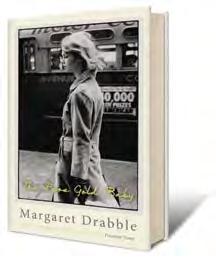
(Canongate, £16.99; ebook, £9.94)
Margaret Drabble made her name writing about highly educated young women in the north London of the early 1960s struggling to reconcile the joys and limitations of motherhood. Now, at 74, she brings us the story of Jessica Speight, a highly educated young woman in the north London of the early 1960s struggling to reconcile the joys and limitations of motherhood. At the expense of her career in anthropology, Jessica, a single mother, devotes herself to her daughter Anna, who suffers from a mental disability that leaves her childlike throughout her life.
But what gives Drabble’s return to her old themes such terrific new force is that she now applies the full power of 50 years of hindsight. Narrated in the present day by Jessica’s friend Eleanor, this strong and thoughtful novel ends up as almost a work of anthropology itself, examining the beliefs, rituals and superstitions of Sixties liberal types with an often beady eye. (“How smug we were.”) Just as powerfully, Drabble’s awareness of the movement of history means that she’s no pushover for the fashions of our own times either—whether in child-rearing or the James Walton writes and presents the BBC
Radio 4 literary quiz
The Write Stuff
?

name the author Answer on page 146
Can you guess the writer from these clues (and of course the fewer you need the better)?
1. She didn’t start writing until she was 45.
2. The three bestselling novels in Britain of 2012 were all by her.
3. Her first name is Erika.
treatment of mental disability. These, we’re made to realise, may well turn out to be passing fads too.
(Little, Brown, £12.99; ebook, £6.49)
William Brodrick’s novels featuring the crimesolving monk Father Anselm have been rightly praised for their ability to combine serious moral ideas with the kind of page-turning suspense that in 2009 earned him a Gold Dagger Award from the Crime Writers’ Association.
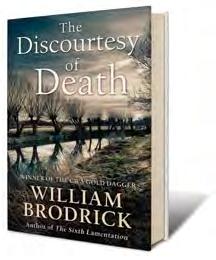
In the latest, Anselm investigates the death of Jennifer Henderson, a 31-year-old former ballerina who was already paralysed before being diagnosed with the cancer that apparently killed her. But was she the victim of a mercy-killing— and if so, who did it, did she want it, and will the truth (a quality Anselm prizes highly) help or hinder her family’s attempts to rebuild their lives?
All of this certainly gives both Anselm and Brodrick plenty to get their teeth into—but the moral thorniness doesn’t end there. Jennifer’s father seems to have been involved in the British Army’s shoot-to-kill policy in Northern Ireland, adding another ambitious layer to the question of whether it’s ever justifiable to take a life. Somehow, though, Brodrick is still able to keep his mix of intelligent debate and great storytelling utterly seamless. The result is one of the few crime novels I can think of where the ethical twists are every bit as thrilling as the narrative ones.
Desert Island Discs by Mitchell Symons (Corgi, £7.99). All the facts, and a fair bit of the gossip, from the first 70 years of a radio phenomenon.
The Outsider: a History of the Goalkeeper by Jonathan Wilson (Orion, £8.99). From Albert Camus to John Paul II, and all points in between—a superb account of the men who wear different shirts and play by different rules from everybody else.
The Silent Wife by A S A Harrison (Headline, £6.99). Dark thriller set against an uncomfortably convincing portrait of a disintegrating marriage. Possibly not one to buy your spouse for Christmas.
Pietr the Latvian by Georges Simenon (Penguin, £6.99). New translation of the first in the classic Inspector Maigret series—with Penguin promising that 74 more will follow.

Daughter of Empire by Pamela Hicks (Phoenix, £8.99).
Autobiography by Lord Mountbatten’s daughter (left), who was a bridesmaid at the Queen’s wedding, as well as being with her when she learned of her father’s death.
From the Ancient Greeks to any day now: the rise and fall of one of the most powerful ways that human beings have ever found to communicate

In the age of the email, To the Letter inevitably feels like an elegy. After all, even Postman Pat has now changed his (theme) tune: these days he merely delivers “parcels to your door”, not letters through it. According to Simon Garfield, in fact, “the last letter will appear in our lifetime”—and once it has, something “crucial to our emotional well-being” for millennia will be gone. And yet, this huge historical change is in danger of passing almost unnoticed.
If it does, that certainly won’t be Garfield’s fault—because this endlessly informative book from one of Britain’s best non-fiction writers provides a heartfelt reminder of just how much we’d lose.
In 1973, the archaeologist Robin Birley was excavating the first-century Roman site of Vindolanda, near Hadrian’s Wall, when he came across something completely unexpected: personal letters that, with a bit of restoration, could still be read. The messages they contained weren’t always earth-shattering (“I have sent you socks and two pairs of sandals”), but they remain the oldest surviving handwritten documents in Britain.
Nonetheless, even these small wooden tablets don’t come from letter-writing’s earliest days. Several centuries before, the Greeks were already corresponding in a way that still seems familiar to us: a greeting, an enquiry after the recipient’s health, some chatty news and a formulaic sign-off.
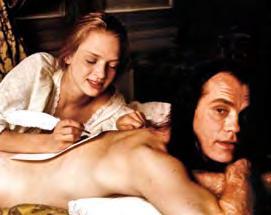 Writing back: Uma Thurman and John Malkovich in Dangerous Liaisons
Writing back: Uma Thurman and John Malkovich in Dangerous Liaisons
In his first chapter, Garfield argues that nothing makes characters from the past come alive

r D exclusive: simon
Selecting my top five letter-writers is a bit like choosing my top five records —the choice is always dependent on mood. But here goes anyway:
john keats
If you want to grasp the full flowering of genius and a man in love with the joy, beauty and tragedy of the world, you’ll find it more plainly and potently in
garfielD ’s fiv e favourite letterwriters ►
like the letters they wrote—and to prove it, the book serves up any number of vivid examples from people famous and unknown. Take, for instance, Napoleon breaking off from the conquest of Europe to rebuke Josephine for not replying to his declarations of love. (“How can you remain so long without writing to me?”)
But of course, any history of letters is also the history of how they’ve been delivered—and Garfield tackles that subject with equal flair. In Britain, we learn, Henry VIII introduced the first postal service with the additional aim (Edward Snowden take note) of allowing the state to spy on private correspondence.
By the 19th century, the system had become less sinister and more efficient—but also increasingly pricey. And because it was the recipient who paid, letter-writers had become skilled at putting pre-arranged codes on the envelope. That way, the letter (and its cost) could be refused and still pass on the sender’s message. But then came a civil servant called Rowland Hill…
Hill published a pamphlet noting these problems, but also that revenue had been falling. His suggested improvements transformed postal networks throughout the world.


Hill proposed a uniform charge of one penny per half-ounce for any letter sent within the British Isles, and that the cost should be paid in advance. But it was his second idea that guaranteed his place in history: ‘A bit of paper just large enough to bear the stamp, and covered at the back with a glutinous wash which the user might, by applying a little moisture, attach to the letter.’ And Hill envisaged another breakthrough: ‘Probably it would soon be unnecessary even to await the opening of the door, as every house might be provided with a letter box into which the Letter Carrier would drop the letters, and would pass on as fast as he could walk.’
The principal opposition came from the postmaster general, Lord Lichfield, who complained that ‘of all the wild and visionary schemes I have ever heard or read of, it is the most extravagant!’ But his was a lonely voice: the Commons voted for penny postage in July 1839, and Hill was offered a job at the Treasury.
And
But how was the new stamp to look? The basics we now To
Rowland
Hill was soon persuading sceptical householders to have rectangular panels cut into their doors
take for granted—the size, the monarch’s head, the licking—were all up for discussion.
The Treasury announced a competition, with awards of £100 and £200 for those who could not only design something attractive, but also solve the tricky issue of forgery. But none of the 2,600 entries satisfied. A Treasury committee praised the public’s ingenuity, but finally the stamp, with Queen Victoria’s head in profile, was designed by a group of professionals already known to Hill for printing bank notes.
The first Penny Blacks went on sale on Friday, May 1, 1840, and a revolution got under way. On May 22, Hill recorded, ‘The demand is enormous, the printers supply more than half a million per day, and even this is not enough.’ The advance was as significant as the birth of inter-city railways a decade before. In 1839, the number of letters carried in the UK was 75,907,572. In 1840, the number more than doubled to 168,768,344.

Penny Black (actual size): less than a square inch, yet it changed the world
Hill was soon convincing sceptical householders to have rectangular panels cut into their doors, and in London he introduced postal districts to ease sorting and delivery. By his retirement in 1864, half the world had adopted his reforms; no single person had contributed more to the global communication of ideas.
And beyond this, Hill may be credited with inventing an entirely new hobby—considered eccentric from the start. One of its first mentions was in a German magazine, which wrote that the English ‘reveal their strange character by collecting these…small square pieces of paper’. In 1842, Punch magazine noted that ‘a new mania has bitten the industriously idle ladies of England…They betray more anxiety to treasure up the Queen’s heads than Harry the Eighth did to get rid of them.’

an D the name of the author is…
E L James. (Britain’s three bestselling novels of 2012 were Fifty Shades of Grey, Fifty Shades Darker and Fifty Shades Freed.)
his letters than in his poetry.
t ed hughes
It was no accident Hughes entitled his last book of poetry (about Sylvia Plath) Birthday Letters. Hughes lived long enough to send emails, but he never did: he saw letters not just as his lifeline with the wider world, but as the finest form of communication ever invented.
artists in g eneral Manet, Magritte, Van Gogh, Picasso...
In fact, almost any painter who wrote to their friends—for the exploratory sketches they drew alongside their words (another thing email can’t really do).
a lbert einstein
As much for his humanity as for his science.
the queen mother
If only for the unpredictable sign-offs which ended her letters. One was, “Tinketytonk old fruit, and down with the Nazis.” n

Sir Ranulph Fiennes OBE is described by Guinness World Records as “the world’s greatest living explorer”. His latest book Cold: Extreme Adventure at the Lowest Temperatures on Earth (£20) is published on November 7.

My Anglican upbringing has helped me in my job, which is mainly trying to break world records before the Norwegians do. Even if you train hard, things go wrong and dealing with gangrene, crotch rot or frostbite requires mental strength. I’ve explored with all sorts of people who, like me, struggle against the wimpish inner voice saying, “You could stop now.” Those with faith, in whatever form, tend to be stronger. You can’t take anything unnecessary for survival on an expedition, not even a toothbrush, but I do carry the words “With God nothing shall be impossible” in my mind.
When I was trying to get my A levels at Eton, my wonderful English teacher David Callender gave me this autobiography of a Russian prince and soldier (pictured) and told me to précis it down to some 3,000 words. I found the process of reducing the book to only the most important points, while retaining its essence, a fascinating exercise. I often think of the lessons I learned back then, which have stood me in good stead for the 20 books I’ve written myself. Sadly I failed all my A levels…
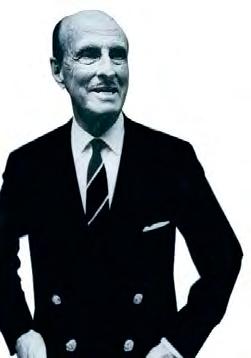
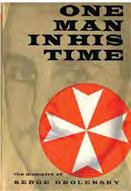

I use my edition of the Thesaurus enthusiastically at all times and it has often proved an invaluable resource. But it was never more vital than when I was writing Mind over Matter: the Epic Crossing of the Antarctic Continent. In 1992 Dr Michael Stroud and I completed the longest unsupported polar journey in history. But the entire 1,500 miles were in white—white sky, white snow. There were no animals, birds or even bacteria to break the monotony. There was no history to draw on and no weather as we know it. So writing 100,000 words for the book without being boring required me to make the most of the friction between my colleague and me—and to find a few different words for white. ■



Walk the ancient streets of these extraordinary cities: haunting, evocative, frozen in time. Expert-led holidays exploring both world-famous and hidden, lesser-known sites. An unforgettable vision of life as it was lived 2000 years ago.
Departures throughout 2013 &2014
From £1350 including ights
Privileged access to the best of the ancient world
Expert Guides | Excellent Value | Small Groups
Over 140 tours from Ice Age Art to World War II


To advertise on these pages please











They crucified the wrong man - but what about the one that got away?
The story of a lucky but unrepentant crook finding the Apostles a lot harder to impress than the Romans.
“A fascinating what ifwhy has no one written this story before?”





win £50 for every reader’s joke we publish. Email excerpts@ readersdigest.co.uk or go to facebook.com/readersdigestuk
¶ I knew a man who was obsessed with scaling buildings. He climbed all the most famous ones—the Eiffel Tower, the Empire State, the Leaning Tower of Pisa, the Taj Mahal. He was adventurous, to say the least.
He started off by using rappelling equipment, but as he progressed he climbed with nothing but the clothes on his back. He became more and more ambitious as he grew older, wanting to climb faster and to greater heights.
Finally, deciding he needed the ultimate challenge as his life drew to a close, he funded the construction of a huge skyscraper. It took ages to build, and by the time it was finished he was a very old man.
He had the top floor of the tower constructed for a special purpose—when he ascended the north face and reached that floor, his polyester suit would fasten to a contraption and fix him there, suspending him in a sky-bound mausoleum. He would remain there permanently, as a symbol of his youthful endeavours and spirit.
Anyway, that’s his storey, and he’s sticking to it. Seen on the internet

“i’ve been glamped!”
¶ An unlucky couple hire A cowboy builder to fix a leak in their roof extension. They schedule the work to start when they’re away on holiday.
The holiday isn’t a success, so they decide to return home early. To their astonishment, they find the builder reading a paper and drinking their tea in one end of their extension, and a pool of water at the other.
“What’s going on here?” they demand. “Why haven’t you fixed the roof yet?”
“I can’t,” he replies. “It’s raining and it’s too wet.”
“Then why didn’t you do it when it was dry?” they ask, incredulous.
“I couldn’t,” he says. “It wasn’t leaking then.”
Bridget Carroll, Bolton, Lancashire¶ I asked this guy, “Can you recommend some music for children’s parties?”
He said, “Small Faces?”
I said, “Of course they do, they’re kids.”
Comedian Tim Vine
¶ I was watching Peppa Pig this morning when my wife turned the TV off for no reason.
How childish is that? Seen on the internet
¶ I worked for MI6 a long time ago and I knew M’s secretary when she was plain Miss Money.
Back then, she didn’t have a penny to her name.
Benn Powell, South Walesi’ve just flown over a desert island and seen the letters SoS. i’m not sure what they’re apologising for
Comedian Milton Jones

Award-winning comedian Josh Widdicombe is 5ft 6.5in tall, and his favourite TV show is The Simpsons. Each month, he lets us know just exactly what his problem is. Bonfire night is a strange one, isn’t it? Talk about rubbing salt in the wound. Not only is Guy Fawkes put to death in the most gruesome of circumstances, but then every year for the next four centuries Britain gathers together to celebrate his demise by holding sparklers and eating toffee apples (more the toffee than the apple, if we’re honest —no one likes that bit).

Is there a reason why he’s the only terrorist who seems to have succumbed to this fate? I’m pretty sure that in 400 years’ time children won’t be gathering together to tip a large doll dressed as Osama bin Laden into the sea. (“Penny for the Osama, guv’nor?”) Most galling of all for Guy must be that he didn’t even succeed, and will always be remembered merely for a plot. We defeated you, Guy, and now you’re never going to hear the end of it.
And it may all seem very grim, but remember this is something we bring up with young children every year before we light a Catherine wheel and run for cover. Can’t we just move on and forget about it? The only thing worse than a bad loser is a bad winner—and that’s what we’re acting like.

As if to demonstrate that life can’t be crash, bang, wallop all the time, #MyLifeIsAverage celebrates those ordinary, everyday moments—in oddly endearing fashion:
n “I bought a new student ID today because I lost mine. I just got an email saying it was found and I can pick it up.”
n “Instead of going back to sleep, I decided to walk my puppy.”
n “So far my morning has consisted of dancing to a 90s dance-hits playlist and sorting through clothes to donate.”
n “I was bored in the shower, so I mixed shampoos until they matched the colour of my bedroom walls.”
n “My sister just caught the drummer from Bastille’s stick at Glastonbury.”
n “Plan for the afternoon: run and do homework. What I’ve actually done: sleep and eat cake.”
n “Parents gone for the weekend. Watching Netflix.”
n “I just broke a plastic fork while eating lunch.”

“i told you—the local cats treat our garden like a toilet”
don’T judge a book by iTs cover? Sometimes, as in the case of these self-published tomes seen at huffingtonpost.com, it’s fully justified.

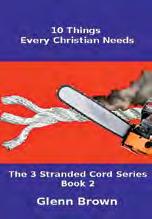


¶ A logician’s wife is having a baby. She gives birth and the midwife hands the baby to him.
“Is it a boy or a girl?” his wife asks.
“Yes,” he replies. Seen on Reddit
¶ Does anyone know a way of turning off that annoying seatbelt warning? Other than putting on your seat belt?
Comedian Jack Dee
¶ A man is up in court on a drinking charge. The judge, looking very weary, starts lecturing him: “You’ve been appearing before me constantly for the past 20 years…”
“That’s correct, your honour,” the man interrupts, “but I can’t help it if you don’t get promoted.”
Grahame Jones, London
¶ I spent £96 on eBay yesterday to buy a cheese grater that was once owned by Adolf Hitler and Saddam Hussein.
It was the grater of two evils.
Seen on the internet
ladies and gentlemen, please welcome paul charlton
favouriTe one-liner?
Last night I was lying in bed, looking at the stars, and I thought to myself, Where the heck is the ceiling?
whaT’s The besT parT of your rouTine?

paul charlton is the star and co-writer of The Ginge, the Geordie and the Geek, currently on bbc2 every Sunday at 9pm
A favourite sketch of ours [The Ginge, the Geordie and the Geek] is about a scarecrow who’s in love with a crow. The crow is trying to make him see that they should be together and he’s denying it. When the farmer comes out and sees them, havoc ensues!
whaT’s your besT heckler experience?
When we supported Johnny Vegas in Nottingham, there was a really loud guy in the audience. When Johnny came on, he grabbed a curtain from backstage and put it over his head, saying he wasn’t allowed to take it off until the gig was over.
favouriTe Tv show?
We admire Mrs Brown’s Boys. It might not be everyone’s cup of tea, but it gets slammed because it’s populist—comedy in general can be quite elitist.

funniesT Thing ThaT’s ever happened To you?
I remember a huge stag party at one of our gigs. They’d been told the venue served food and started kicking off when they couldn’t get any. The management agreed to let them order pizza, and this delivery guy arrived halfway through our act. He was trying to keep quiet, but the main guy was shouting out, “Right, whose is the pepperoni? Whose is the ham and cheese?”
finally, who’s your comedy inspiraTion?
I’m a big fan of Michael Palin. As an up-and-coming comedian, I found his diaries very helpful—he seems like a lovely man in terms of his behaviour and values. n
We’ve got even more pen-chewingly fiendish puzzles for you this month, so pour yourself an extra-large cup of tea and get stuck in!
matchstick maths
Move just one stick to make this matchstick equation correct.
overlapping shapes
How many circles do you see?

sudoku To win, you have to put a number from 1 to 9 in each outlined section so that: • every horizontal row and vertical column contains all nine numerals (1–9) without repeating any of them • each of the outlined sections has all nine numerals, none repeated. If you want even more of a challenge, try timing yourself too.
difficulty HHH
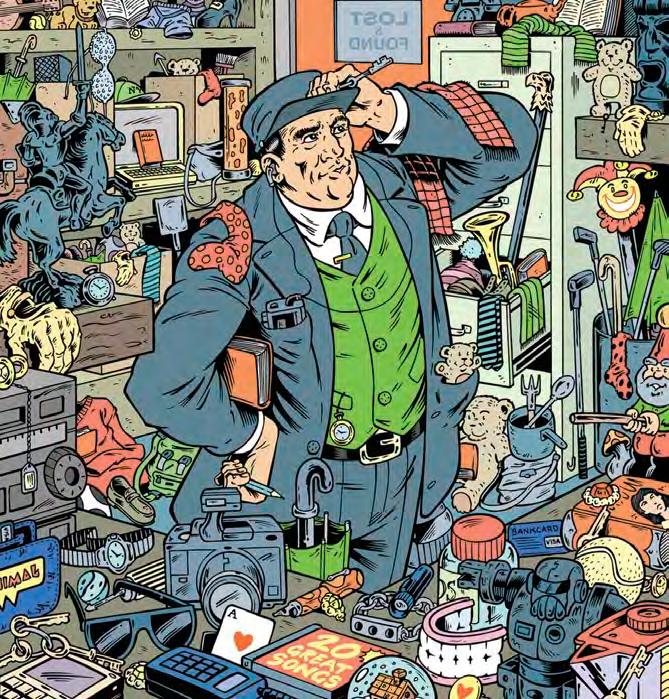
lost and found It’s time for the annual audit of the lost-and-found office—and as you can see, it’s rather messy. How many of these questions can you answer correctly in ten minutes to help the job go a bit quicker?
1. How many scarves can you see in the office?
2. What’s sitting on top of the computer keyboard?
3. How many timepieces can you locate?
4. How many umbrellas are facing point downwards?
5. There are two abandoned walking sticks. One has the head of a creature on the top. Name it.
6. How many keys can you find? Add that to the number of balls.
7. Other than the gnome’s fishing rod, what other item might help you catch a fish?
8. What’s the colour of the lost teapot?
9. The phones are ringing— but how many are there?
10. How many items of underwear can you spot? ►
concise crossWord
This simple crossword shouldn’t take you long to complete. When you’ve finished, the highlighted letters contain an anagram of a wellknown actor.
Where are you @?
Can you work out which of the symbols below slots snugly into the bottom right-hand position?
Three identical dice are piled on top of each other as shown. Seven faces are visible. What’s the total of the other 11 sides?
a a b b c c d d


Joust about
Your task is to deduce which of the four options given completes the set.
1. These three drawings are views of the same cube. What colour is the side opposite the red side?
2. These three drawings are views of the same cube. What colour is the side opposite the yellowand-green side?


ubes:c 1. Yellow 2. Orange and green.
Joust about: A.
the opposite sides always total 7. Since we can see 27 spots, there must be 63–27=36 hidden).
pu for the t:coun 36 (each die has 21 spots—
each row has two matching shapes in different positions and colours.
Where are you @?: C is the missing figure as
(top left) 8. Orange 9. 2 10. 2 (top left).
ostl and found: 1. 4 2. A book 3. 3 4. 3 5. An eagle 6. 13 (7 keys and 6 balls) 7. The spear
udoku:s If ouy solved it within: 15 minutes, you’re a true expert; 30 minutes, you’re no slouch either; 60 minutes or more, maybe numbers aren’t your thing.

verlappingo shapes: There are 26 circles.




£50 prize question (answer will be published in the december issue)
how many forks are needed to balance scale c?
π (Pi) = 22 / 7 a c b
atchstickm maths:
The first correct answer we pick on November 1 wins £50!*
Email excerpts@readersdigest.co.uk
answer to october’s prize question:
one solution is: 23
and the £50 goes to… Caroline Dodd from Nantwich
* Entry is open only to residents of the UK, Channel Islands, Isle of Man and Republic of Ireland aged 18 or over. It is not open to employees of Vivat Direct Limited (t/a Reader’s Digest), its subsidiary companies and all other persons associated with the competition.
•

Can’t quite hear your wife or husband, the TV, colleagues at work, or the loving words of your grandchildren?
Then these spectacle hearing aids could be the answer if you have a hearing problem.
Stylish frames that cleverly contain and disguise a digital hearing aid in the spectacle arms slip easily into your pocket, purse or handbag. They are a remarkable invention that overcomes two problems at once.
While most people are not bothered by wearing glasses, the same cannot be said for
wearing a hearing aid. These specs are brilliant because you wouldn’t think they are a hearing aid.
Some people can find it uncomfortable and unnatural to have a hearing aid in their ear but that’s not a problem with these as there’s nothing in the ear to irritate you.
So if you want to have clear vision and quickly improve your hearing, apply now for a free information pack by sending the freepost coupon or by calling the number below.

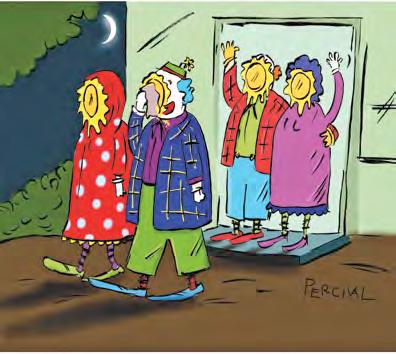
Think of a witty caption for this picture and you could beat the experts at their own game. The three best suggestions will be posted on our website in mid-November alongside an anonymous caption from our professional cartoonist. Visitors can choose their favourite—and if your entry gets the most votes, you’ll receive £100 and a framed copy of the drawing. Submit to captions@readersdigest.co.uk or the address on p4 by November 8. Enter and vote online at readersdigest.co.uk/caption. We’ll announce the winner in our January issue. n
it’s christmas!... In next month’s issue w I n £100 and a Cartoon pr I nt

The fightback starts here! In a very tight contest, cartoonist Steve Way managed to sneak enough votes for his caption, “I feel inspired—bring me my bicycle…”, to be declared this month’s winner. It’s a moment of celebration for the pros, but surely only a temporary setback for our readers.
scoreboard readers 15 cartoonists 6

we shoot the breeze with ray winstone sample some of the best christmas spirits b ritain has to offer meet three people who will be having a very different christmas



















Building on over 30 years of innovation and research, the Bose ® Wave ® music system III delivers award-winning, room-filling quality sound, yet this compact, all-in-one system takes up less space than a single conventional speaker. The Wave ® music system III reproduces music with the most accuracy we’ve ever produced in a system this small. You’ll hear details you’ve never noticed in songs you know by heart, delivering room-filling sound with depth and definition.
The system’s front-loading CD player and digital DAB/FM/AM tuner offer you two ways to experience your favourite music, while the digital display shows track information as you listen. Touch-top controls turn the system on, off and snooze the alarm, and the slim, credit-card sized remote offers one touch control of all the system’s functions. The Wave ® music system III also features dual alarms for two different wake-up times making it one of the most convenient devices you can own.
Music from your iPod, iPhone*, computer or tablet.
Available accessories bring music from your iPhone or iPod*, or wirelessly from your tablet, computer or other Bluetooth® device. And being compact, the Wave ® music system III fits neatly just about anywhere – so you can enjoy all kinds of music in all kinds of places.
Hear it for yourself, risk-free.
We believe the best way for you to appreciate the Wave ® music system III is to experience it in your own home. So call now and listen for 30 days without risk or obligation.
✓ 30 day risk-free home trial, with no obligation
✓ Easy payment options - 0% interest charges from Bose**
✓ FREE shipping to your home
✓ Not delighted? FREE return shipping
*Dock not compatible with iPhone 5 and iPod shuffle.**Payment plan is available on credit/debit cards only and is subject to status. An initial deposit is due at the time of order and all payments will be charged to your credit/debit card. If the product is returned, the deposit is fully refundable. ere will be no interest charges from Bose. In the event of late payment, credit/debit card company interest charges may apply. Deliveryis subject to product availability, clearance of payment and security checks and can be up to 10 days from when Bose receives the order. Price/Payment plan / Offer subject to change without notice. Free shipping offer applies to UK standard delivery only. Risk free refers to 30-day home trial only. ©Bose Corporation 2013. All rights reserved. e Wave ® music system’s distinctive design is a registered trademark of the Bose Corporation in the U.S. and other countries. e Bluetooth® word mark is a registered trademark owned by Bluetooth SIG, Inc., and any such use by Bose Corporation is under license. iPod and iPhone are registered trademarks of